
|
TORAH PORTIONS
xlsb
B'SHALAKH (In Sending Away)
Exodus 13:17-17:16
There are 60 Aleph-Tavs in this week's Torah portion
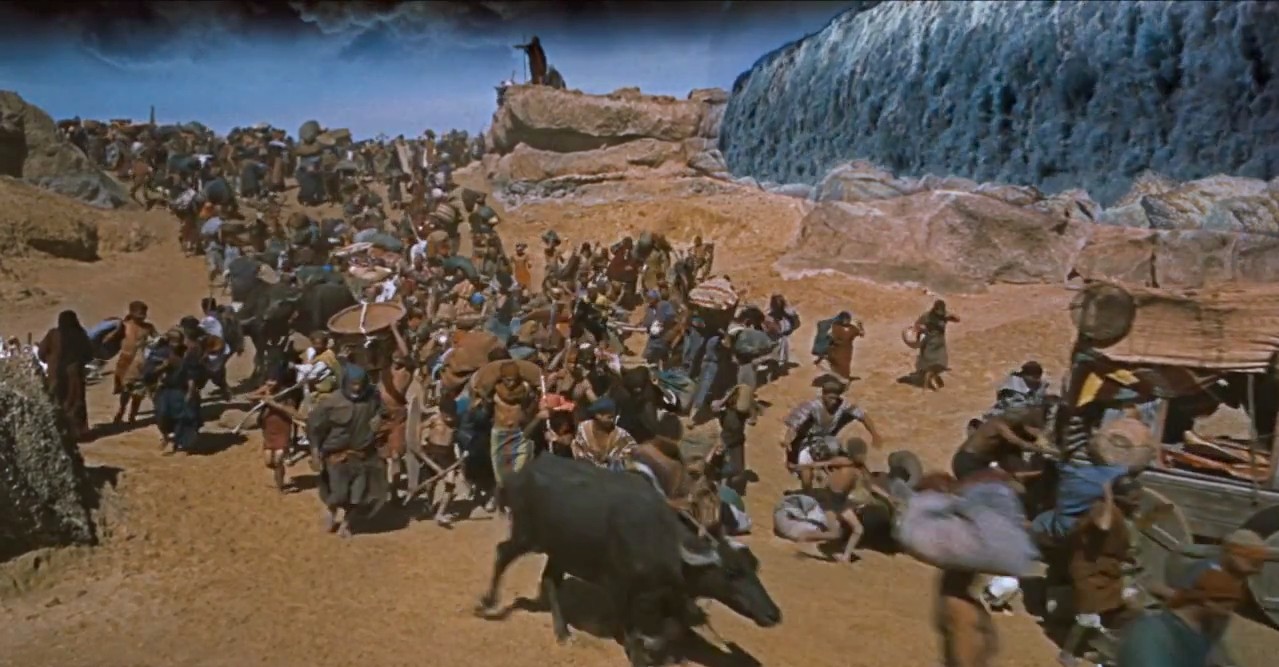
Note: you will need the oldheb.ttf (old Hebrew) and the SGreek Mediuim fonts to see the Hebrew and Greek text, as well as the three English fonts: Cooper Black, Impact and Frontlight MT Light. Right click the links and choose "Save Target As". Then go to the file, and either right click them and choose "install", or drag them into the font page.
oldheb.ttf
SGreek Medium
Cooper Black
Impact
Frontlight MT Light
NOTE: All of the yous and yours underlined as "you" and "your" indicates that the you and the your are plural. Also any of the words that are in bold pink lettering as "you" refers to the feminine gender, but it is only applied when it does not commonly refer to a woman. This only is applied to this week's Torah portion text at this time.
CHAPTER 13
Exodus 13:17-22
Exo 13:17 And was, in Pharaoh sending away ta-the People, and Elohim did not lead them at the way of the land of the Philistim, for he was near; for Elohim said, Lest (Facing) the People repent [(be sorry)] in their seeing war and they return to Egypt: 18 And Elohim circumvented (turned) ta-the People the way at the wilderness of Yam Suph [(the Sea of Reeds, the Red Sea)]: And the stouted (staunched) [(And the fifth ranked (harnessed, bodied))] Sons of Israel, they ascended from the land of Egypt. 19 And Moses took ta-the bones of Joseph with him: for that swearing, swore ta-the Sons of Israel, to say, Elohim, visiting, will visit you; and you shall ascend ta-my bones from this (here) with you. 20 And they pulled up (journeyed) from Succoth, and they camped in Etham in the edge of the wilderness. 21 And hwhy was going to their faces daily in the Pillar of a Cloud to lead them at the way; and nightly in the Pillar of Fire to have light for them [(to give light to them, to be a light for them)]; to go daily and the nightly: 22 The Pillar of the Cloud did not withdrew daily, and the Pillar of Fire nighty to the face of the People.
(NOTE: Not all verses will have comments)
Verses seventeen and eighteen
17 And was, in Pharaoh sending away ta-the People, and Elohim did not lead them at the way of the land of the Philistim, for he was near; for Elohim said, Lest (Facing) the People repent [(be sorry)] in their seeing war and they return to Egypt: 18 And Elohim circumvented (turned) ta-the People the way at the wilderness of Yam Suph [(the Sea of Reeds, the Red Sea)]: And the stouted (staunched) [(And the fifth ranked (harnessed, bodied))] Sons of Israel, they ascended from the land of Egypt.
Question: "Where is the Sea of Reeds"? Based on information, the Reeds Sea is the whole body of water from Egypt and Saudi Arabia to Ethiopia. In Biblical times, they most likely called that whole body of water Yam Suph.
This is a map of the Red Sea
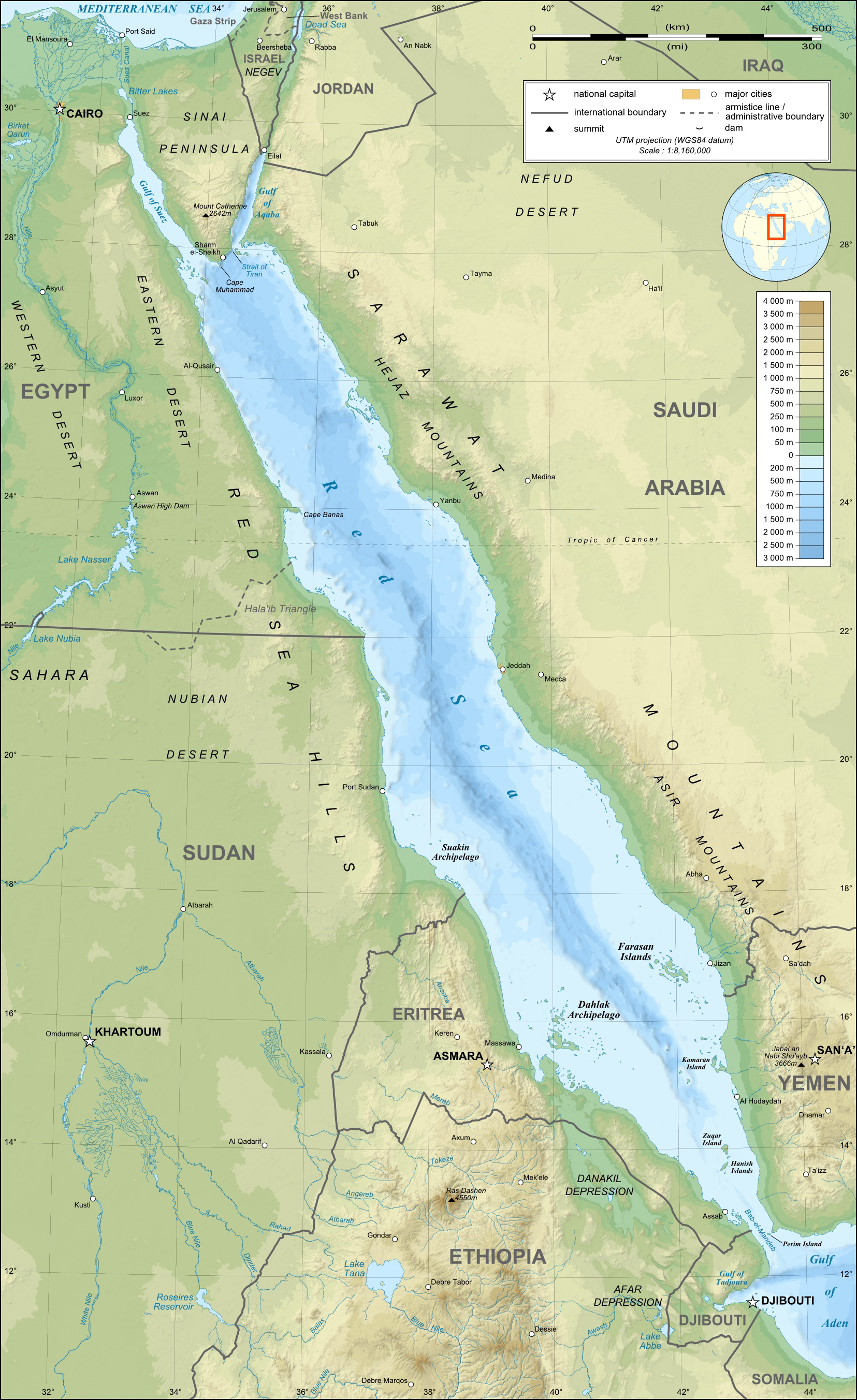
When the Israelites went from Succoth to Etham along the Reeds Sea, they most likely traveled "southward". I will explain later in this week's Torah portion.
I heard instructors say regarding verse seventeen that the sons of Ephraim and Menasseh went to war with Egypt and lost the battle. There is an article by Nissan Mendel on the Ask Moses website, titled "The Warriors of Ephraim". It shows their view in defending their premise. You can access the link of it by clicking here. Though they say this is the reason hwhy didn't let them go through that route, In my humble but strong opinoin, that is not the reason they didn't go that route. If one recalls the process, hwhy just set them free from slavery, but He did not make the Marriage Contract with them before arriving at Mount Sinai. If they went that route along the coast and saw the fighting, they would have had the right to return to Egypt of their own accord without hwhy having a chance to make that Marriage Contract with them. They would be like a Bride without a Bridegroom.
Michael Rood of A Rood Awakening noted the best reason that hwhy said to not to go the way of the Philistines. He noted at this genealogy, which is noted in the Torah portion of Noakh, in the book of Genesis
Genesis 10:6 And the sons of Ham; Cush, and Mizraim, and Phut, and Canaan.... 13 And Mizraim birthed ta-Ludim, and ta-Anamim, and ta-Lehabim, and ta-Naphtuhim, 14 And ta-Pathrusim, and ta-Casluhim, whom Philistim came out from there, and ta-Caphtorim.
The Philistines were descendants of Casluhim, son of Mizraim, and Mizraim was the ancestor of the Egyptians. The Philistines were relatives to the Egyptians by being descendants of the Philistim, grandson of Mizraim. These two family members most likely had a relation alliance between each other. Based on what Michael Rood noted, there was no doubt that Egypt's Philistine relatives heard that the Israelites defeated Egypt, and the Israelites. If the Israelites were coming toward their direction, the Philistines would revenge their Egyptian brothers and fight against Israel, because they attacked their family members. That is why hwhy did not want them to travel the route toward the Philistines, and to me, this is the best explanation. Thank you Michael Rood.
Looking at the word ARMED
The Hebrew word for armed is "khah-moosh"- Khet, Mem, Shin (smx). It is from Strong's Concordance number 2571, and its definition
Passive participle of the same as H2570; staunch, that is, able bodied soldiers: - armed (men), harnessed.
from 2570 "khoh-mesh" (smx), and its definition
From an unused root probably meaning to be stout; the abdomen (as obese): - fifth [rib].
Bill Cloud of Shoreshim Ministries and Jacob's Tent noted that this Hebrew word is based on the number "five", and according to Bill, the Israelites were leaving in "fives" like an army leaving out in ranks of five.
Another thing that Bill Cloud noted is the Hebrew word for wilderness is "meed-bahr", Bet, Mem, Dalet, Resh (rbdm). Bill said that it can also be pronounced "m'dah-beyr" meaning "to speak". One can say that everytime the Israelites go into a wilderness area, depending on the name, like Wilderness of Sin, they could be going to a speaking of "Sin", which I will explain the definition later in this week's Torah portion.
Thank you, Bill.
Verse nineteen
19 And Moses took ta-the bones of Joseph with him: for that swearing, swore ta-the Sons of Israel, to say, Elohim, visiting, will visit you; and you shall ascend ta-my bones from this (here) with you.
Configuring the time line based on the chart I posted, the time line difference between the year of the death of Joseph and the year Moses took the Israelites out of Egypt was "144 years". It's like saying twelve times twelve (12 x 12) years before hwhy brought the Israelites and Joseph's bones via Moses out of Egypt. As Rico Cortes of Wisdom In Torah Ministries says "Koinkidinkee? I don't think so".
This is what Joseph said regarding his body, which is noted in the Torah portion of Va-Y'khi, in the book of Genesis
Genesis 50:25 And Joseph swore ta-the Sons of Israel, to say, Elohim, visiting, will visit you, and you shall ascend ta-my bones from this (here).
Joseph's body was the only original twelve brothers that was returned to the land of Israel. This is the account, which is noted in the book of Joshua
Joshua 24:32 And ta-the bones of Joseph, which the Sons of Israel brought up out of Egypt, buried they in Shechem, in a parcel of ground which Jacob bought from ta the sons of Hamor, the father of Shechem, for an hundred pieces of silver: and it became the inheritance of the sons of Joseph.
Joseph's tomb is located in the land of Shechem, which is today Nablus.
This is a map of the area by John Mills in 1864 where Joseph's tomb is located
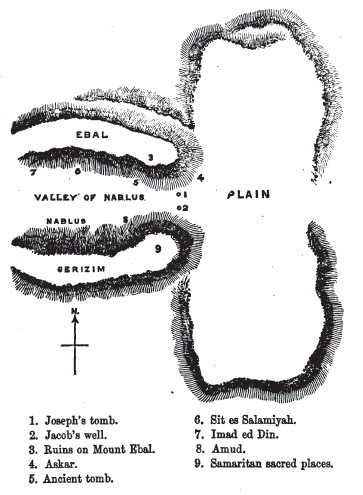
Notice also that it is located close to Jacob's well, where Yeshua met the Samaritan woman, which is noted in the Gospel of John
John 4:3 He left Judaea, and departed again into Galilee. 4 And He must needs go through Samaria. 5 Then cometh He to a city of Samaria, which is called Sychar [Shechem], near to the parcel of ground that Jacob gave to his son, Joseph. 6 Now Jacob's Well was there. Yeshua therefore, being wearied with His journey, sat thus on the well: and it was about the sixth hour. 7 There cometh a woman of Samaria to draw water: Yeshua saith unto her, Give Me to drink. 8 (For His disciples were gone away unto the city to buy meat.) 9 Then saith the woman of Samaria unto Him, How is it that Thou, being a Jew, askest drink of me, which am a woman of Samaria? For the Jews have no dealings with the Samaritans. 10 Yeshua answered and said unto her, If thou knewest the Gift of hwhy, and who It is that saith to thee, Give Me to drink; thou wouldest have asked of Him, and He would have given thee Living Water. 11 The woman saith unto Him, Sir, Thou hast nothing to draw with, and the well is deep: from whence then hast Thou that Living Water? 12 Art Thou greater than our father, Jacob, which gave us the well, and drank thereof himself, and his children, and his cattle? 13 Yeshua answered and said unto her, Whosoever drinketh of this water shall thirst again: 14 But whosoever drinketh of the Water that I shall give him shall never thirst; but the Water that I shall give him shall be in him a Well of Water springing up into Everlasting Life. 15 The woman saith unto him, Sir, give me this water, that I thirst not, neither come hither to draw. 16 Yeshua saith unto her, Go, call thy husband, and come hither. 17 The woman answered and said, I have no husband. Yeshua said unto her, Thou hast well said, I have no husband: 18 For thou hast had five husbands; and he whom thou now hast is not thy husband: in that saidst thou truly. 19 The woman saith unto Him, Sir, I perceive that Thou art a Prophet. 20 Our fathers worshipped in this mountain; and ye say, that in Jerusalem is the place where men ought to worship. 21 Yeshua saith unto her, Woman, believe Me, the hour cometh, when ye shall neither in this mountain, nor yet at Jerusalem, worship the Father. 22 Ye worship ye know not what: we know what we worship: for Salvation is of the Jews. 23 But the hour cometh, and now is, when the true worshippers shall worship the Father in Spirit and in Truth: for the Father seeketh such to worship Him. 24 hwhy is a Spirit: and they that worship Him must worship Him in Spirit and in Truth. 25 The woman saith unto Him, I know that Messias cometh, who is called Anointed: when He is come, He will tell us all things. 26 Yeshua saith unto her, I that speak unto thee am He.
Looking in the context of the location of Jacob's well, it is interesting that Yeshua was located near Joseph's tomb. Question: "Did Yeshua stop by that tomb to pay homage to Joseph"? It was also very observing that Yeshua stopped at Shechem, the very location where Joseph's tomb, Jacob's Well, and some of the descendants of Joseph were located, and the fact that Jacob gave Joseph this plot of land, which is noted in the Torah portion of Va-Y'khi, in the book of Genesis
Genesis 48:21 And Israel said to Joseph, Behold, I am dying: And Elohim will be with you, and you will be returned to the land of your fathers. 22 And I, I will give to you one shoulder [Shechem (meaning shoulder)] upon your brothers which I took from the hand of the Amorite on my sword and on my bow.
This account and the location of this account shows us that Yeshua was after the Northern House of Ephraim, who is of the Northern House of the lost Ten Northern Tribes of Israel.
Also, based on the map above, one could see that it looks like a natural "entrance gate". This is the location where Abraham could have passed through with Sarah and their people first, then followed by Jacob and his household, and then Joshua and the Israelites came through. Just a speculation.
This image of Shechem, today Nablus, taken circa 1900, looking from Mount Ebal, the yellow circle is where Joseph's tomb is located
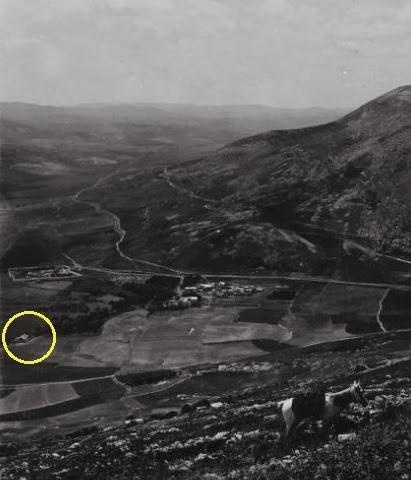
These are other maps of the location of Joseph's tomb in Shechem/Nablus
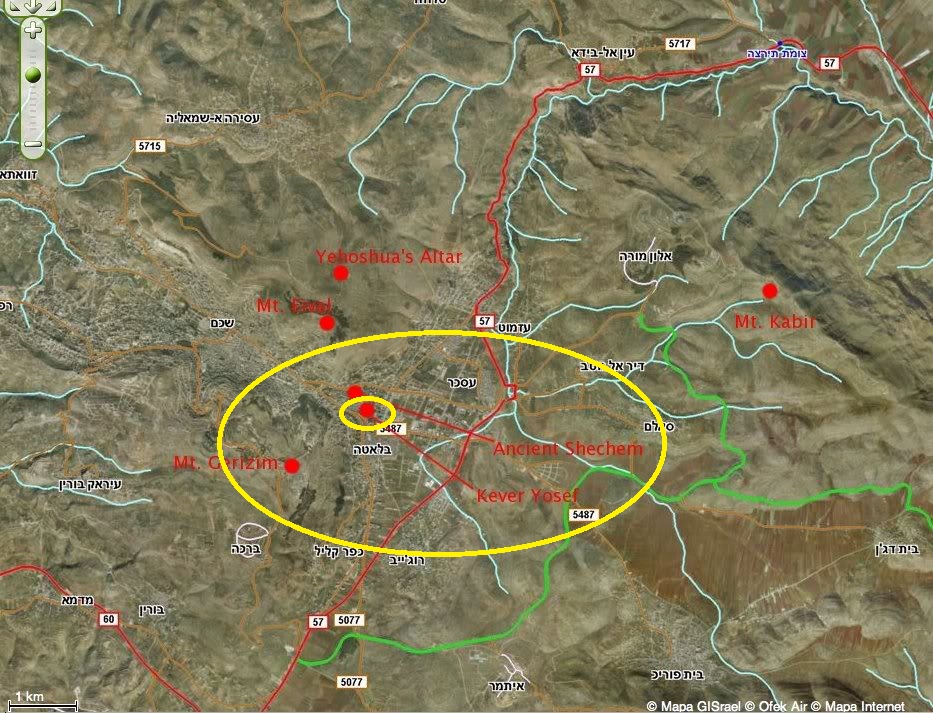
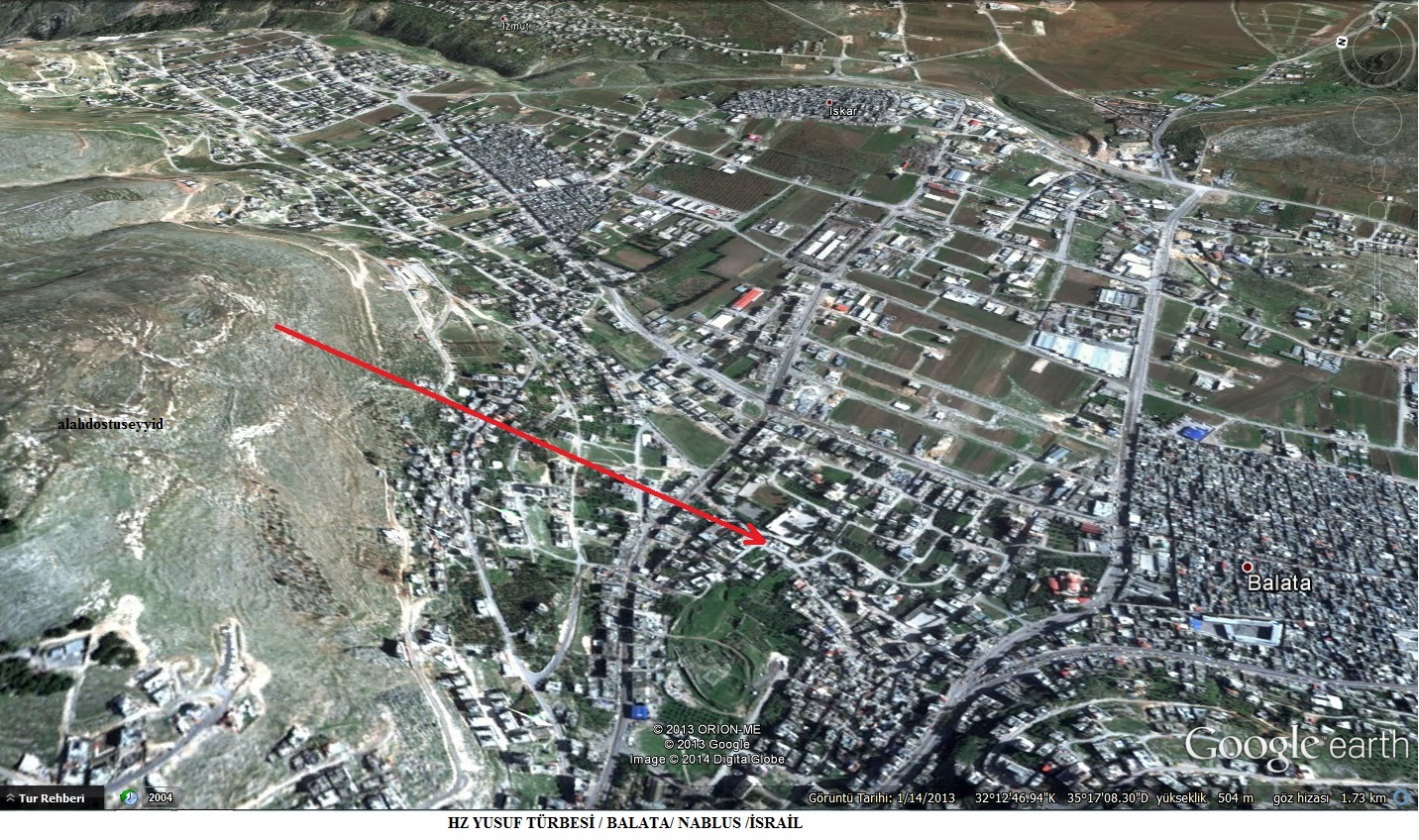
Verse twenty
20 And they pulled up (journeyed) from Succoth, and they camped in Etham in the edge of the wilderness.
Looking at the word ETHAM
The Hebrew word for Etham is "Ey-thahm"- Aleph, Tav, Mem (Mta). It is from Strong's Concordance number 864, and its definition
Of Egyptian derivation; Etham, a place in the Desert: - Etham.
After researching, the best possible source that this word came from, is "ah-thah"- Aleph, Tav, Heh (hta). It is from Strong's Concordance number 858, and its definition
(Chaldee); corresponding to H857: - (be-) come, bring.
from 857 "ah-thah" (hta), and its definition
A primitive root (collateral to H225 contracted); to arrive: - (be-, things to) come (upon), bring.
It could also be the plural of S854 "eyth" (ta), and its definition
Probably from H579; properly nearness (used only as a preposition or adverb), near; hence generally with, by, at, among, etc.: - against, among, before, by, for, from, in (-to), (out) of, with. Often with another preposition prefixed.
from 579 "ah-nah" (hna), and its definition
A primitive root (perhaps rather identical with H578 through the idea of contraction in anguish); to approach; hence to meet in various senses: - befall, deliver, happen, seek a quarrel.
from 578 "ah-nah" (hna), and its definition
A primitive root; to groan: - lament, mourn.
Etham means "arrive", and it could also mean "nearness".
Also, the letters of the Hebrew word Etham in the Paleo-Hebrew lettering could mean "the strength of the cross flowing with life".
This could also be a place where hwhy wanted His People to be "drawn near" to Him. Our Heavenly Father wants us to do the same thing by drawing ourselves near to Him and Yeshua. This is what Yeshua said to His disciples, which is noted in the Gospel of John
John 12:31 Now is the judgment of this world: now shall the prince of this world be cast out. 32 And I, if I be lifted up from the earth, will draw all men unto Me.
Verses twenty-one and twenty two
21 And hwhy was going to their faces daily in the Pillar of a Cloud to lead them at the way; and nightly in the Pillar of Fire to have light for them [(to give light to them, to be a light for them)]; to go daily and the nightly: 22 The Pillar of the Cloud did not withdrew daily, and the Pillar of Fire nighty to the face of the People.
This is related to what Moses said, which is noted in the Torah portion of Vay-Yeyleykh, in the book of Deuteronomy
Deuteronomy 31:8 and hwhy, He is the One going to your face; He will be with you, will not fail you, and will not forsake you: do you not fear, and do you not be dismayed.
CHAPTER 14
Exodus 14:1-31
Exo 14:1 And hwhy spoke to Moses, to say, 2 Speak to the Sons of Israel, and they will return, and they will camp to the face of Pi Hahiroth, between Migdol and between the sea, to face (by facing) Baal Zephon; you shall camp forward (opposite) upon (over) the sea. 3 And Pharaoh will say to the Sons of Israel, They are entangled (perplexed) in the land. The wilderness has shut up upon them. 4 And I will strengthen ta-the heart of Pharaoh and will pursue (chase) after them; and I will be glorified (honored) among Pharaoh, and among all of his force (valiant ones); and Egypt, they shall know for I am hwhy. And they did so.
5 And was told (declared) to the king of Egypt for the People had bolted away (ran away): and the heart of Pharaoh and of his servants had changed to the People, and they said, What is this we have done?! For we have sent away ta-Israel from serving us! 6 And ta-his chariot was [(chariots were)] prepared, and took ta-his people with him: 7 And he took six hundred chosen chariots, and all of the chariots of Egypt, and three rankers (third rankers) over (upon) all of him. 8 And hwhy strengthened ta-the heart of Pharaoh, King of Egypt, and pursued (chased) after the Sons of Israel: And the Sons of Israel had gone out on a Raised Hand [(High Hand)]. 9 And Egypt, they pursued (chased) after them, and all of the horses, chariots of Pharaoh, and his horsemen (hoofmen), and his force (valiant ones), they overtook them camping upon the sea, upon Pi Hahiroth, to the face of Baal Zephon.
10 And Pharaoh drew near, and the Sons of Israel, they lifted up ta-their eyes, and behold, Egypt was marching (journeying) after them; and they feared much: and the Sons of Israel, they tsah-ahk shrieked (tsah-ahk-cried) to hwhy. 11 And they said to Moses, That with failing were no graves were in Egypt to have us take taken to the death in the wilderness? What is this you have done to us to bring us out [(by bringing us out)] from Egypt?! 12 Is that not this [(Is this not that)] the word which we spoke to you in Egypt, to say, Leave (Lack away) from us, and we will serve ta-Egypt (the Egyptians)? For is good (better) for us serving ta-Egypt than us dying in the wilderness. 13 And Moses said unto the People, Do you not fear. Stand and see ta-the Salvation of hwhy which He will do for you today (the day): for which you see ta-Egypt today, you shall not add (again) at seeing them [(see them again)] any more unto ages. 14 hwhy shall war for you, and you, you be silent.
15 And hwhy said to Moses, What is your tsah-ahk- shriek (tsah-ahk-cry) to Me? Speak to the Sons of Israel, and they shall pull up (journey): 16 And you, raise your ta-staff (rod, branch), and stretch out (stretch forth) ta-your hand over (upon) the sea, and they will break apart (rip apart, zip open): And the Sons of Israel, they will go in the midst of the sea, on dry ground. 17 And behold I, I am with strengthening ta-the heart of Egypt, and they will go after them: And I will be glorified (honored) among Pharaoh, and among all of his force (valiant ones), among his chariots, and among his horsemen (hoofmen). 18 And Egypt, they shall know for I am hwhy in My being glorified (honored) among Pharaoh, among his chariots, and among his horsemen (hoofmen).
19 And the Messenger of The Elohim that is going to the face of the Camp of Israel pulled up (journeyed), and went from behind them; And the Pillar of the Cloud pulled up (journeyed) from their faces and stood from behind them: 20 And came between the camp of Egypt and between the Camp of Israel; and was the Cloud and the darkness, and lighted ta-the night: And did not come near, this one to this one all of the night.
21 And Moses stretched out (stretched forth) ta-his hand over (upon) the sea; and hwhy made go (depart, walked away) ta-the sea on a fierce (harsh, ?strong?) east wind all of the night, and did (made) ta-the sea to dry ground, and the waters, they broke apart (ripped apart, zipped open).
22 And the Sons of Israel, they came to the midst of the sea on the dry ground: and the waters to them had a wall from their right and from their small (left). 23 And Egypt, they pursued (chased), and they came after them to the midst of the sea, all of the horses of Pharaoh, his chariots, and his horsemen (hoofmen).
24 And was, in the breaking period (morning) guard (keeping, observance, heeding), hwhy leaned out (peeped, gazed) to the camp of Egypt in the Pillar of Fire and of the Cloud, and confused (disturbed, discomfited, commotioned) ta the camp of Egypt, 25 And removed ta the revolving item (ohphan-wheel) from their chariots, and they drove in heaviness (difficulty): and Egypt said, I will flee from the face of Israel; for hwhy is warring for them against Egypt.
26 And hwhy said to Moses, Stretch out (Stretch forth) ta-your hand over (upon) the sea, and the waters, they will return upon (over) Egypt, over (upon) his chariots, and over (upon) his horsemen (hoofmen). 27 And Moses stretched out (stretched forth) ta-his hand over (upon) the sea, and the sea returned to his permanence (toughness, roughness) to the face of breaking period (morning); and ta-Egypt fled to meet (encounter) him; and hwhy overthrew (shook off) ta-Egypt in the midst of the sea. 28 And the waters, they returned, and they covered (concealed) ta-the chariots, and ta-the horsemen (hoofmen), to all of the force (valiant ones) of Pharaoh that were coming in the sea after them; Was not sha-ahr-remained among them unto one. 29 And the Sons of Israel, they walked on dry ground in the midst of the sea; and the waters were a wall to them from their right and from their small (left). 30 And hwhy saved ta-Israel in that day from the hand of Egypt; and Israel saw ta-Egypt was dead upon the lip of the sea. 31 And Israel saw ta-the Great Hand which hwhy did (worked) against Egypt: and the People, they revered (awed, feared) hwhy, and they believed in hwhy and in Moses, His servant.
(NOTE: Not all verses will have comments)
Verse one through four
1 And hwhy spoke to Moses, to say, 2 Speak to the Sons of Israel, and they will return, and they will camp by the face of Pi Hahiroth, between Migdol and between the sea; you shall camp upon (over) the sea by facing opposite of Baal Zephon. 3 And Pharaoh will say of the Sons of Israel, They are entangled in the land. The wilderness has shut up upon them. 4 And I will strengthen ta-the heart of Pharaoh and will pursue (chase) after them; and I will be glorified (honored) on Pharaoh, and on all of his force (valiant ones); and Egypt, they may know that I am hwhy. And they did so.
One point I want to make is this: These locations mentioned so far are all territories occupied by Egypt. If they were not part of Egypt, the Egyptians would not have been able to pursue after them unless confronted by an opposing army of another nation defending their borders.
Looking at the account of Moses leaving Egypt into the land of Midian, which is noted in the Torah portion Sh'moth, in the book of Exodus
Exodus 2:15 ...And Moses fled from the face of Pharaoh, and dwelled in the land of Midian: and dwelled by the well.
This well is the well of Jethro which was in the land of Midian where Moses dwelled for forty years before returning to Egypt.
This is a map showing the location of the traditional Mount Sinai lcoated in the Sinai Peninsula in modern Egypt, circled in red
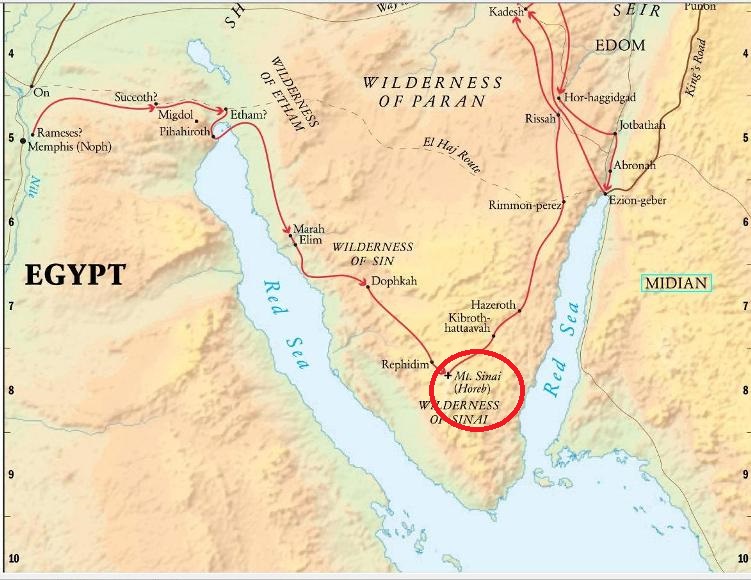
This is a map of the ancient Egyptian empire before 1400 BC, which shows the empire shaded in pink
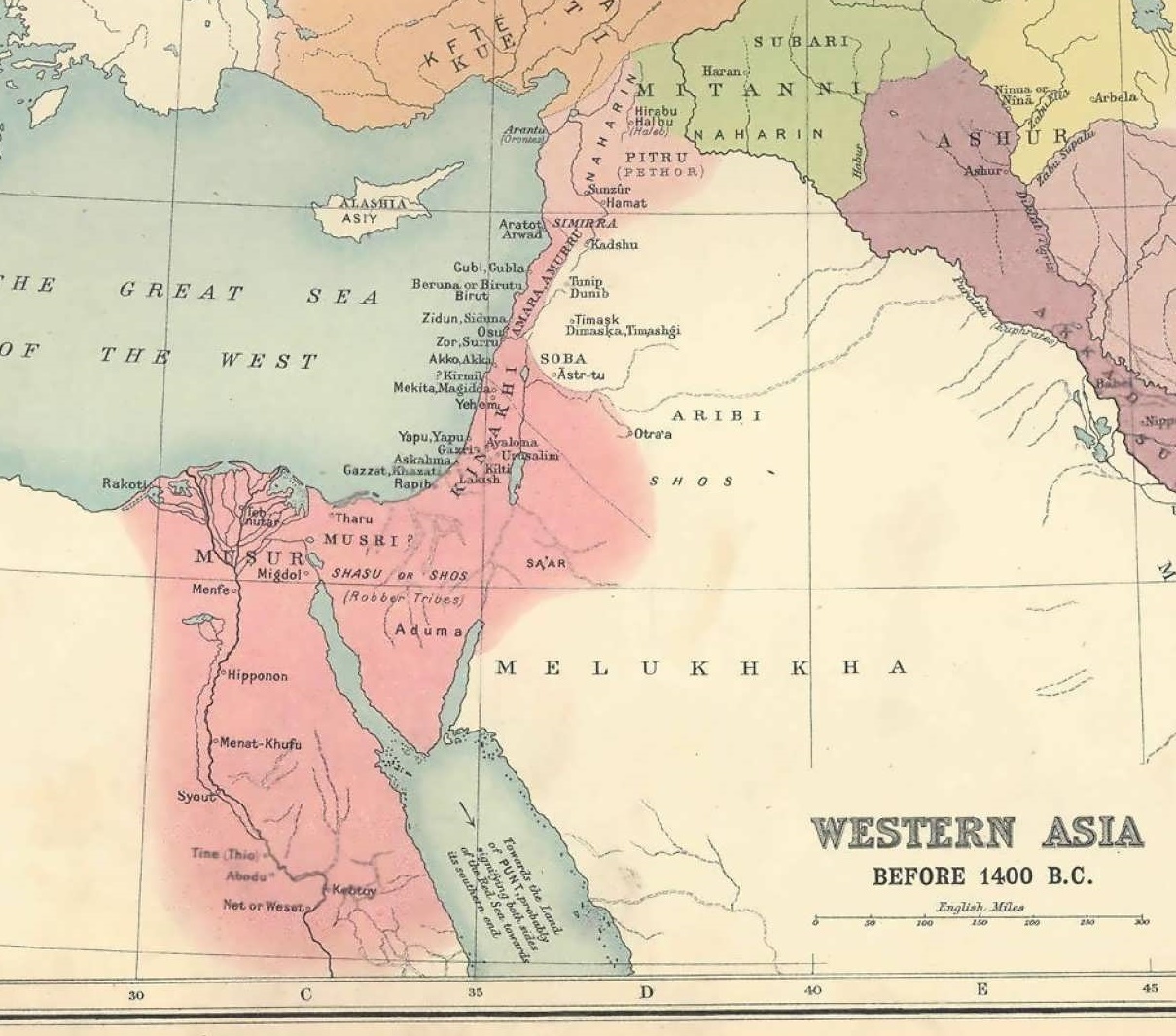
This is a close up revealing the ancient Egyptian empire during the time of Moses, revealing that the ancient Egyptian empire ruled the traditional Sinai Peninsula territory
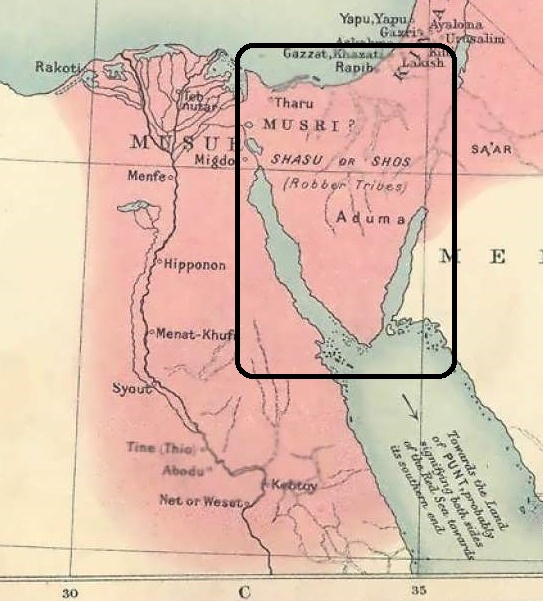
Based on this map, it shows us that the traditional Sinai Peninsula was part of the ancient Egyptian empire.
This map shows the land of ancient Midian, not located in the traditional Sinai Peninsula, but in modern northeastern Saudi Arabia, circled in red
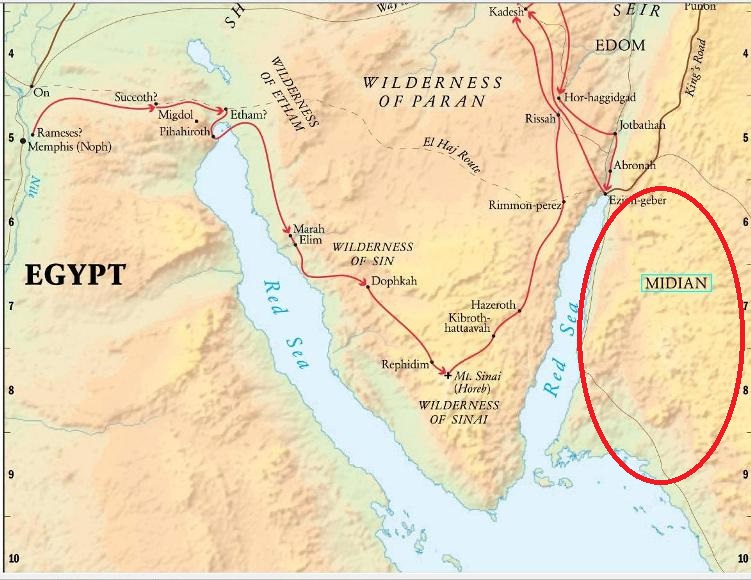
This reveals to us that the traditional Sinai Peninsula was not located in the land of Midian, and that Mount Sinai was not located in the traditional Sinai Peninsula, in which both of them were part of the ancient Egyptian empire.
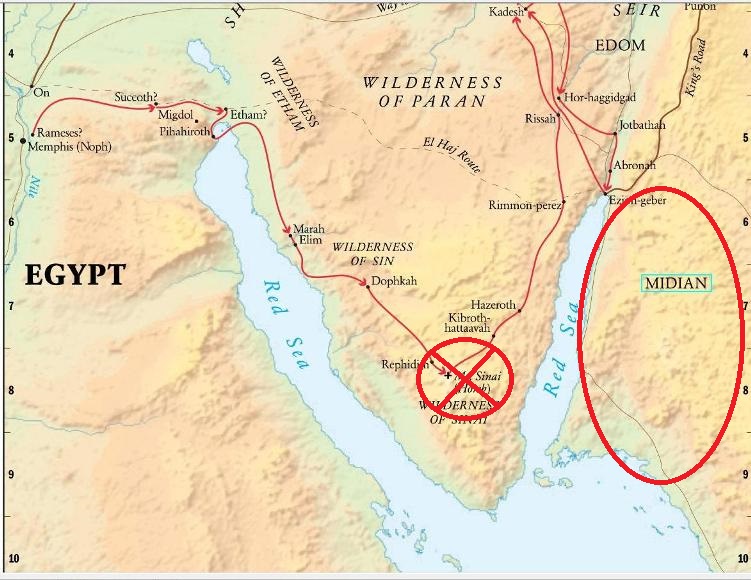
Looking at the following words:
PI HAHIROTH
The Hebrew word for Pi Hahiroth is "Pee Hah-khee-roth"- Peh, Yod; Heh, Khet, Resh, Tav (trxh yp). It is from Strong's Concordance number 6367, and its definition
From H6310 and the feminine plural of a noun (from the same root as H2356), with the article interposed; mouth of the gorges; Pi-ha-Chiroth, a place in Egypt. (Found in Num_14:19 without the “pi”.): - Pi-hahiroth. [In Num. H14 : H19 without Pi-.]
Pi
from 6310 "peh" (hp), and its definition
From H6284; the mouth (as the means of blowing), whether literally or figuratively (particularly speech); specifically edge, portion or side; adverbially (with preposition) according to: - accord (-ing as, -ing to), after, appointment, assent, collar, command (-ment), X eat, edge, end, entry, + file, hole, X in, mind, mouth, part, portion, X (should) say (-ing), sentence, skirt, sound, speech, X spoken, talk, tenor, X to, + two-edged, wish,
from 6284 "pah-ah" (hap), and its definition
A primitive root; to puff, that is, blow away: - scatter into corners.
Pi means "mouth"
Hahiroth
from 2356 "khohr" (rx), and its definition
The same as H2352; a cavity, socket, den: - cave, hole.
from 2352 "khoor" (rx), and its definition
From an unused root probably meaning to bore; the crevice of a serpent; the cell of a prison: - hole.
Hahiroth would mean "cavities" or "gorges".
Pi Hahiroth means "Mouth of the Gorges".
MIGDOL
The Hebrew word "Meeg-dohl"- Mem, Gimel, Dalet, Lamed (ldgm) is from Strong's Concordance number 4024, and its defintion
Probably of Egyptian origin; Migdol, a place in Egypt: - Migdol, tower.
Migdol means "tower".
BAAL ZEPHON
The Hebrew word for Baal Zephon is "Bah-ahl Ts'phohn"- Bet, Ayin, Lamed; Tsade, Peh, Nun Sophit (Npu leb). It is from Strong's Concordance number 1189, and its definition
From H1168 and H6828 (in the sense of cold) (according to others as Egyptian form of Typhon, the destroyer); Baal of winter; Baal Tsephon, a place in Egypt: - Baal-zephon.
Baal
from 1168 "bah-ahl" (leb), and its definition
The same as H1167; Baal, a Phoenician deity: - Baal, [plural] Baalim.
from 1167 "bah-ahl" (leb), and its definition
From H1166; a master; hence a husband, or (figuratively) owner (often used with another noun in modifications of this latter sense: - + archer, + babbler, + bird, captain, chief man, + confederate, + have to do, + dreamer, those to whom it is due, + furious, those that are given to it, great, + hairy, he that hath it, have, + horseman, husband, lord, man, + married, master, person, + sworn, they of.
from 1166 "bah-ahl" (leb), and its definition
A primitive root; to be master; hence (as denominative from H1167) to marry: - Beulah have dominion (over), be husband, marry (-ried, X wife).
Baal means "master".
Zephon
from 6828 "tsah-phohn" (Npu), and its definition
From H6845; properly hidden, that is, dark; used only of the north as a quarter (gloomy and unknown): - north (-ern, side, -ward, wind).
from 6845 "tsah-phahn" (Npu), and its definition
A primitive root; to hide (by covering over); by implication to hoard or reserve; figuratively to deny; specifically (favorably) to protect, (unfavorably) to lurk: - esteem, hide (-den one, self), lay up, lurk (be set) privily, (keep) secret (-ly, place).
Zaphon means "hidden" or "darkness".
Baal Zephon means "Master of Darkness".
Going back to Etham in the previous chapter of this week's Torah portion, this is a map image below showing the location of Etham in the Sinai Peninsula area, highlighted in black
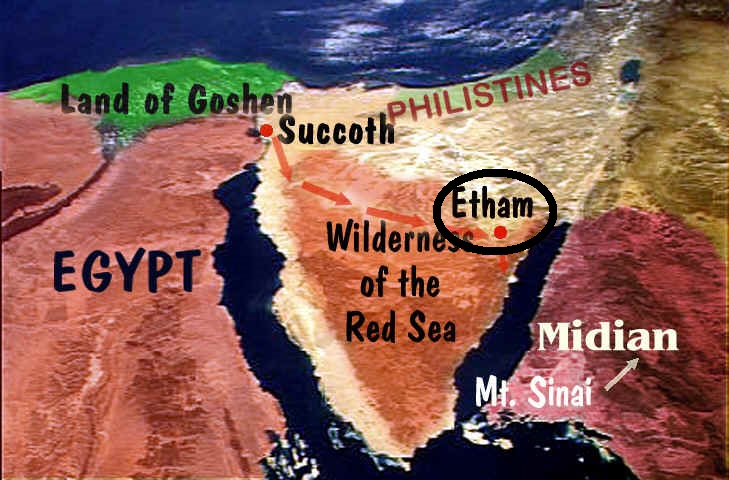
When it says in verse one, "opposite Baal Zephon", in my opinion, it means that the location is opposite the sea.
In my opinion, Pi Hahiroth is the "mouth" meaning the "opening". After researching, It is my humble but strong opinion that this is located at the entrance to Nuweiba Beach, and that Migdol is the "great" mountains
This is a map of the location of the Gulf of Aqaba, east of the Sinai Peninsula
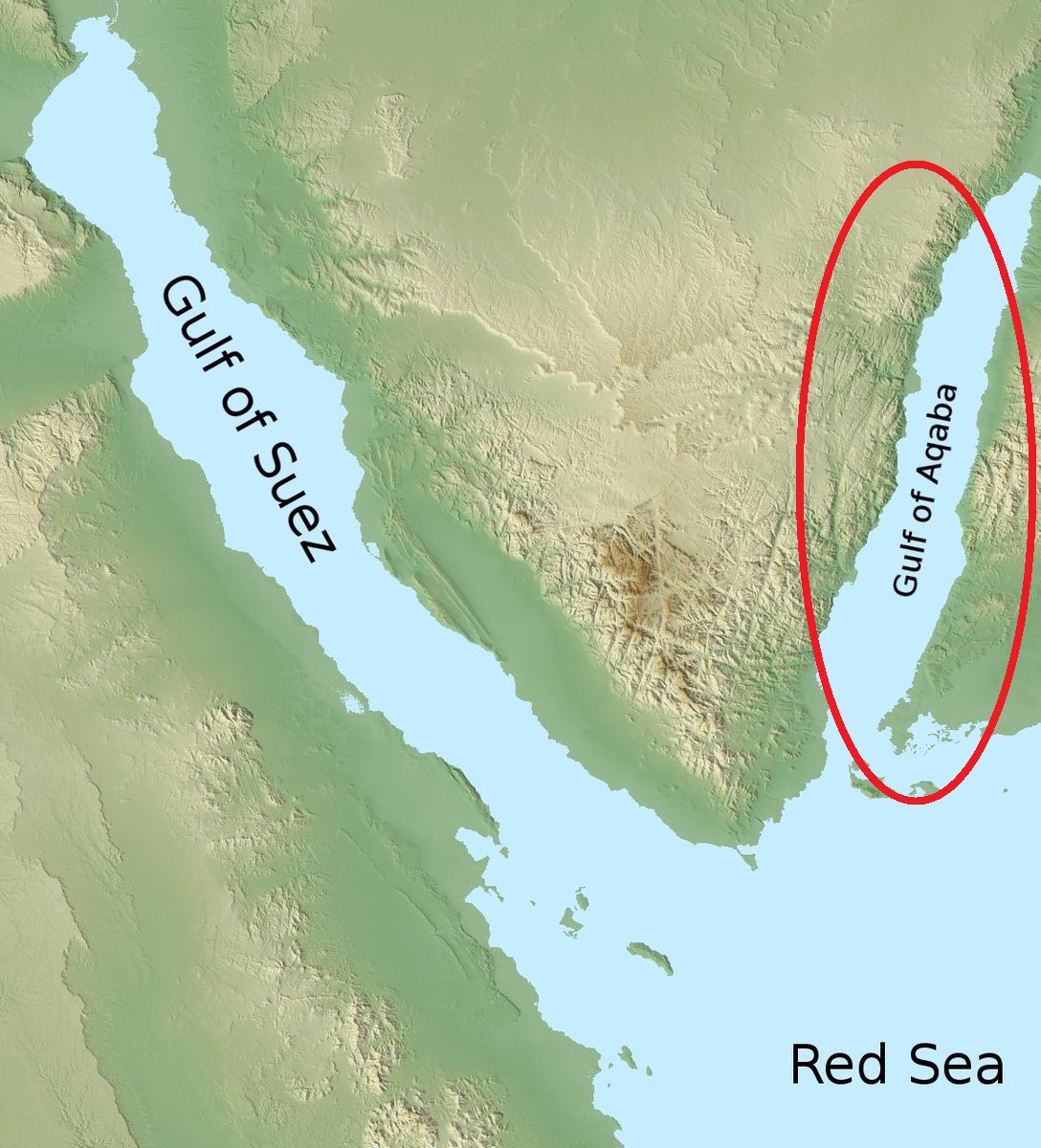
This is a satelite image of Nuweiba Beach, located in the eastern shore of the east end of the Sinai Peninsula, located at the Gulf of Aqaba, highlighted in red
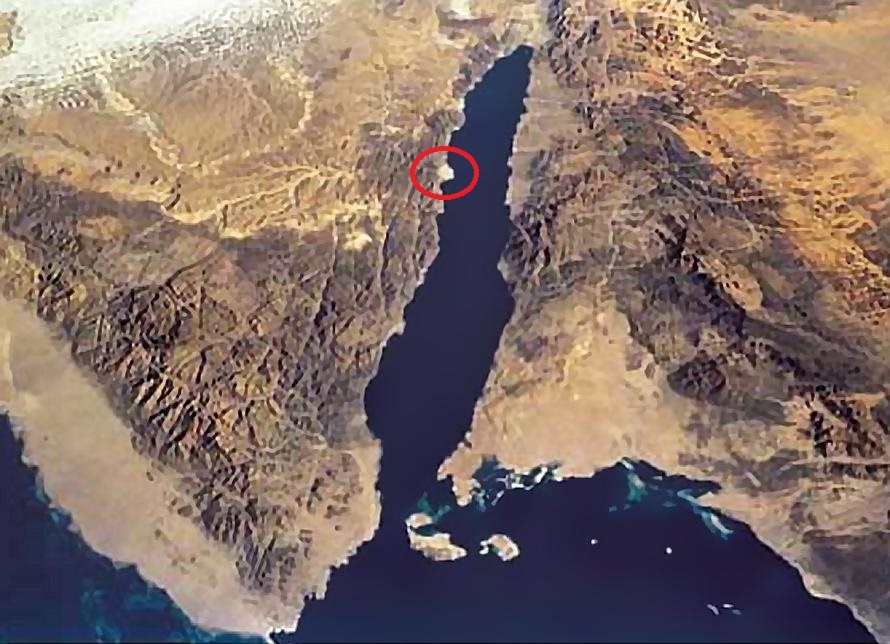
This is another satelite map showing part of the Sinai Peninsula to Nuweiba Beach
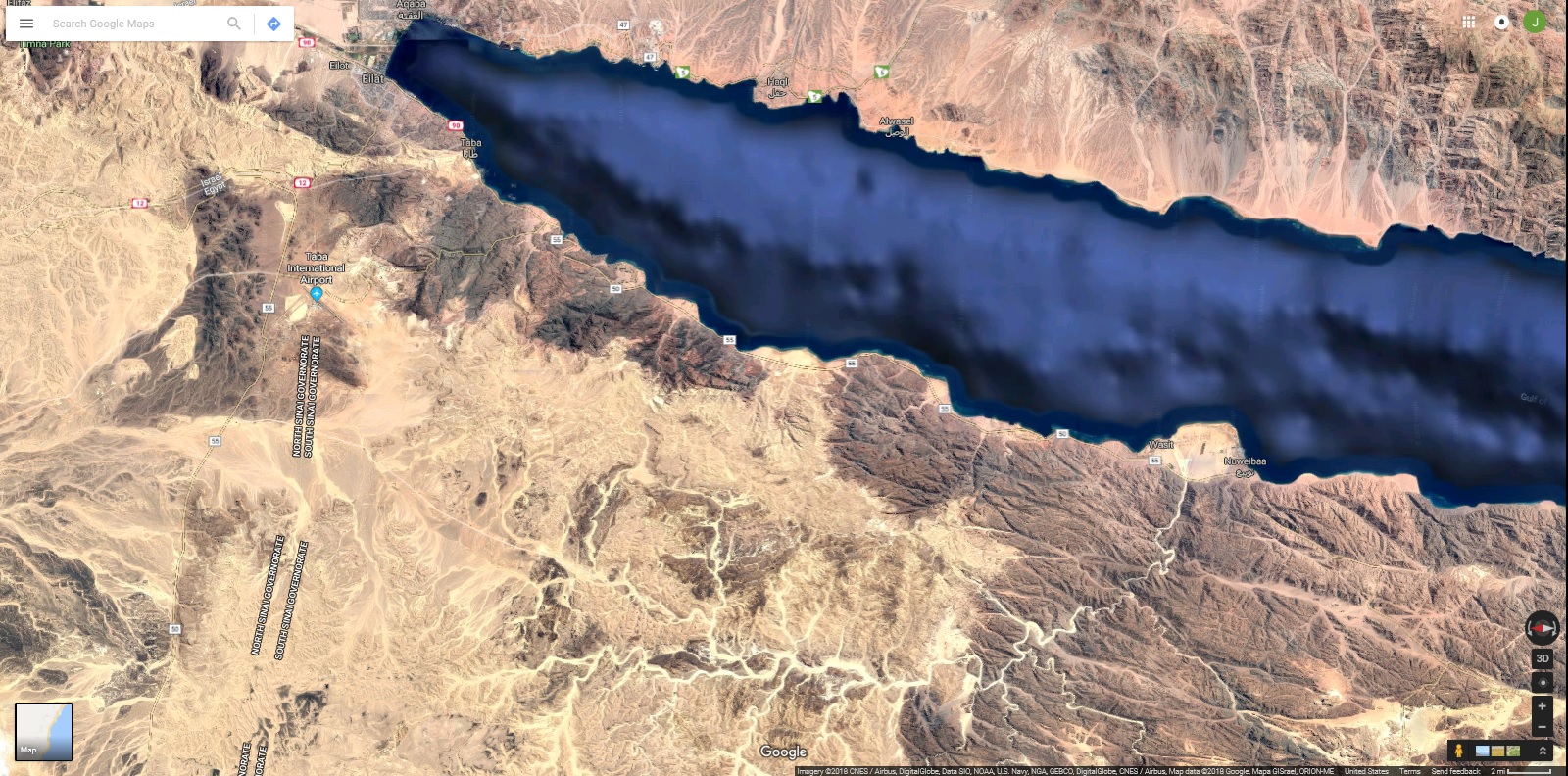
This is a close up view of the same satelite map showing Israelite's possible route to Nuweiba Beach
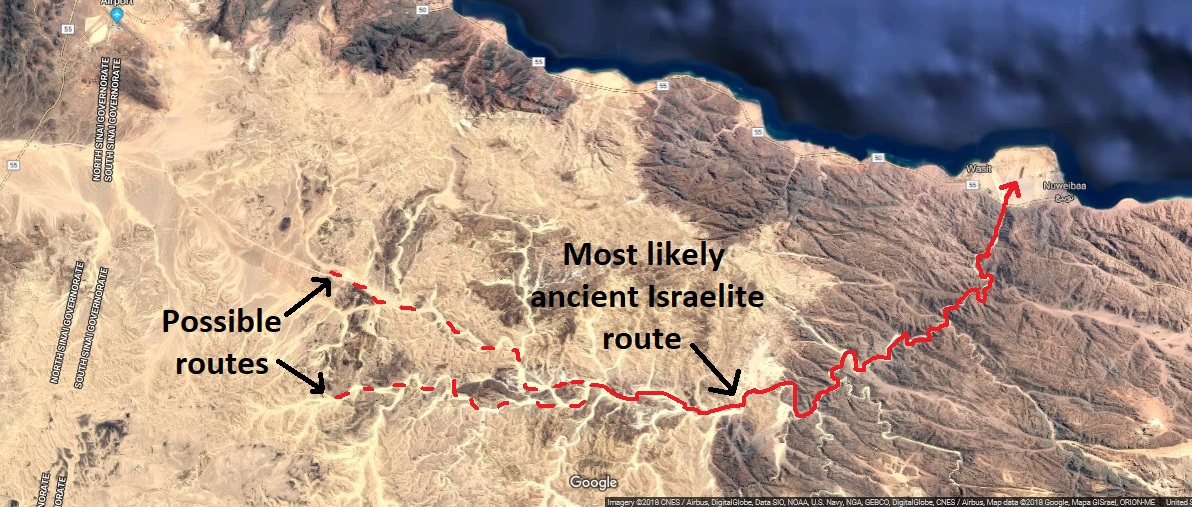
This is another satelite map showing the same possible route to Nuweiba Beach
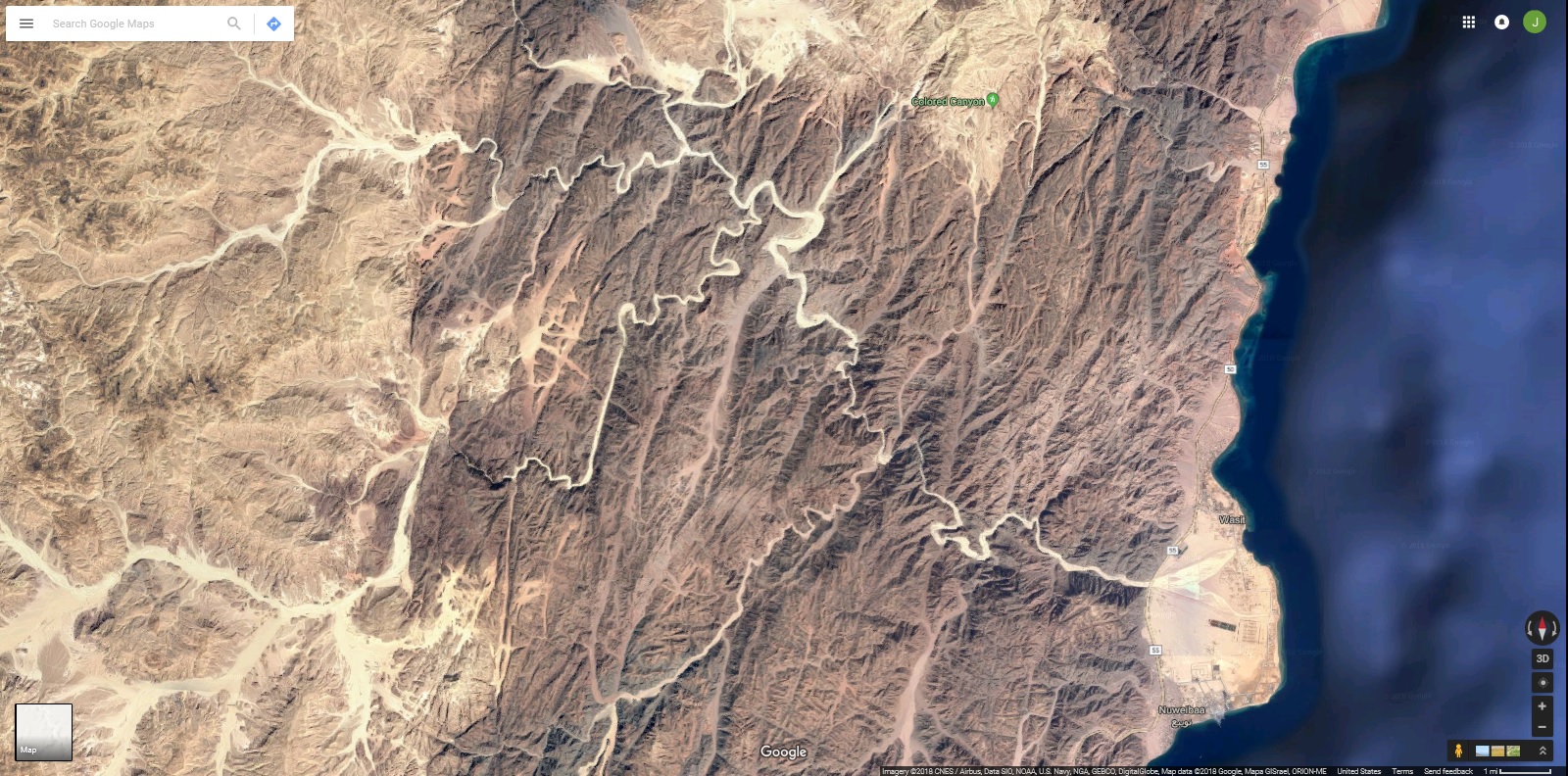
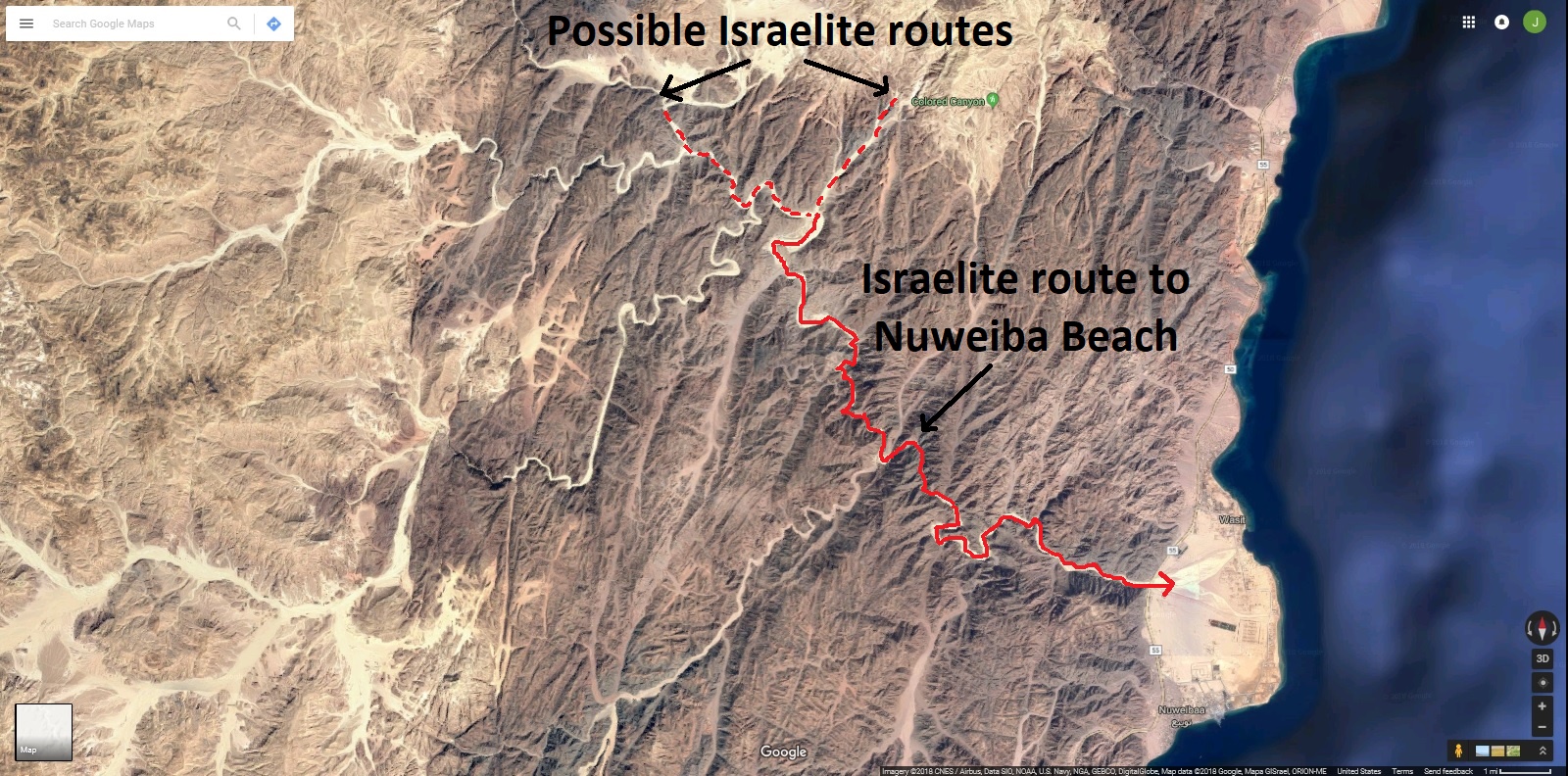
These are close up satelite images of certain areas that are more in the area guaranteed to be en route to Nuweiba Beach to give an idea of the terrain they traveled through (Note: the route on these images is looking away from Nuweiba Beach [I challenge you to find the locations on the satelite images above])
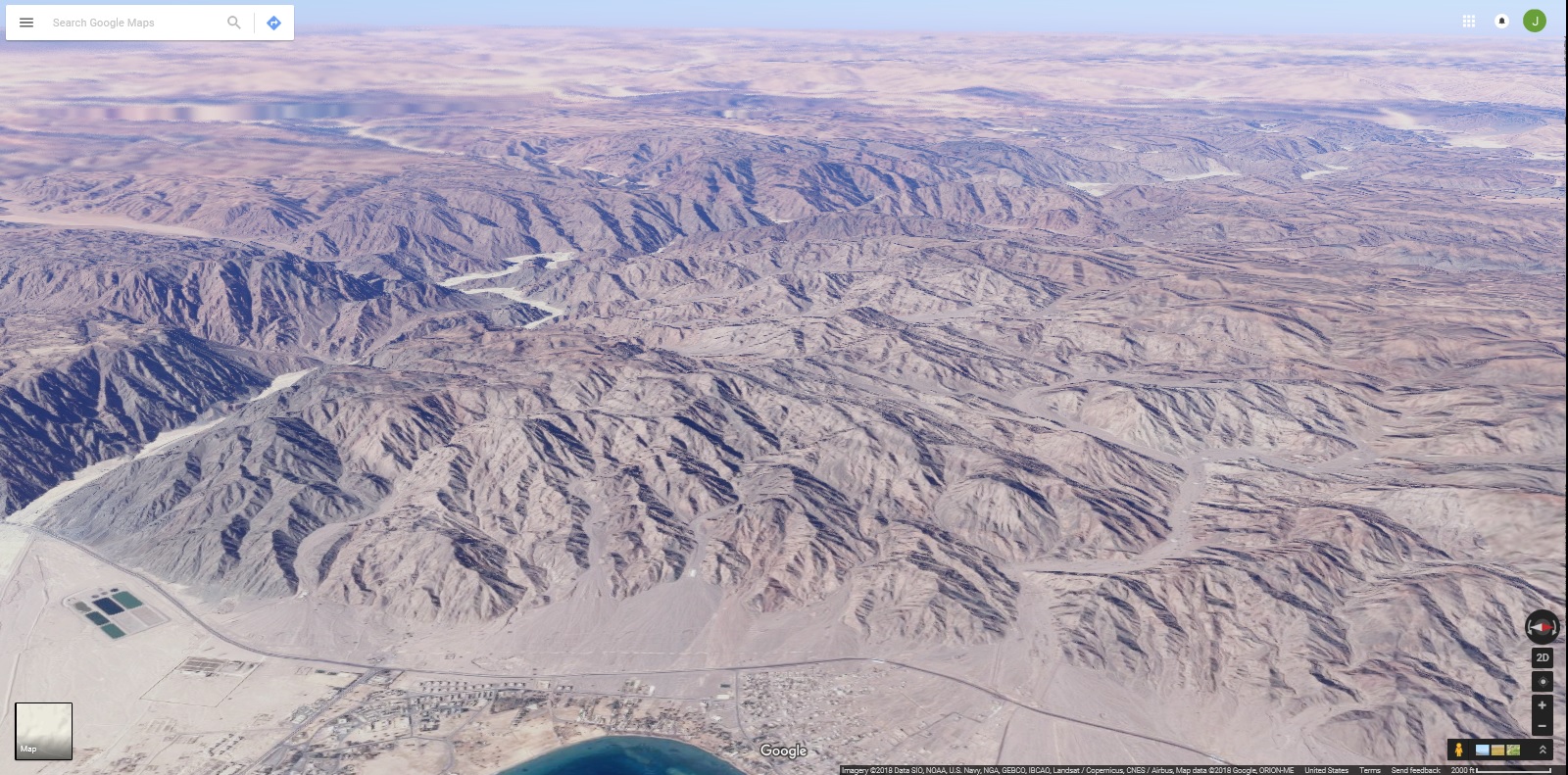
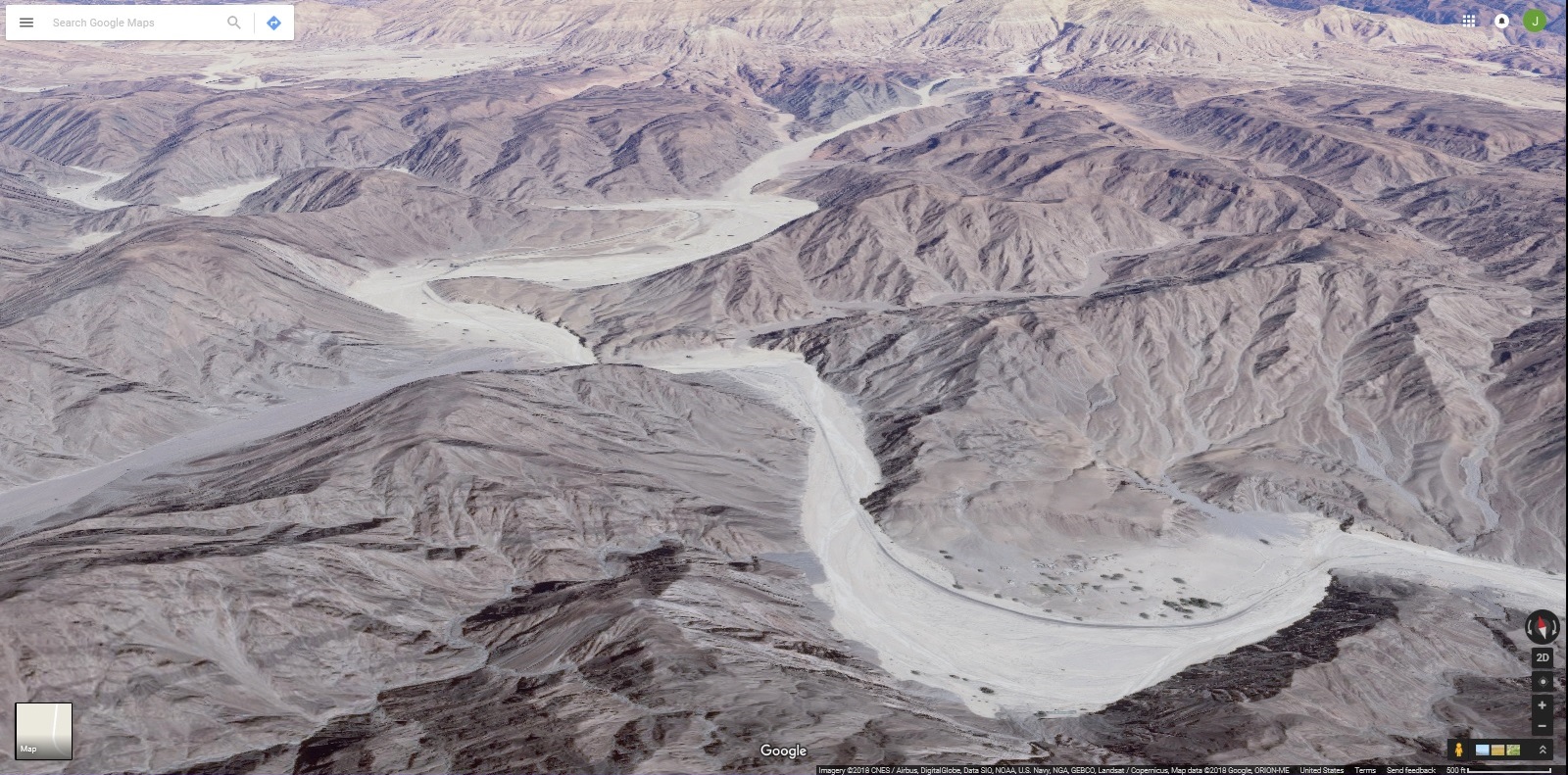
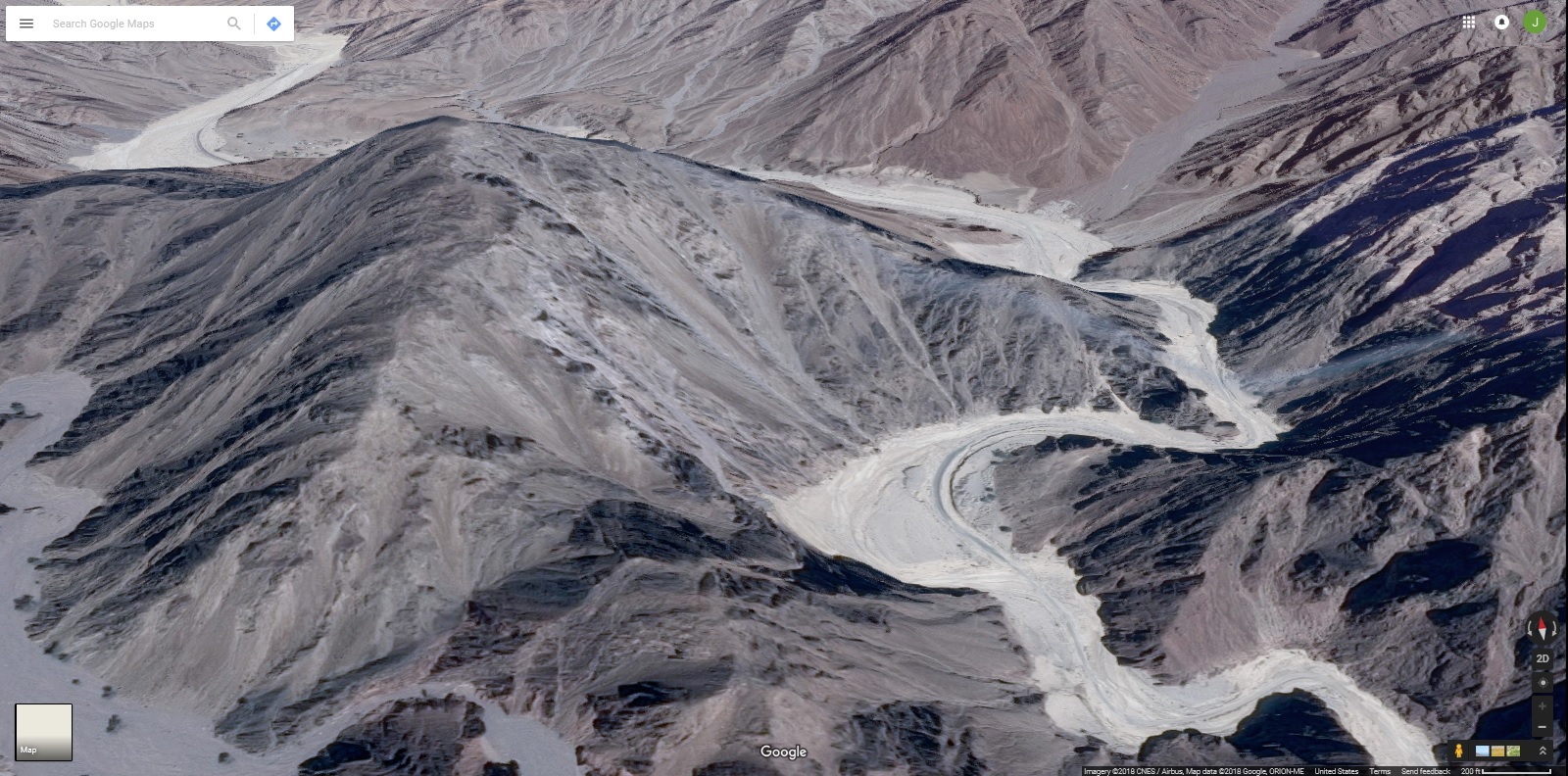
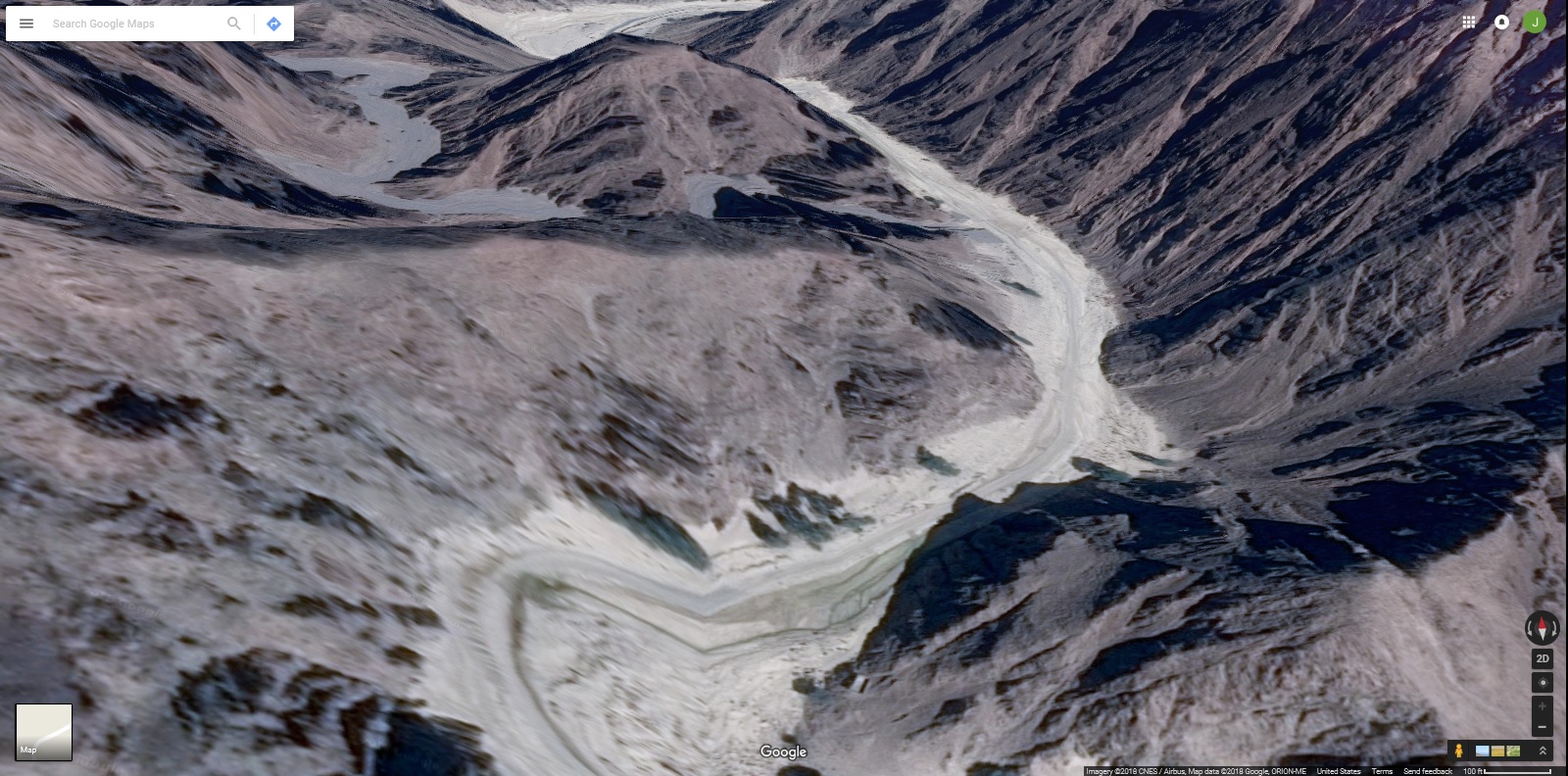
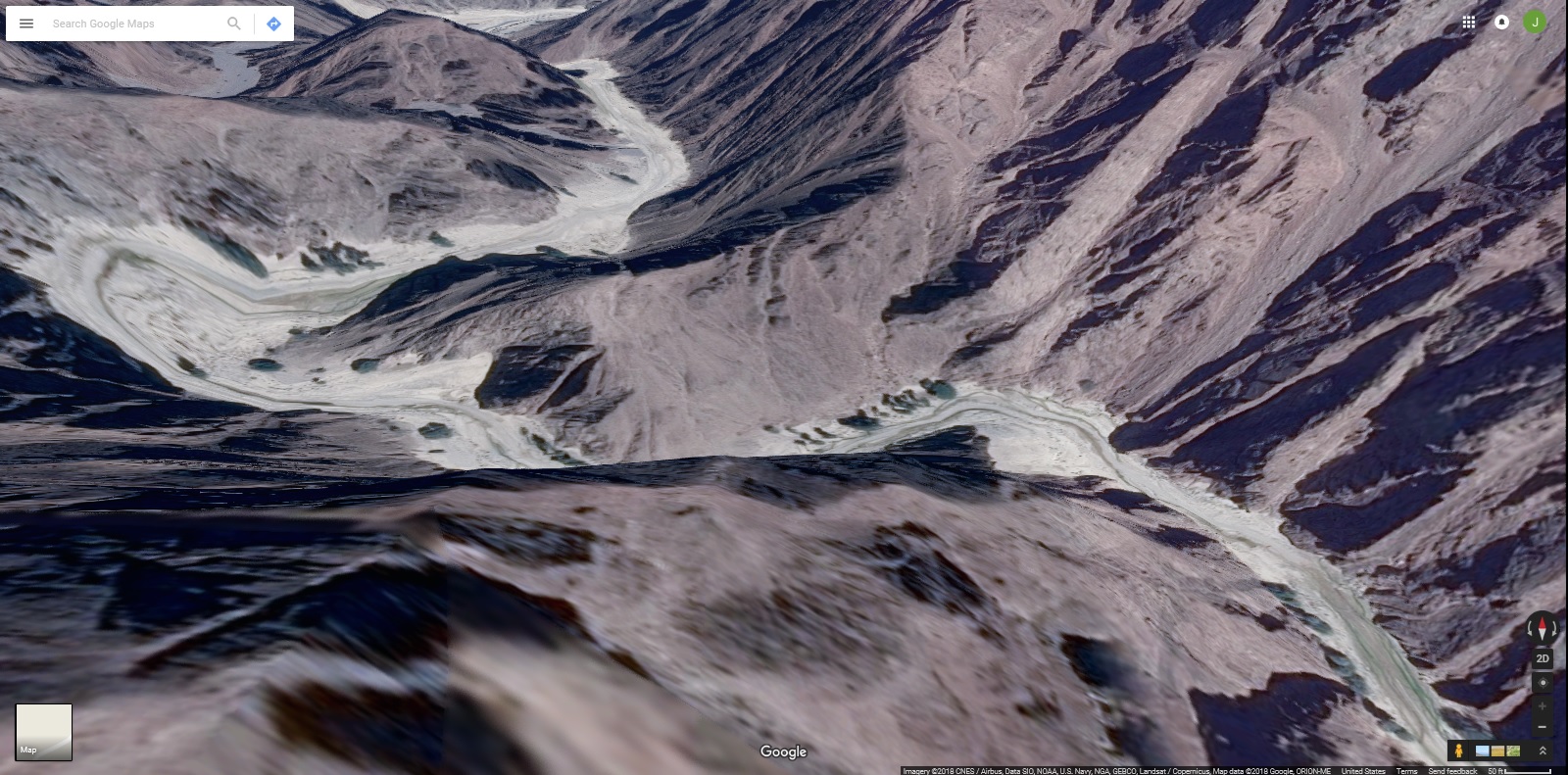
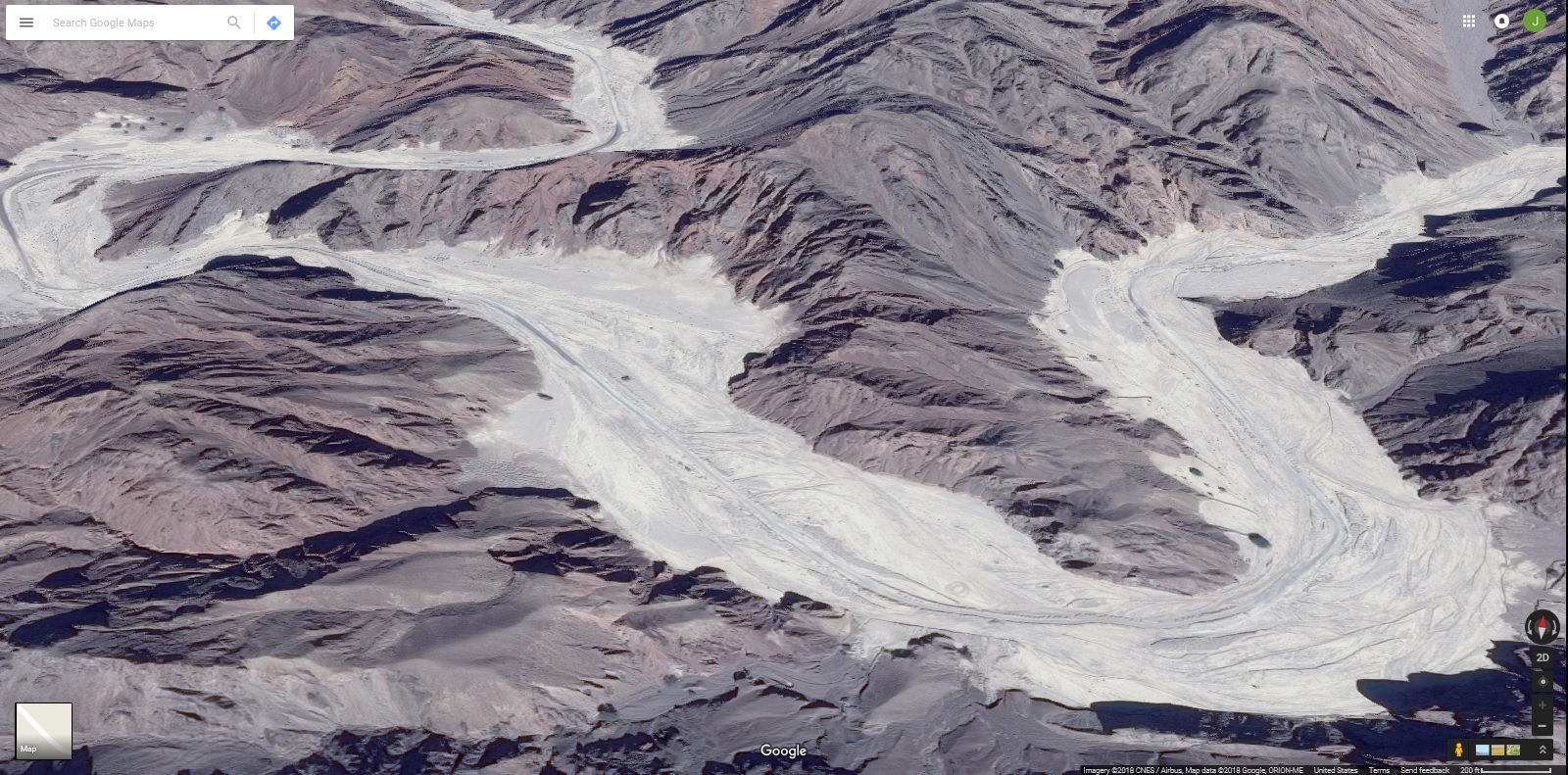
This are satelite images heading towards Nuweiba Beach
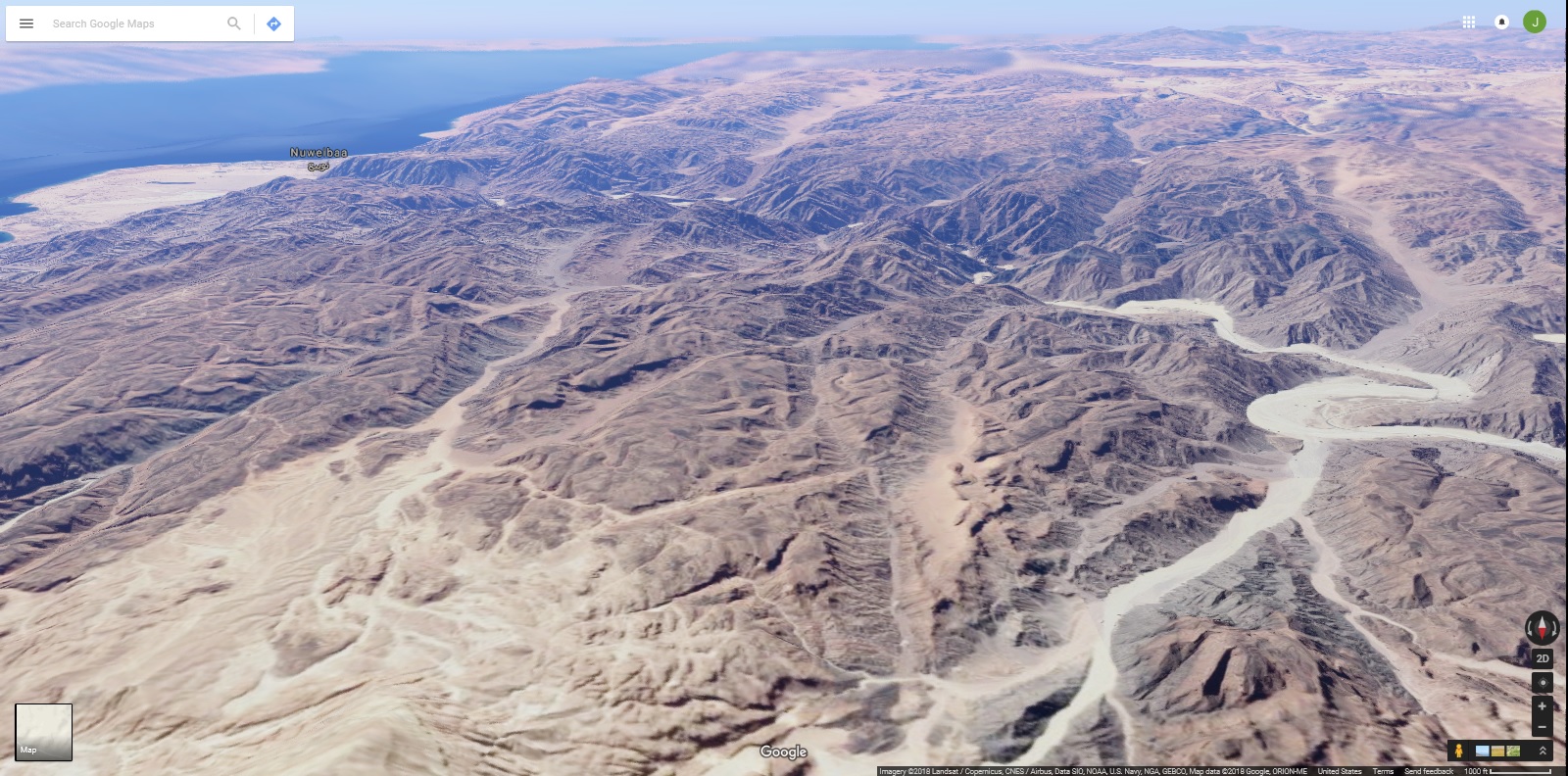
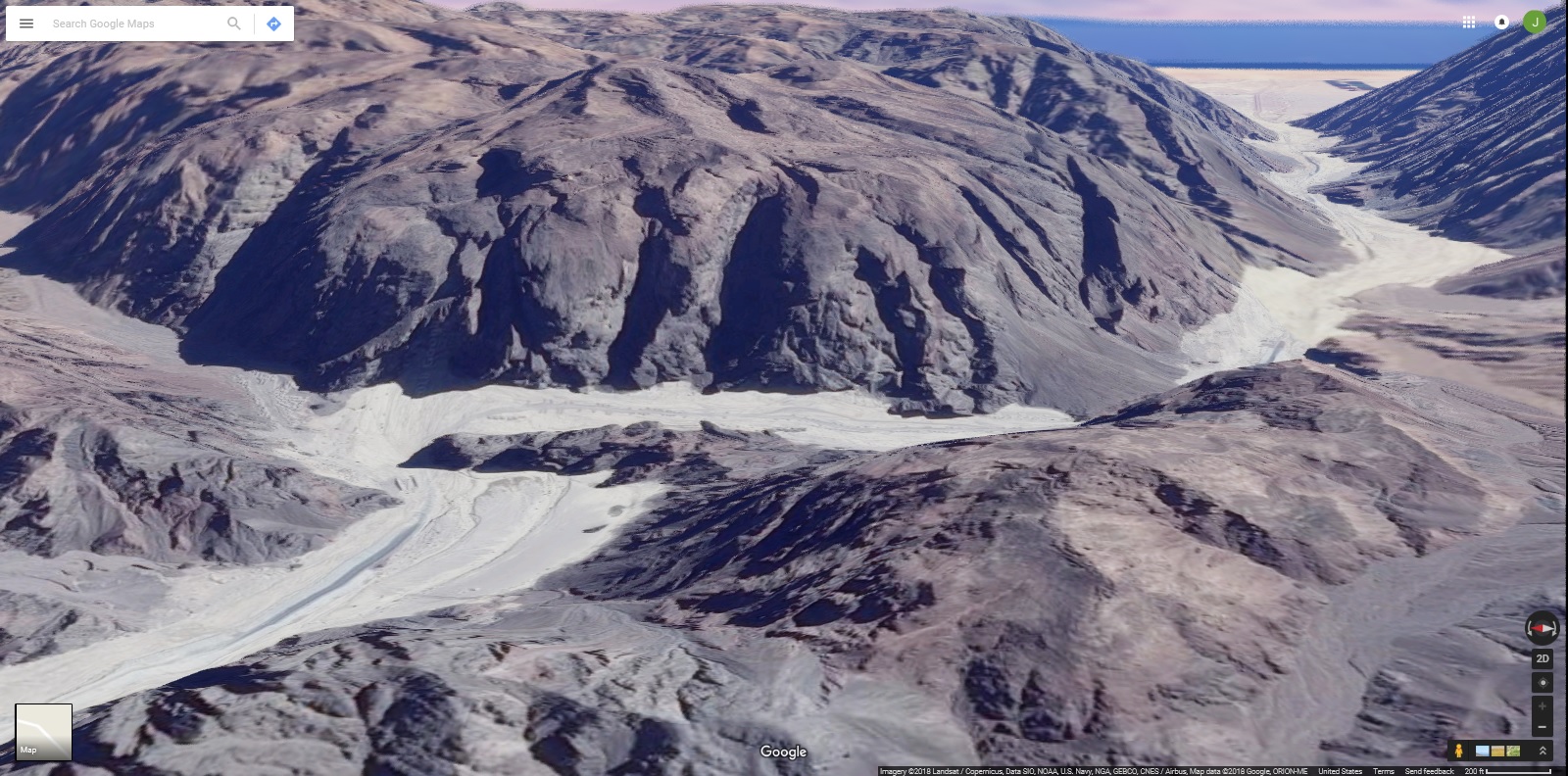
These are close-up images of Nuweiba Beach
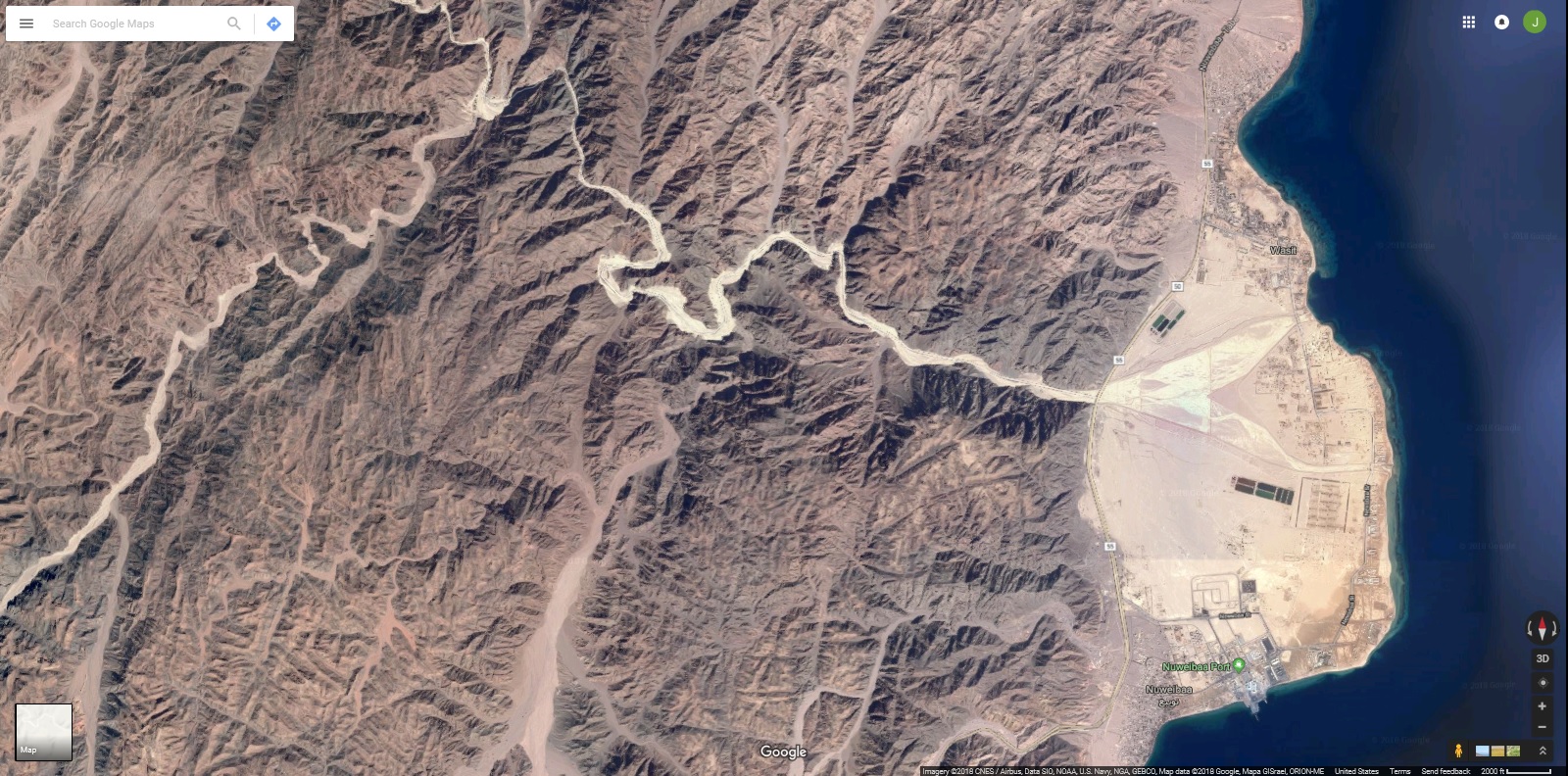
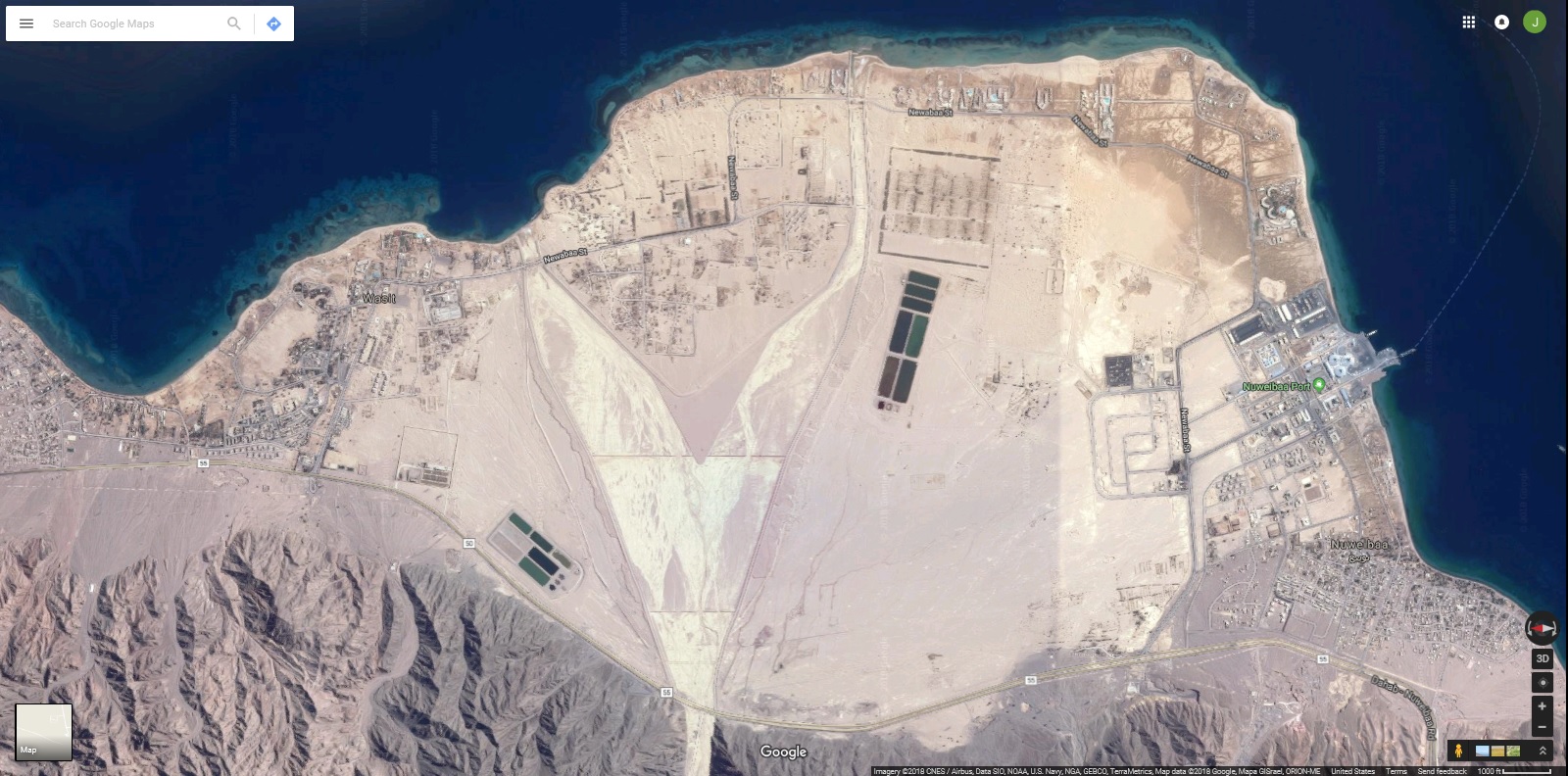
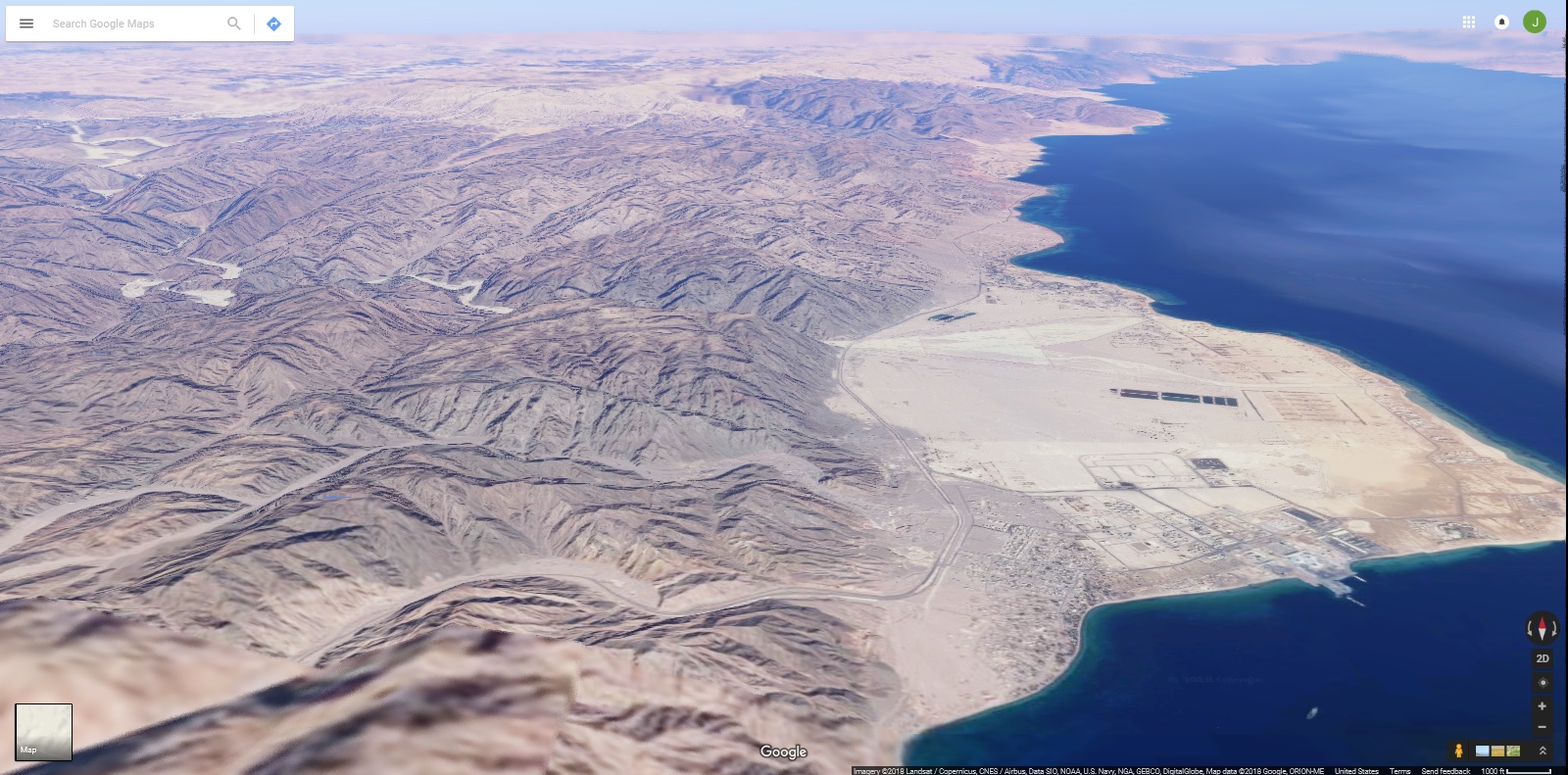
These are various images of the locations of Pi Hahiroth, Migdol and Baal Zephon
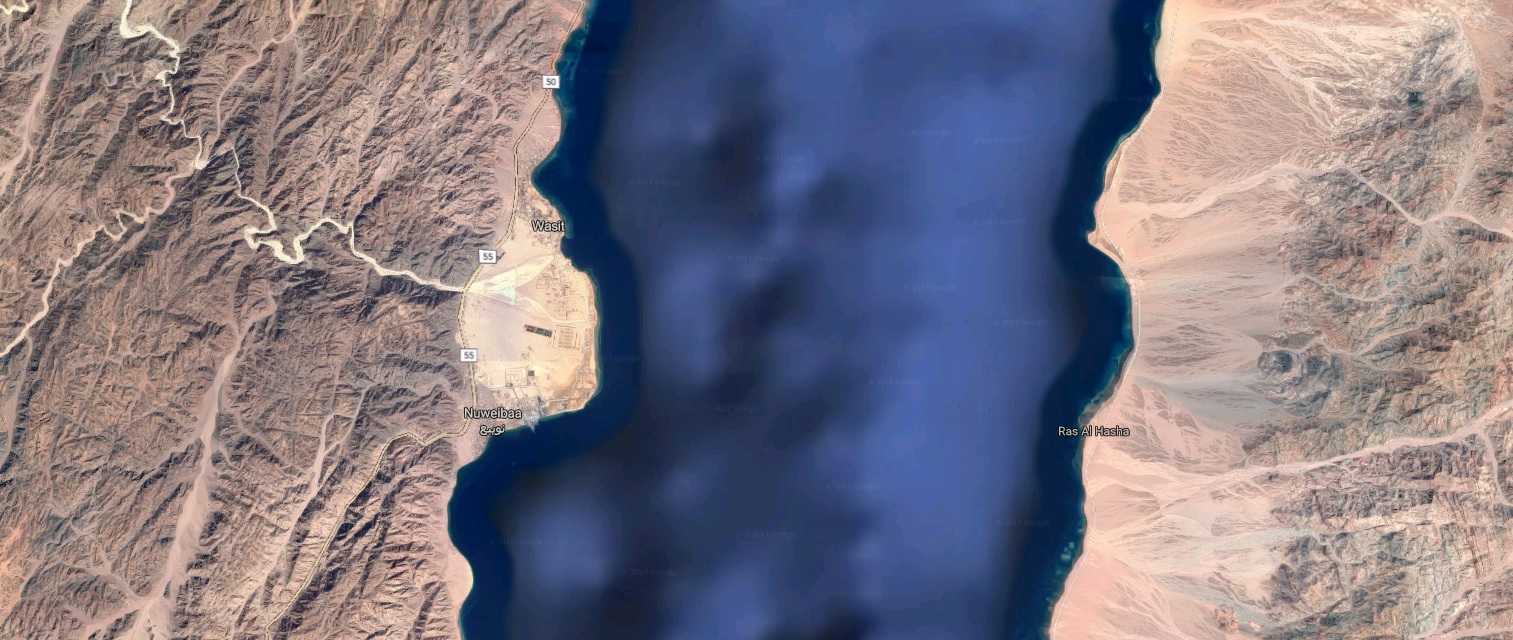
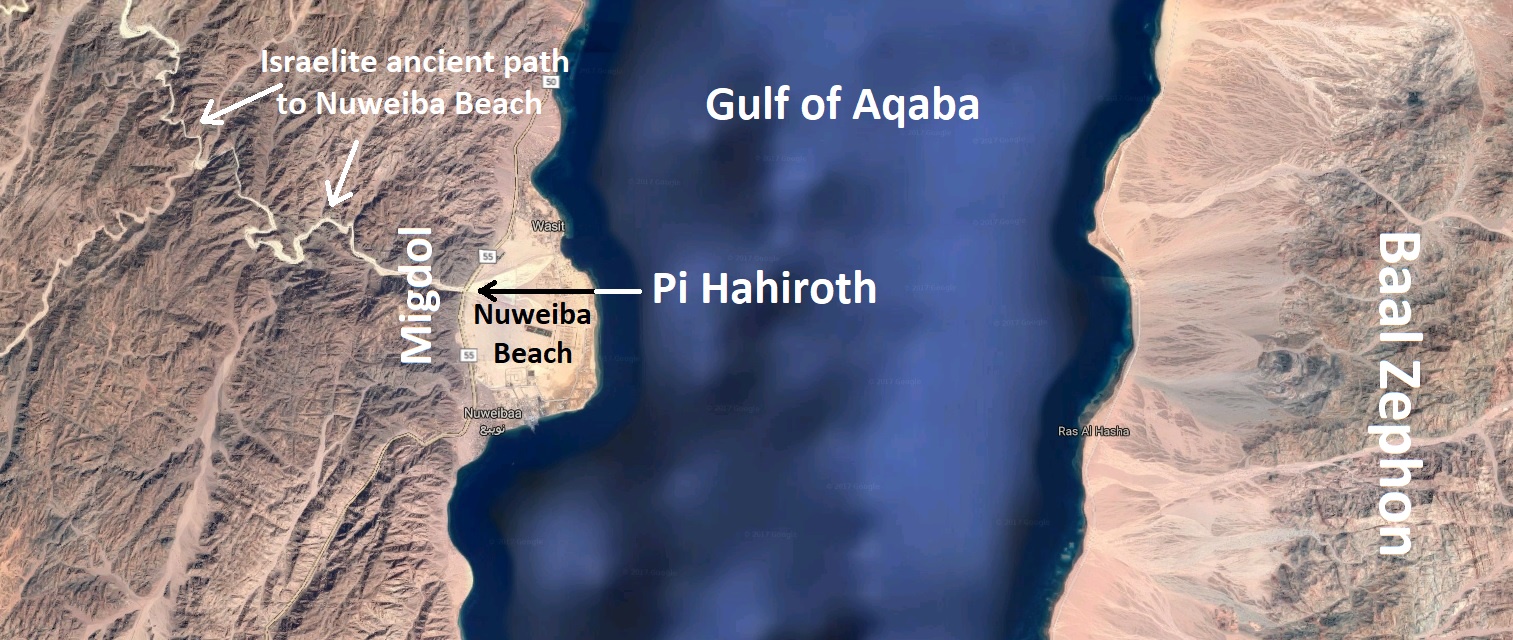
This is an image of the Israelites ancient pathway to Nuweiba Beach
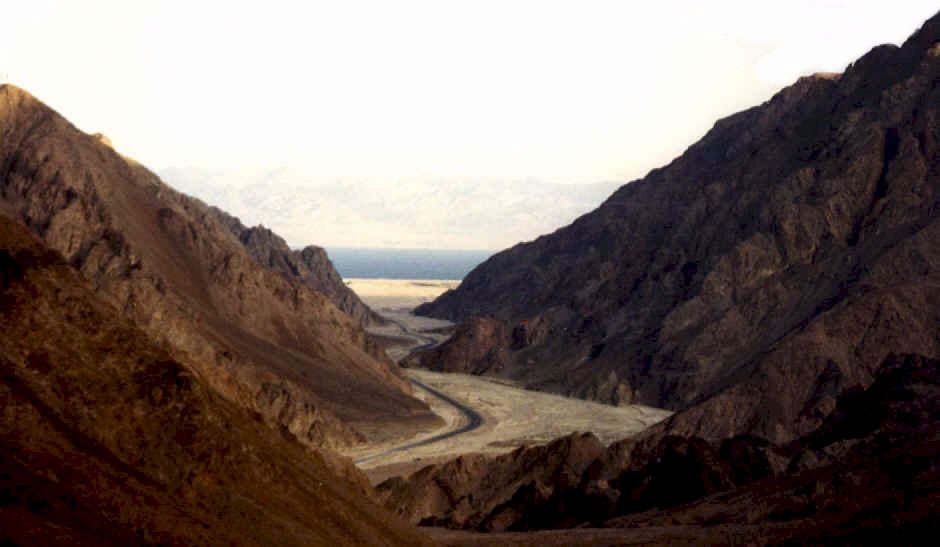
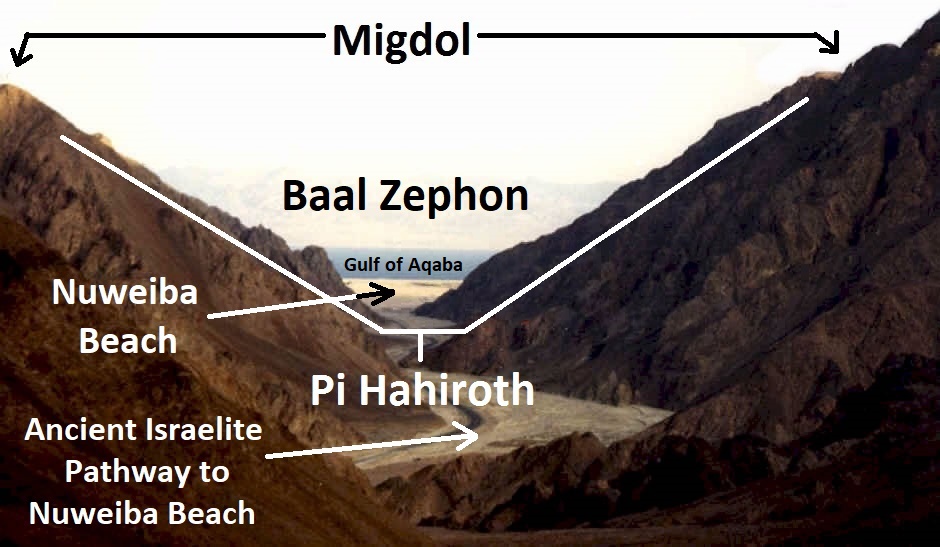
This is an image of Nuweiba Beach looking from the Gulf of Aqaba
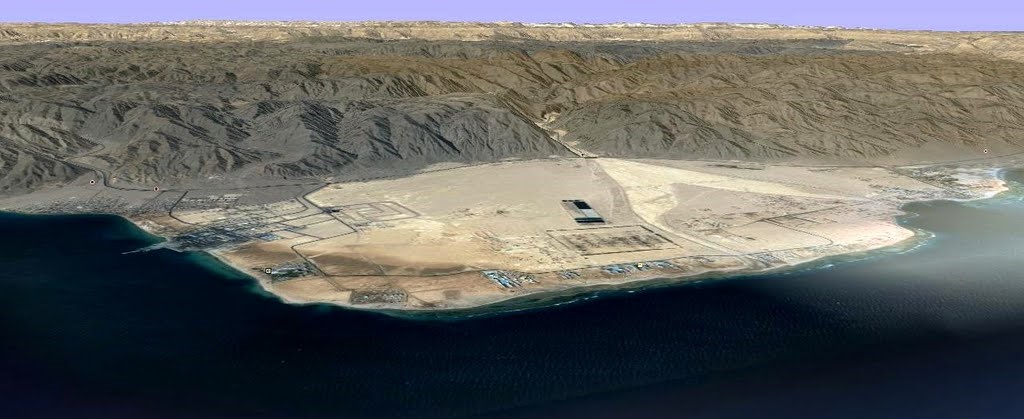
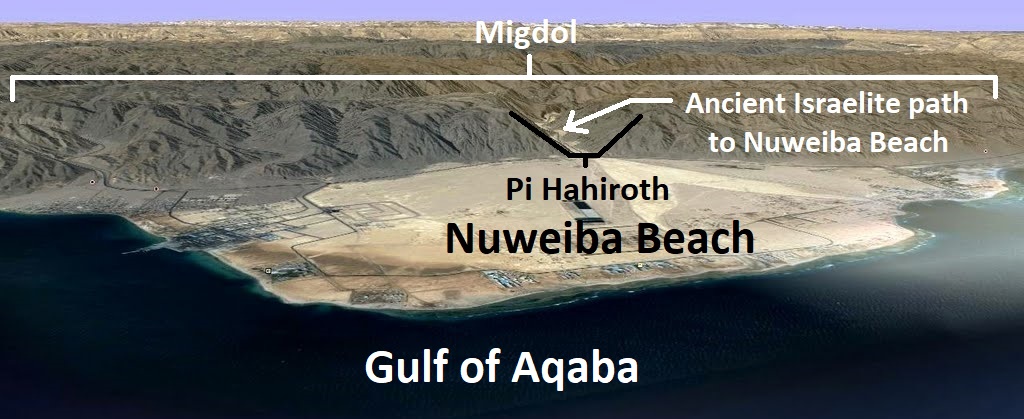
This picture below is a close up of the entrance of Pi Hahiroth towards Nuweiba Beach at ground level. The entrance is wide, and looking at the vehicle ahead going the opposite direction, it is over six feet wide.
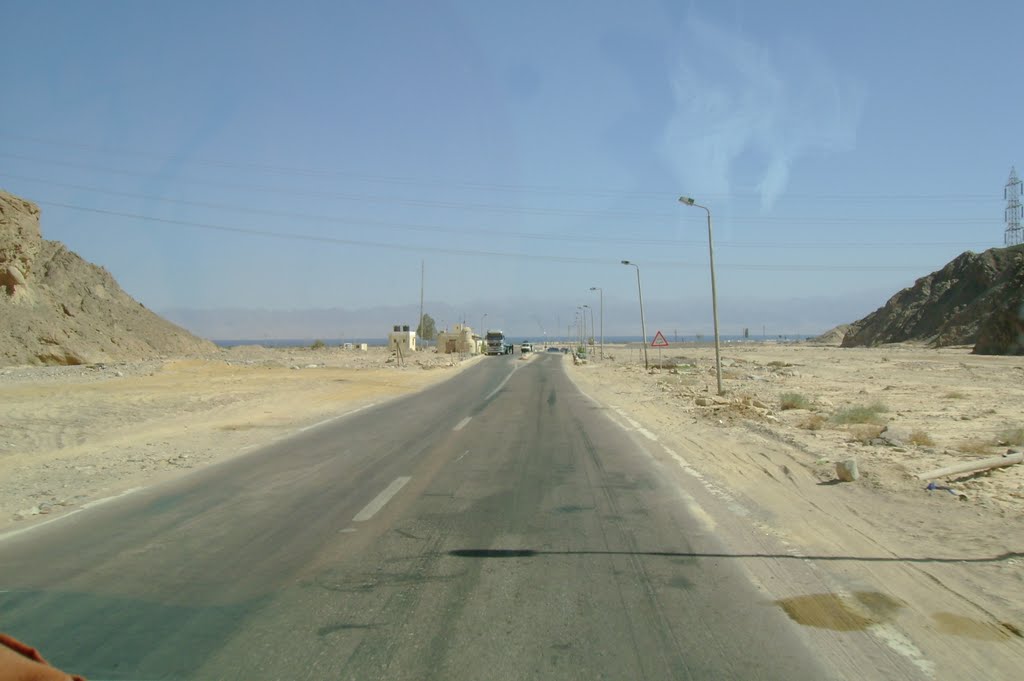
This is a satelite image view of the location of this area pictured above
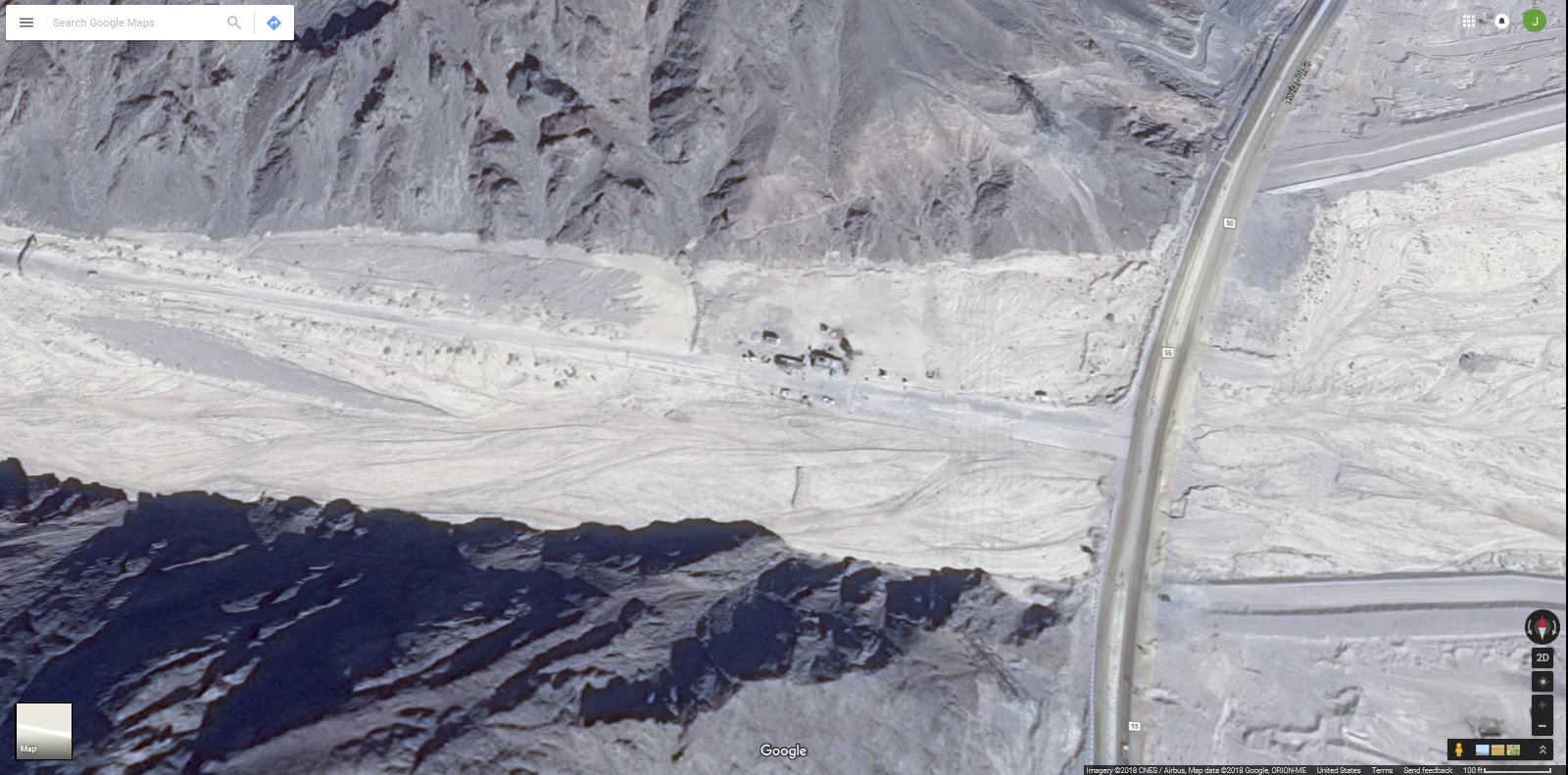
This is the same satelite image showing the measurement of the width near the entrance
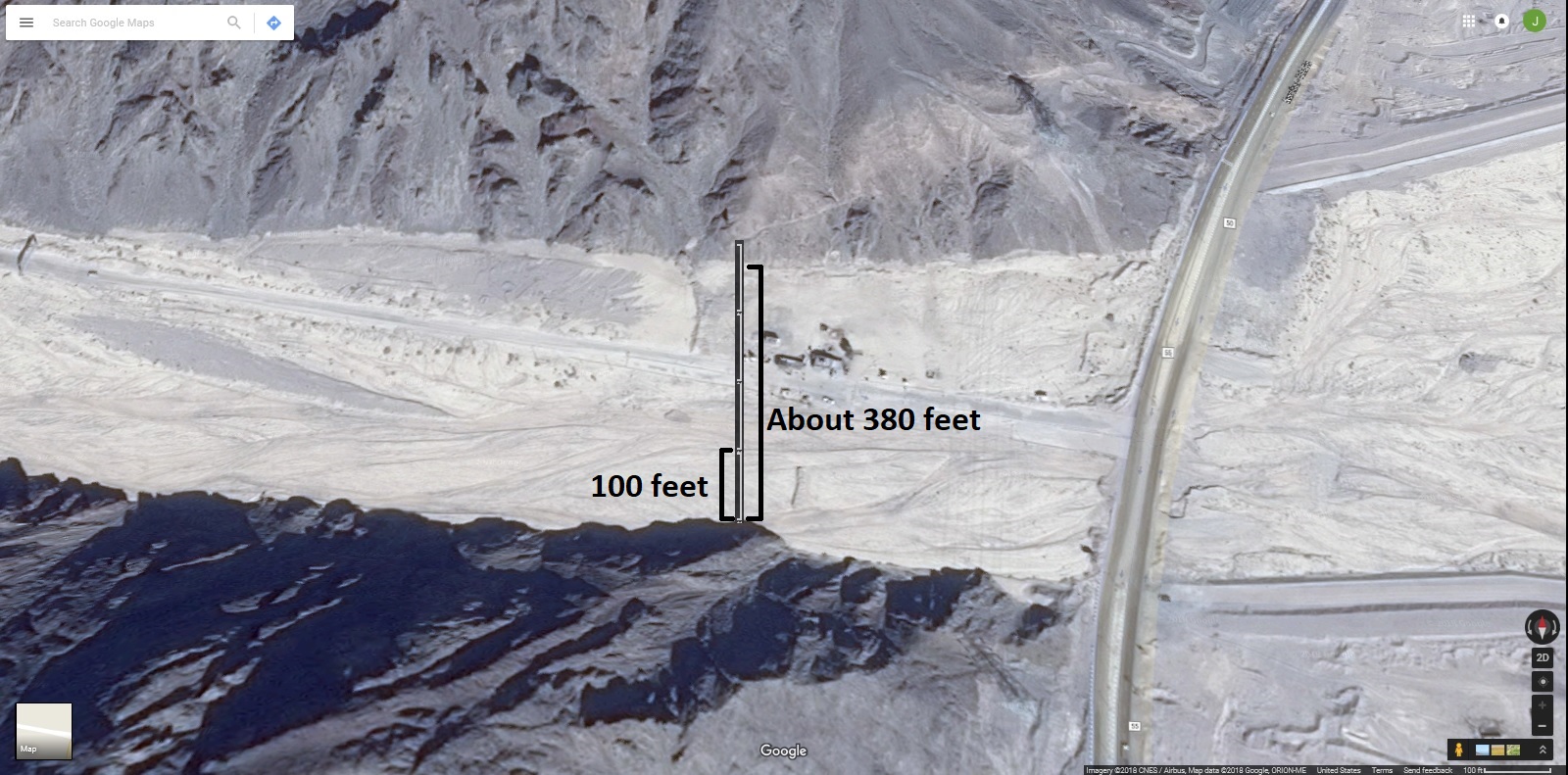
Measuring, it shows that the width from one edge of the side of the mountain to the other edge of the mountain is about 380 feet. This width can probably fit roughly sixty vehicles beside one another, snug, to each edge of both sides of the mountains.
Based in this week's Torah portion passage, hwhy can use people, including unbelievers, to glorify Himself by strengthening their hearts.
Indirectly related, Yeshua applied this principle to Himself in the upper room on the night of the Passover when His time was near to be crucified, which is noted in the Gospel of John
John 13:21 When Yeshua had thus said, He was troubled in spirit, and testified, and said, Verily, verily, I say unto you, that one of you shall betray Me. 22 Then the disciples looked one on another, doubting of whom He spake. 23 Now there was leaning on Yeshua's bosom one of His disciples, whom Yeshua loved. 24 Simon Peter therefore beckoned to him, that he should ask who it should be of whom He spake. 25 He then lying on Yeshua's Breast saith unto Him, Lord, who is it? 26 Yeshua answered, He it is, to whom I shall give a sop, when I have dipped it. And when he had dipped the sop, he gave it to Judas Iscariot, the son of Simon. 27 And after the sop Satan entered into him. Then said Yeshua unto him, That thou doest, do quickly. 28 Now no man at the table knew for what intent He spake this unto him. 29 For some of them thought, because Judas had the bag, that Yeshua had said unto him, Buy those things that we have need of against the Feast; or, that he should give something to the poor. 30 He then having received the sop went immediately out: and it was night. 31 Therefore, when he was gone out, Yeshua said, Now is the Son of Man glorified, and hwhy is glorified in Him. 32 If hwhy be glorified in Him, hwhy shall also glorify Him in Himself, and shall straightway glorify Him.
Yeshua allowed HaSatan to enter into Judas Iscariot to betray Him as a means to glorify Himself as hwhy told Moses that He will glorify Himself through the strengthening of Pharaoh's heart and pursue after the Israelites.
Notice in verse four that hwhy had "strengthened" ("khazak" (qzx)) Pharaoh's heart one more time.
Sometimes hwhy uses us in Messiah to get entangled in the enemy's eyes by being placed between the "spiritual mouth of the gorges" of "spiritual death" and an "army of the world" on one side, and a dead end of a "spiritual sea" and "the Master of Darkness" who is HaSatan, thinking that we don't know what we are doing. But hwhy allows them to be against us in order to have us depend on Him to defeat the enemies in our lives. A basis of this is noted in the apostle Paul's letter to the assembly in Corinth
1 Corinthians 1:25 Because the Foolishness of hwhy is wiser than men; and the Weakness of hwhy is stronger than men.
Verses five through nine
5 And was told to the king of Egypt that the People ran away (bolted away): and the heart of Pharaoh and of his servants had changed toward the People, and they said, What is this we have done that we have sent away ta-Israel from serving us? 6 And ta-his chariot was prepared, and took ta-his people with him: 7 And he took six hundred chosen chariots, and all of the chariots of Egypt, and third (three) rankers (officers) over (upon) all of them. 8 And hwhy strengthened ta-the heart of Pharaoh, King of Egypt, and pursued (chased) after the Sons of Israel: And the Sons of Israel went out on a High Hand. 9 And Egypt, they pursued (chased) after them, and all of the horses and chariots of Pharaoh, and his horsemen (hoofmen), and his force (valiant ones), they overtook them camping upon the sea, upon Pi Hahiroth, to the face of Baal Zephon.
Every horse and chariot that Pharaoh gathered went with Pharaoh to face the Israelites. It is possible that Pharaoh had, roughly at minimum, 50,000 men total when he pursued them. The only way Pharaoh had caught up with them was that he followed Israel's tracks to their location.
Verses ten through fourteen
10 And Pharaoh drew near, and the Sons of Israel lifted up ta-their eyes, and behold, Egypt was marching (journeying) after them; and they feared much: and the Sons of Israel, they cried to hwhy. 11 And they said to Moses, That because (failing) no graves were in Egypt to take us to die in the wilderness? What is this you have done to us by bringing us out from Egypt? 12 Is this not the word that we spoke to you in Egypt, to say, Leave from us, and we will serve ta-the Egyptians? For is good (better) for us to serve ta-Egypt than us dying in the wilderness. 13 And Moses said unto the People, Do you not fear. Stand of you and see ta-the Salvation of hwhy which He will do for you today: for which you see ta-Egypt today, you shall not again see them any more unto ages. 14 hwhy shall fight for you, and you, you be silent.
15 And hwhy said to Moses, Why do you cry to Me? Speak unto the Sons of Israel, and pull up (journey): 16 And you, raise your ta-staff (rod, branch), and stretch out (stretch forth) ta-your hand over (upon) the sea, and they will break open (rip open, zip open, divide): And the Sons of Israel, they will go on dry ground in the midst of the sea. 17 And behold I, I am strengthening ta-the heart of Egypt, and they will go after them: And I will be glorified (honored) on Pharaoh, and on all of his force (valiant ones), on his chariots, and on his horsemen (hoofmen). 18 And Egypt, they shall know that I am hwhy in My glorying on Pharaoh, on his chariots, and on his horsemen (hoofmen).
19 And the Messenger of The Elohim that is going to the face of the Camp of Israel pulled up (journeyed) and went from behind them; And the Pillar of the Cloud pulled up (journeyed) from their faces and stood from behind them: 20 And came between the camp of Egypt and between the Camp of Israel; and was the Cloud and the darkness, and lighted ta-the night: And did not come near, this one to this one all of the night.
21 And Moses stretched out (stretched forth) ta-his hand over (upon) the sea; and hwhy made go (depart, walked away) ta-the sea on a fierce (harsh, strong) east wind all of the night, and made ta-the sea to dry, and the waters, they broke open (ripped open, zipped open, divided).
22 And the Sons of Israel, they came to the midst of the sea on the dry ground: and the waters to them had a wall from their right and from their small (left). 23 And Egypt, they pursued (chased), and they went after them to the midst of the sea, all of the horses of Pharaoh, his chariots, and his horsemen (hoofmen).
24 And was, in the breaking period (morning) watch (guard), hwhy leaned out (peeped, gazed) to the camp of Egypt in the Pillar of Fire and of the Cloud, and confused (disturbed, discomfited, commotioned) ta the camp of Egypt, 25 And removed ta the wheel (revolving item) from their chariots, and they drove in heaviness (difficulty): and Egypt said, I will flee from the face of Israel; for hwhy is fighting (warring) for them against Egypt.
26 And hwhy said to Moses, Stretch out (Stretch forth) ta-your hand over (upon) the sea, and the waters, they will return upon (over) Egypt, over (upon) his chariots, and over (upon) his horsemen (hoofmen). 27 And Moses stretched out (stretched forth) ta-his hand over (upon) the sea, and the sea returned to his permanence (mightiness) to the face of breaking period (morning); and ta-Egypt fled to meet him; and hwhy overthrew (shook off) Egypt in the midst of the sea. 28 And the waters, they returned, and they covered ta-the chariots, and ta-the horsemen (hoofmen), to all of the force (valiant ones) of Pharaoh that were coming into the sea after them; Was not left (remained) among them unto one. 29 And the Sons of Israel, they walked on dry ground in the midst of the sea; and the waters were a wall to them from their right and from their small (left). 30 And hwhy saved ta-Israel in that day from the hand of Egypt; and Israel saw ta-Egypt was dead upon the lip of the sea. 31 And Israel saw ta-the Great Hand which hwhy did against Egypt: and the People, they revered (awed, feared) hwhy, and they believed in hwhy and in Moses, His servant.
How many of us in Yeshua could react in worst case scenarios when something potentially terrible happens to us, even in cases where it's "by sight", but in the end, whenever the amount of time He takes, hwhy comes and saves the day. But there are at times when we go to a "human leader" and we complain to them instead of the Leader of all leaders, our Heavenly Father through Yeshua, the Messiah. This is what the apostle Paul noted in his letter to the assembly in Corinth
2 Corinthians 5:7 (For we walk by faith, not by sight:)
In verse fourteen of this week's Torah portion passage, Moses told the Israelites to be silent and to stand still. This can be compared to us in Messiah, which is noted by the apostle Paul in his letter to the assembly in Corinth
1 Corinthians 2:5 That your faith should not stand in the wisdom of men, but in the Power of Elohim.
1 Corinthians 15:1 Moreover, brethren, I declare unto you the Gospel which I preached unto you, which also ye have received, and wherein ye stand;
1 Corinthians 16:13 Watch ye, stand fast in the faith, quit you like men, be strong.
These Corinthians passages could connect to Moses saying to stand and see the Salvation of hwhy.
The apostle Paul also noted this in his letter to the assembly in Ephesus
Ephesians 6:13 Wherefore take unto you the whole Armour of hwhy, that ye may be able to withstand in the evil day, and having done all, to stand.
Ephraim Judah of Lion and Lamb Ministries noted that when it says to see the Salvation of hwhy, Moses was saying to see the "Yeshua" of hwhy. In other words, they saw Yeshua through His actions without His presence. Thank you, Ephraim.
This can be connected to Yeshua talking to the Jewish People during Hanukkah, which is noted in the Gospel of John
John 10:23 And Yeshua walked in the Temple in Solomon's Porch. 24 Then came the Jews round about Him, and said unto Him, How long dost Thou make us to doubt? If Thou be the Messiah, tell us plainly. 25 Yeshua answered them, I told you, and ye believed not: the Works that I do in My Father's Name, They bear witness of Me. 26 But ye believe not, because ye are not of My Sheep, as I said unto you. 27 My Sheep hear My Voice, and I know them, and they follow Me: 28 And I give unto them Eternal Life; and they shall never perish, neither shall any man pluck them out of My Hand. 29 My Father, which gave them Me, is greater than all; and no man is able to pluck them out of My Father's Hand. 30 I and My Father are One. 31 Then the Jews took up stones again to stone Him. 32 Yeshua answered them, Many Good Works have I shewed you from My Father; for which of those Works do ye stone Me? 33 The Jews answered Him, saying, For a good work we stone Thee not; but for blasphemy; and because that Thou, being a man, makest Thyself Elohim. 34 Yeshua answered them, Is it not written in your Torah, I said, Ye are elohim? 35 If He called them elohim, unto whom the Word of hwhy came, and the Scripture cannot be broken; 36 Say ye of Him, whom the Father hath sanctified, and sent into the world, Thou blasphemest; because I said, I am the Son of Elohim? 37 If I do not the Works of My Father, believe Me not. 38 But if I do, though ye believe not Me, believe the Works: that ye may know, and believe, that the Father is in Me, and I in Him. 39 Therefore they sought again to take Him: but He escaped out of their hand,
Verses fifteen through eighteen
15 And hwhy said to Moses, Why do you cry to Me? Speak unto the Sons of Israel, and pull up (journey): 16 And you, raise your ta-staff (rod, branch), and stretch out (stretch forth) ta-your hand over (upon) the sea, and they will break open (rip open, zip open, divide): And the Sons of Israel, they will go on dry ground in the midst of the sea. 17 And behold I, I am strengthening ta-the heart of Egypt, and they will go after them: And I will be glorified (honored) on Pharaoh, and on all of his force (valiant ones), on his chariots, and on his horsemen (hoofmen). 18 And Egypt, they shall know that I am hwhy in My glorying on Pharaoh, on his chariots, and on his horsemen (hoofmen).
Mark Biltz of El Shaddai Ministries noted that the Israelites should have gone to hwhy and not Moses. Israelites was making an accYOUsation against Moses, and as we will see later in the Torah, there will be an "accYOUsation debate" between hwhy and Moses.
In verse fifteen of this week's Torah portion passage, why did hwhy ask Moses that "you", meaning Moses, asked and not mentioned the Israelites who actually asked? It did not say Moses cried to hwhy. Either Moses came to hwhy before hwhy asked him this question, or hwhy was saying this to Moses as the representation of the Israelites.
Notice in verse eighteen of this week's Torah portion passage that one group of Pharaoh's forces was missing in this phrase, who were Pharaoh's army. Why was it excluded in this verse? I don't have the answer to this question at this time.
Mark Biltz of El Shaddai Ministries noted a connection of this week's Torah portion passage, which is noted in the Gospel of Mark
Mark 3:1 And He entered again into the synagogue; and there was a man there which had a withered hand. 2 And they watched Him, whether He would heal him on the Shabbath Day; that they might accuse Him. 3 And He saith unto the man which had the withered hand, Stand forth. 4 And He saith unto them, Is it lawful to do good on the Shabbath days, or to do evil? To save life, or to kill? But they held their peace. 5 And when He had looked round about on them with anger, being grieved for the hardness of their hearts, He saith unto the man, Stretch forth thine hand. And he stretched it out: and his hand was restored whole as the other. 6 And the Pharisees went forth, and straightway took counsel with the Herodians against Him, how they might destroy Him.
As Egypt's heart was strengthened while Moses stretched out his hand to the sea, so was the Pharisees' hearts hardened while the man stretched out his withered hand. Thank you Mark.
Verses nineteen and twenty
19 And the Messenger of The Elohim that is going to the face of the Camp of Israel pulled up (journeyed) and went from behind them; And the Pillar of the Cloud pulled up (journeyed) from their faces and stood from behind them: 20 And came between the camp of Egypt and between the Camp of Israel; and was the Cloud and the darkness, and lighted ta-the night: And did not come near, this one to this one all of the night.
In verse nineteen of this week's Torah portion passage, whoever heard of a Pillar of a Cloud that was for the day also providing light? There was no other mention of this ever again throughout Israel's journey in the wilderness. It was most likely that half of the Pillar of the Cloud provided darkness to the Egyptian army's side while giving light on the beach for the Israelites side throughout that night. This would have made a great scene in a movie.
This is an idea where the pillar was located at the entrance at Nuweiba Beach (a.k.a. Pi Hahiroth)
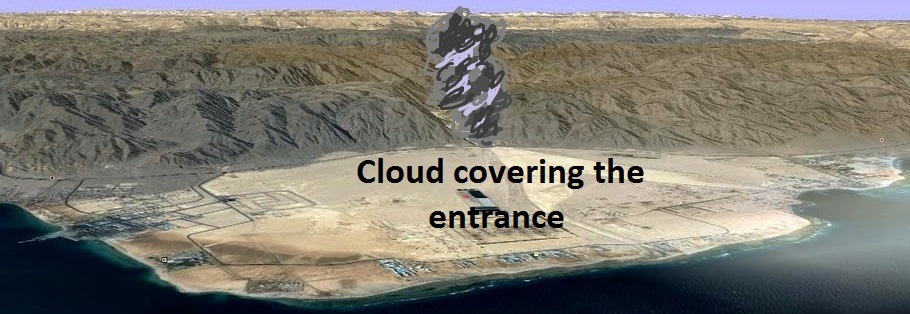
This is an image of an idea of what Pharaoh and his army saw on their end
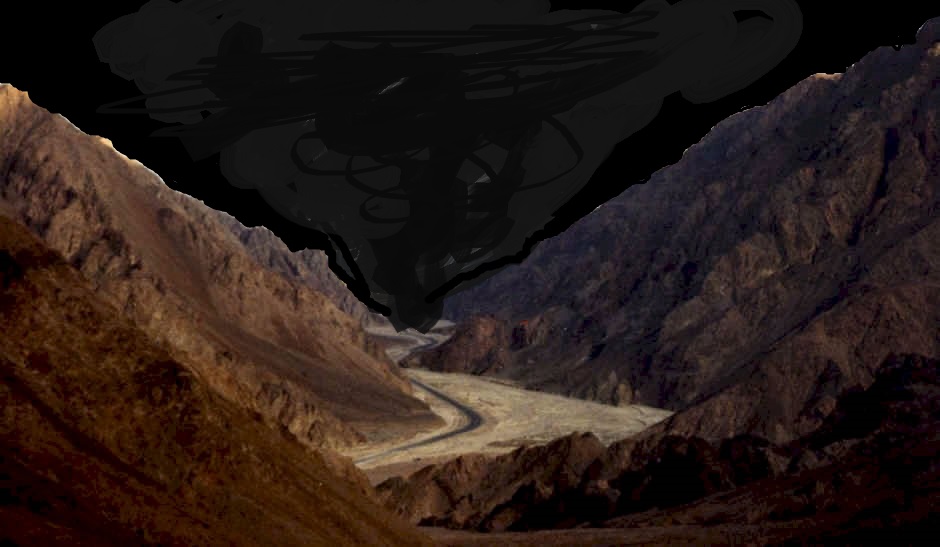
This would be a "dimming version" of an idea what the pillar of the cloud could have looked like lit at night
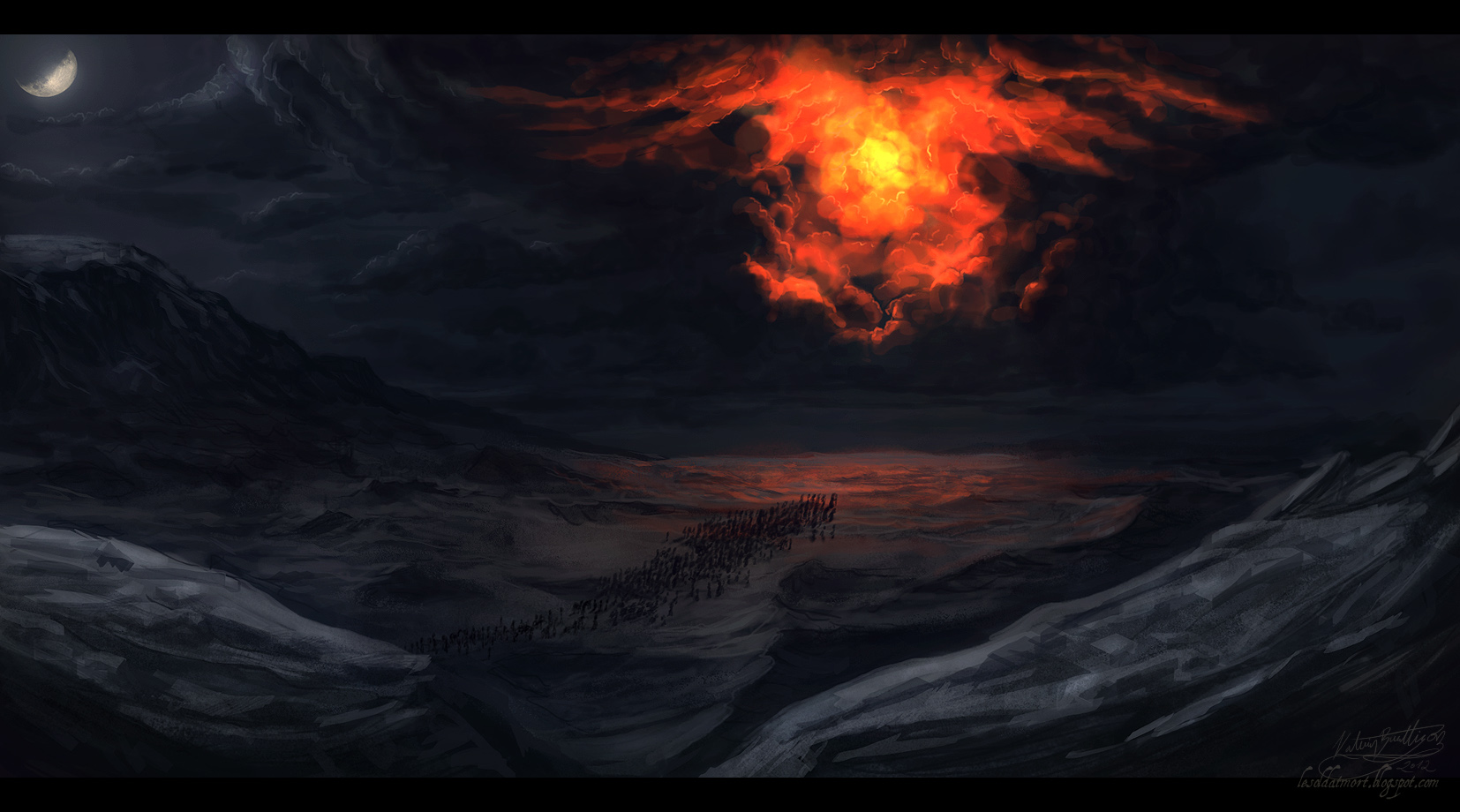
The exception would be that it would have been a lot brighter for the Israelites to see across the sea, which was about ten milies long which I will reveal shortly.
Verse twenty-one
21 And Moses stretched out (stretched forth) ta-his hand over (upon) the sea; and hwhy made go (depart, walked away) ta-the sea on a fierce (harsh, strong) east wind all of the night, and made ta-the sea to dry, and the waters, they broke open (ripped open, zipped open, divided).
This act was not an instant sensation "push back" action where Moses jams down the staff, or holds up his arms and staff, and behold! Instant split pea.... I mean, instant split sea and dry land as the majority of the movies portray it. That is why hwhy said to stretch your hand/staff out over the sea. Unlike Charlton Heston's instant split sea, it lasted for hours "all night". In other words, it was a "slow process". The 1995 Turner movie, "Moses", featuring Ben Kinsley, protrayed it more correctly. I hoped that Moses ate his Matza Wheaties before pulling an "all nighter".
Verses twenty two and twenty three
22 And the Sons of Israel, they came to the midst of the sea on the dry ground: and the waters to them had a wall from their right and from their small (left). 23 And Egypt, they pursued (chased), and they went after them to the midst of the sea, all of the horses of Pharaoh, his chariots, and his horsemen (hoofmen).
The late Ron Wyatt of Ark Discovery International and The Wyatt Family Website noted that the sea is about thirty three meters, which is about 110 feet deep
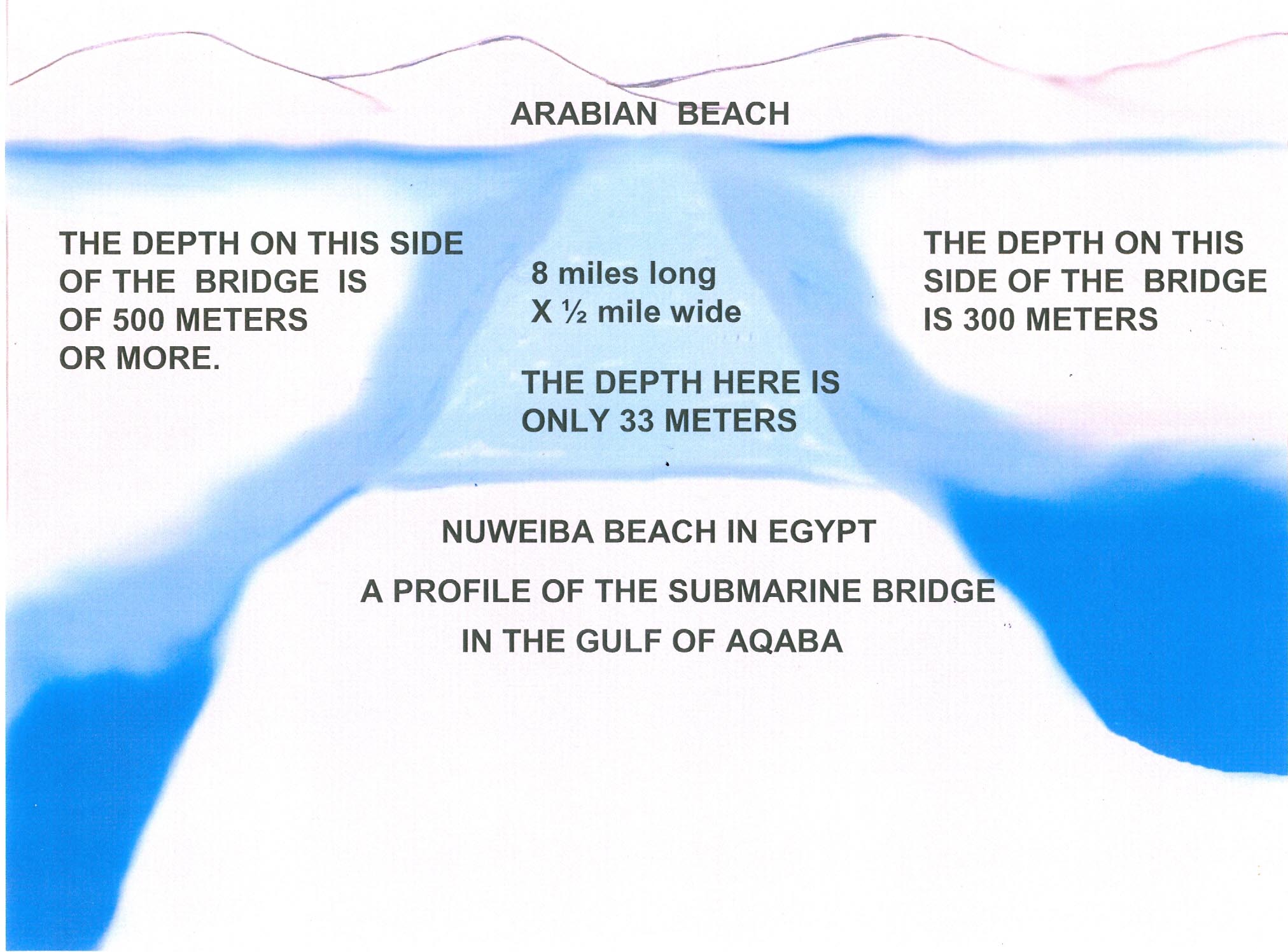
There are other sources that show the Gulf of Aqaba a lot deeper but in a gradual slope
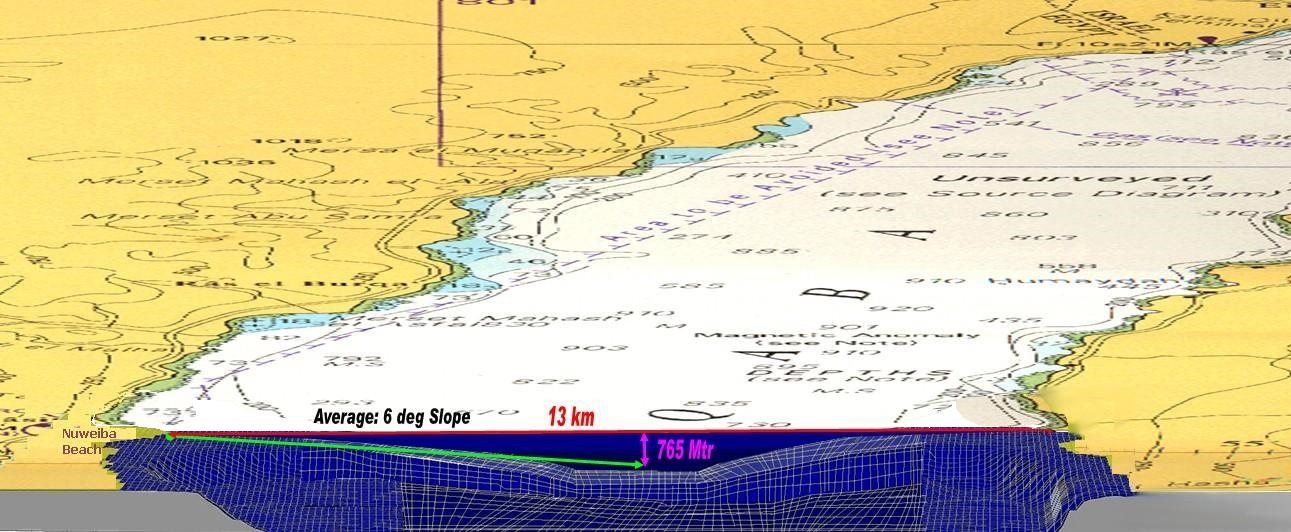
The images below are depth charts of the Gulf of Aquaba between Nuweiba Beach and Saudi Arabia. According to these charts, the depth between the Nuweiba Beach and the beach area at Baal Zephon is the shallowest location
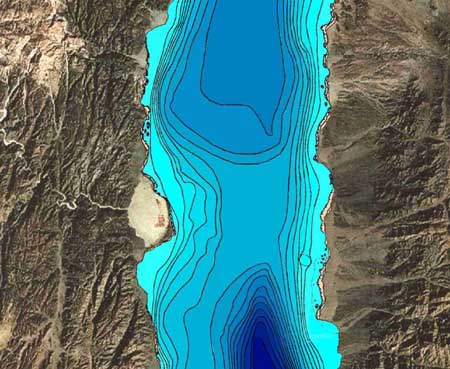
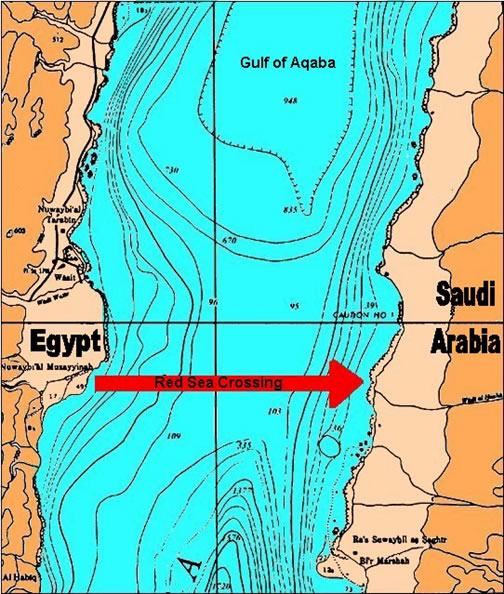
Notice the depths in the upper and lower parts of these charts show that it drops dramatically as much as 1700 feet, but the area where the Gulf is located between Nuweiba Beach and the beach on the other side is located is between 95 and 110 feet, the same depth Ron Wyatt claimed.
Whether it was 110 feet or 765 feet with a gradual slope, it shows that this was a crossable underground bridge.
Based on the distance on the Google maps website, the length of the sea crossing at the Gulf of Aqaba is about ten miles wide
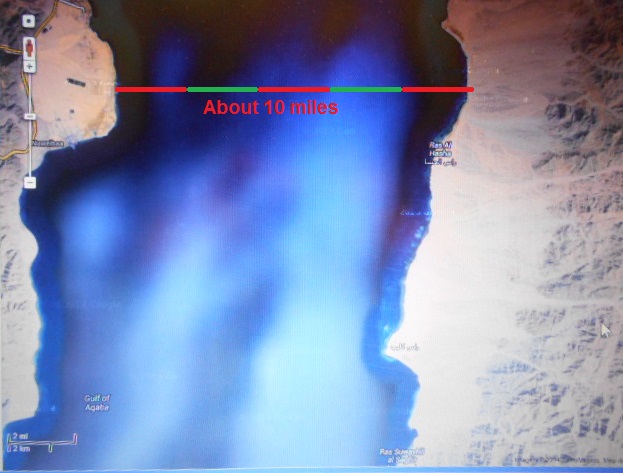
I have seen images and movie scenes showing the Israelite Red Sea crossing as where there were puddles here and there. It was dry as the ground could be. In other words, it was a "dry beach".
Notice in this week's Torah portion passage, it also stated that there was a wall of water to each side of them. This tells us that hwhy did it this way to prevent Israel from looking for an alternate route, or to try to escape from another direction. hwhy provided "the only way" to escape from Pharaoh and his army to take them over to the other side of the Sea in their journey to go the Promised Land. This is compared to Yeshua saying this, which is noted in the Gospel of John
John14:6 Yeshua saith unto him, I am the Way, the Truth, and the Life: no man cometh unto the Father, but by Me.
This applies to us in Messiah who went through "the Only Way" to give us Eternal life. There isn't any other religion (alternate routes) to give us life to the Father, but Yeshua.
Verses twenty four and twenty five
24 And was, in the breaking period (morning) watch (guard), hwhy leaned out (peeped, gazed) to the camp of Egypt in the Pillar of Fire and of the Cloud, and confused (disturbed, discomfited, commotioned) ta the camp of Egypt, 25 And removed ta the wheel (revolving item) from their chariots, and they drove in heaviness (difficulty): and Egypt said, I will flee from the face of Israel; for hwhy is fighting (warring) for them against Egypt.
The morning watch is considered the fourth watch, and it starts at the ninth hour of the night and ending at the twelfth hour of the night, in our terms, between three and six o'clock in the morning. By the time the Israelites started crossing over the Sea, the east wind dried the sea way within nine hours between 6 PM and 5 AM. It is probable that the Egyptian army went in shortly after the Israelites reached the shores safely.
Verse twenty six through through twenty nine
26 And hwhy said to Moses, Stretch out (Stretch forth) ta-your hand over (upon) the sea, and the waters, they will return upon (over) Egypt, over (upon) his chariots, and over (upon) his horsemen (hoofmen). 27 And Moses stretched out (stretched forth) ta-his hand over (upon) the sea, and the sea returned to his permanence (mightiness) to the face of breaking period (morning); and ta-Egypt fled to meet him; and hwhy overthrew (shook off) Egypt in the midst of the sea. 28 And the waters, they returned, and they covered ta-the chariots, and ta-the horsemen (hoofmen), to all of the force (valiant ones) of Pharaoh that were coming into the sea after them; Was not left (remained) among them unto one. 29 And the Sons of Israel, they walked on dry ground in the midst of the sea; and the waters were a wall to them from their right and from their small (left).
The waters returned to their original state when it became daytime, which occurred in the morning, which meant that the sun started to rise. This was a "super miracle".
REVELATION'S RELEVANCE TO THE EGYPTIAN ARMY
This is the equivalent account relating to the end times, which is noted in apostle John's book of Revelation
Revelation 9:13 And the sixth angel sounded, and I heard a voice from the four horns of the Golden Altar which is before hwhy, 14 Saying to the sixth angel which had the trumpet, Loose the four angels which are bound in the great river Euphrates. 15 And the four angels were loosed, which were prepared for an hour, and a day, and a month, and a year, for to slay the third part of men. 16 And the number of the army of the horsemen were two hundred thousand thousand: and I heard the number of them. 17 And thus I saw the horses in the vision, and them that sat on them, having breastplates of fire, and of jacinth, and brimstone: and the heads of the horses were as the heads of lions; and out of their mouths issued fire and smoke and brimstone. 18 By these three was the third part of men killed, by the fire, and by the smoke, and by the brimstone, which issued out of their mouths. 19 For their power is in their mouth, and in their tails: for their tails were like unto serpents, and had heads, and with them they do hurt. 20 And the rest of the men which were not killed by these plagues yet repented not of the works of their hands, that they should not worship devils, and idols of gold, and silver, and brass, and stone, and of wood: which neither can see, nor hear, nor walk: 21 Neither repented they of their murders, nor of their sorceries, nor of their fornication, nor of their thefts.
As I noted before, within the last two weeks of the Torah portions, there have been comparisons to some of the plagues in Egypt with the plagues in the book of Revelation, and there is another comparison with this 200 million man army from the Euphrates River. As Brad Scott of Wildbranch Ministry and Bill Cloud of Shoreshim Ministries, and other Hebraic Roots/Messianic teachers say "The end is revealed from the beginning". These accounts from the Ten Plagues and the Exodus story reveal things that will occur in the end times. It doesn't mean that it will occur in the same time line, but it shows that it will happen again. As Brad Scott of Wildbranch Ministry and Bill Cloud of Shoreshim Ministries noted "History repeats itself".
Verses thirty and thirty-one
30 And hwhy saved ta-Israel in that day from the hand of Egypt; and Israel saw ta-Egypt was dead upon the lip of the sea. 31 And Israel saw ta-the Great Hand which hwhy did against Egypt: and the People, they revered (awed, feared) hwhy, and they believed in hwhy and in Moses, His servant.
The Israelites most likely saw the dead Egyptians washed up along the shorelines, and this could have included Pharaoh, possibly Apeppi, King of Egypt. If the Egyptians were able to find him, they would have embalmed him before his body started to deteriorate.
I have heard of stories from believers saying that the swords miraculously floated on the surface of the waters. I would have to disagree with this notion, unless it was Biblically proved without Rabbinical sources.
Mark Biltz of El Shaddai Ministries noted a connection with the army being drowned to the account, which is noted in the Torah portion of Sh'moth, in the book of Exodus
Exodus 1:22 And Pharaoh commanded to all of his people, to say, Any of the son that are birthed, you will cast him to the river, and every daughter you will keep alive.
Mark connected this as hwhy's act of "measure for measure". Pharaoh drowned the Hebrew males in the river, and hwhy repayed Pharaoh, though not the same Pharaoh, by drowning the army of men in the river. Thank you Mark.
Also, based in my teaching The Exodus Story, I gave two possible theories of when the Israelites arrived at the Sea of Reeds and when they crossed over. They definitely left on the fifteenth day of Aviv/Nissan, which is noted in the Torah portion of Masei, in the book of Numbers
Numbers 33:1 These are the journeys of the Sons of Israel, whom they went out from the land of Egypt, by their armies, on the hand of Moses and Aaron, 2 and Moses wrote ta-their outgoings, by their journeys, upon the Mouth of hwhy: and these are their journeys, by their outgoings. 3 And they pulled up (journeyed) from Rameses in the first renewed month, on the five ten (fiveteen, fifteenth) day of the first renewed month; after the Passover, the Sons of Israel, they went out on a high hand to the eyes of all of the Egyptians. 4 And Egypt was burying ta whom hwhy had struck among them: every firstborn, and on their elohim, hwhy executed (did, made) Judgments.
One theory says they arrived by the end of the sixth day, Aviv/Nissan 20, of Unleavend Bread, and crossed over on the morning of the seventh day of Unleavned Bread, Aviv/Nissan 21, and Pharaoh's army died.
The other theory is based on what Moses said, which is noted in the Torah portion of Sh'moth, in the book of Exodus
Exodus 3:18 And they will listen to your voice: and you shall come, you and the Elders of Israel, to the king of Egypt, and you shall say to him, hwhy, Elohim of the Hebrews, has met upon us: and now, we will go now a way of three days in the wilderness, and we will sacrifice to hwhy, our Elohim.
Exodus 5:3 And they said, the Elohim of the Hebrews has met upon us: We will go now a way of three days in the wilderness, and we will sacrifice to hwhy, our Elohim; lest shall impinge (entreat) us on the plague or on the sword.
This theory says they arrived by the end of the third day, Aviv/Nissan 17, of Unleavend Bread, and crossed over on the morning of the fourth day of Unleavned Bread, Aviv/Nissan 18, and Pharaoh's army died. The crossing would have also occurred on the first day of the counting of the fifty days to Shavuoth, on the day of First Fruits when the Omer-Sheaf is given.
If the theory works, this three days journey would align with the account of Jonah in the belly of the whale for three days and nights, which is noted in the book of the prophet Jonah
Jonah 1:17 Now hwhy had prepared a great fish to swallow up Jonah. And Jonah was in the belly of the fish three days and three nights.
Yeshua made note of this account, which is noted in the Gospel of John
Matthew 12:40 For as Jonas was three days and three nights in the whale's belly; so shall the Son of Man be three days and three nights in the heart of the earth.
Yeshua fulfilled this by being buried in the tomb for three days and nights, on the first three days of the Feast of Unleavened Bread and resurrected on the Biblical day of First Fruits, the fourth day of Unleavened Bread, on the first Biblical day of the Biblical week, in the beginning of Saturday night, on the Biblical Omer-Sheaf, which began the counting of the fifty days to the Biblical Harvest Feast of Shavuoth, or Pentecost.
This is a chart showing the comparison of the times lines between Moses and the Israelites leaving Pharaoh to the crossing of the Gulf of Aqaba at Nuweiba Beach, and between Yeshua's crucifixion to His resurrection
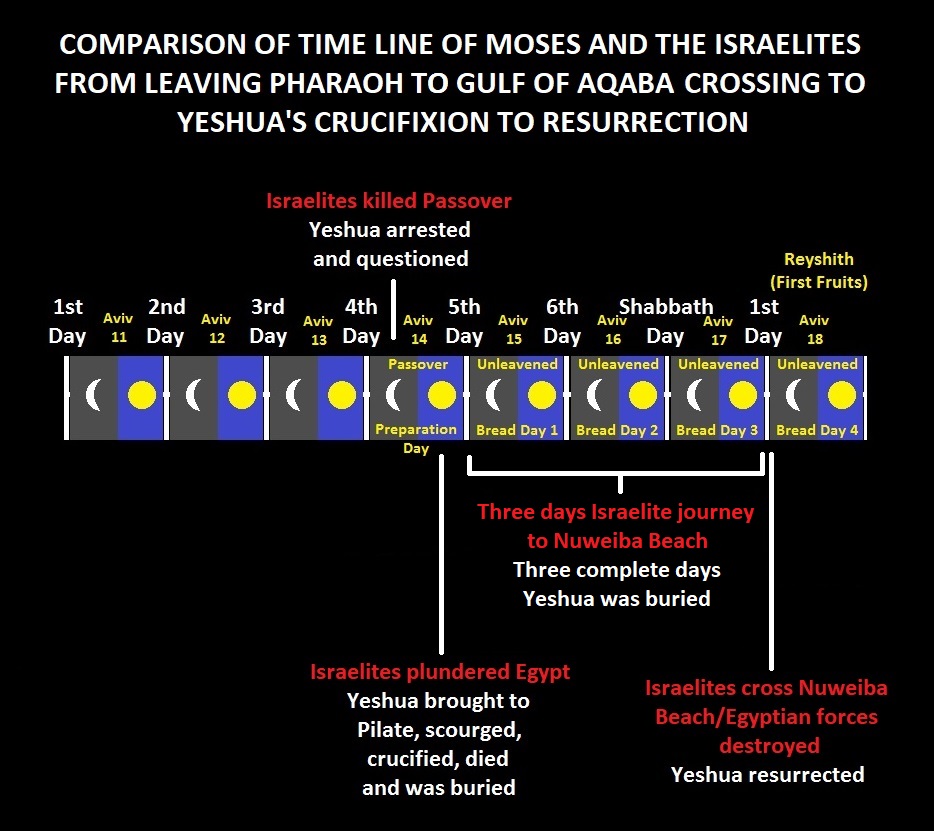
The team of the late Ron Wyatt of Ark Discovery International and The Wyatt Family Website found at the sea floor, off Nuweiba Beach, remnants of chariot wheels and axles covered in coral, where coral is not found anywhere else, as well as finding bones and horse hoofs along the sea bed. His organization has recorded hours of video showing these chariot wheels and axles. These are examples of images of these chariot wheels and axles
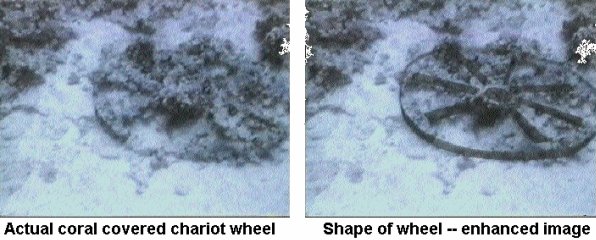
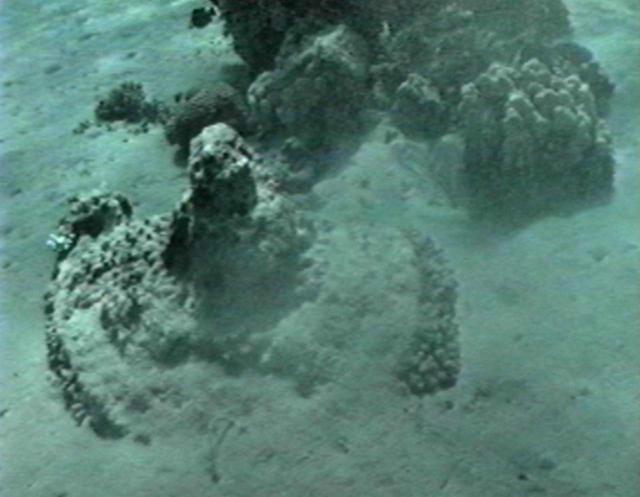
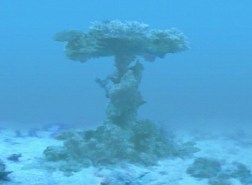
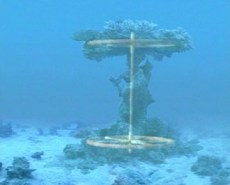
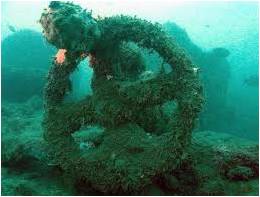
It is probable that this was one the 6oo choice chariot wheels, because it is gold and silver. These metals cannot be attached by coral as the remnants of this wheel is shown below
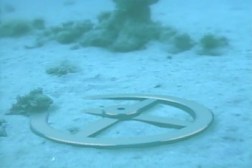
Ron Wyatt's team also found human bones in the sea
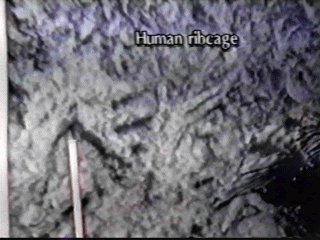
They also found horse hooves. This is one of them that shrank over seventy percent
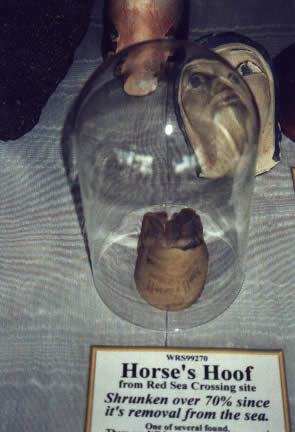
I have yet to see someone show proof of multiple amounts of chariot wheels, bones, and horse hoofs found in the other theoretical locations other than what Ron Wyatt and his crew found off Nuweiba Beach.
You can find the website by clicking on the link below to get to the webpage.
www.arkdiscovery.com
This is a revelation I have yet to hear from anyone as of January 22, 2018, and I give the glory to hwhy for revealing this to me.
Looking at the name of the water location of what is called "the Gulf of Aqaba". If one notices the name "Aqaba" there is a Hebrew word similar to that name, it is the Hebrew word "Eykev"- Ayin, Quph, Bet (bqe). It is translated "heel". I give Bill Cloud of Shoreshim Ministries credit for this part of the information. There is an account with the heel, which is noted in the Torah portion of Toldoth, in the book of Genesis
Genesis 25:21 And Isaac intreated (interceded, prayed) to the hwhy for the behalf of his wife, for she was barren: and hwhy intreated (interceded) to him, and Rebekah his wife, she conceived. 22 And the sons struggled together in her nearness; and she said, If is so, to why am I of this? And she went to inquire (ask) ta-hwhy. 23 And hwhy said to her, Two nations are in your womb, and two of peoples shall break out from your belly; and a community shall be mightier than (from) a community; and the elder shall serve the younger. 24 And her days to birth, they were fulfilled, and behold, twins were in her womb. 25 And the first came out, all of him of red, like a robe of hair; and they called his name Esau. 26 And after thus, his brother came out, and his hand was holding on the heel of Esau; and his name was called Jacob: and Isaac was a son of sixty years in birthing them.
The younger son bore Esau's heel on his hand, hence his name became Jacob, in Hebrew it is "Yah-ah-kohv"- Yod, Ayin, Kuph, Bet (bqey), and according to Bill Cloud, the Yod in Paleo-Hebrew is a picture of a "hand", hence Jacob's name means "Hand on the Heel".
This is the $64,000 question: "Is the name "Aqaba" a play of, or named in an altered way, after the Israelites patriarch "Jacob", and if so, does this give more concrete evidence that this gulf was named after the patriarch which the Israelites crossed over"? I would give it a super strong:
YES!!!
They were actually calling the Red Sea "the Gulf of Jacob".
!!!!!hwhy Kl dbk
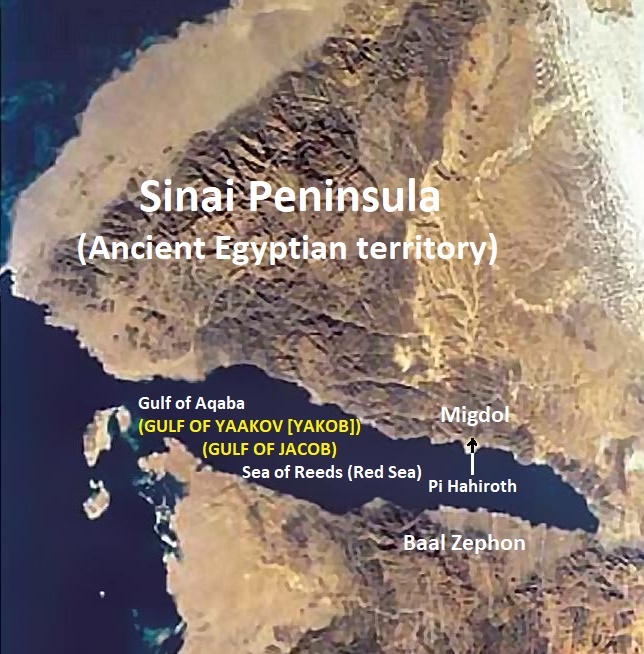
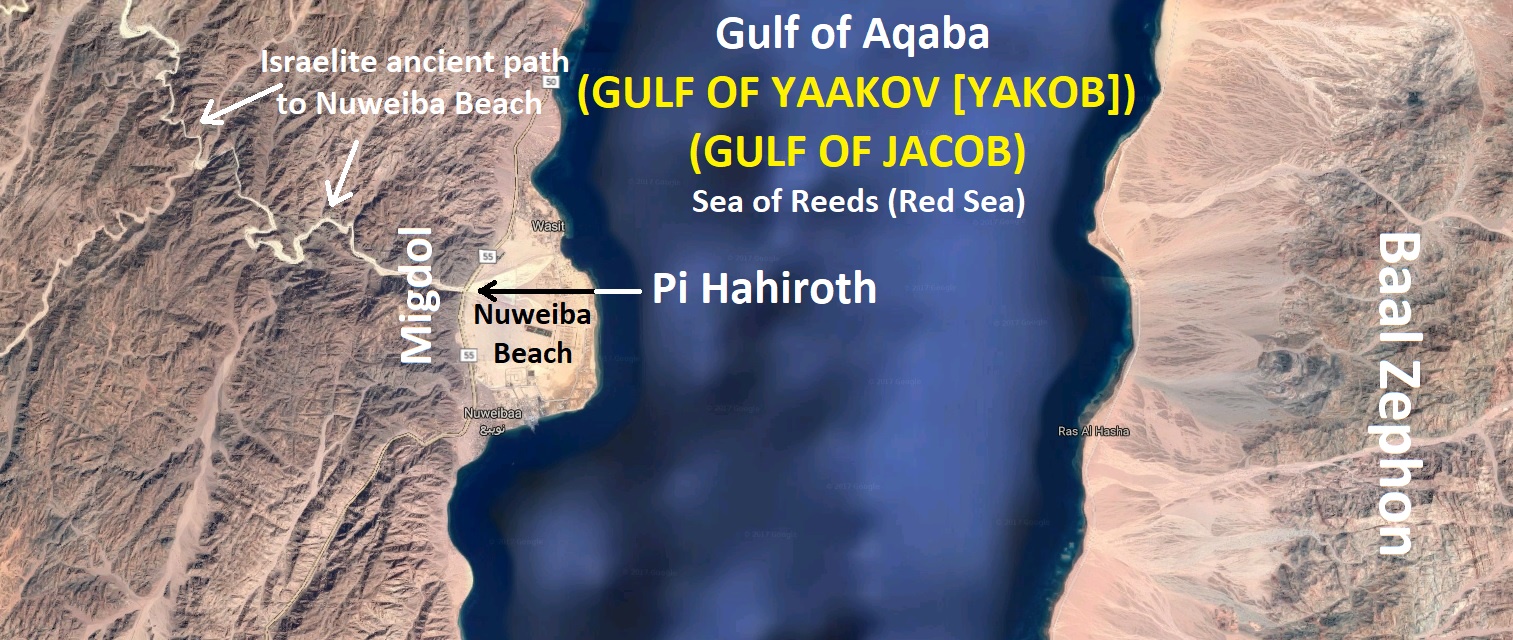
For further study, you can read my teaching, titled "The Exodus Story" in relevence to the feasts of Passover and Unleavened Bread by clicking on the link below to get to the webpage.
THE EXODUS STORY
CHAPTER 15
Exodus 15:1-27
Exo 15:1 Then Moses and the Sons of Israel sang ta-this song to hwhy, and they said, to say,
I will sing to hwhy, for Triumph triumphed:
the horse and his rider (chariot) were hurled (thrown) in the sea.
2 Yah is my Prevailer (Strength, Stout), and Song,
and has become to me for Salvation:
This is my El, and I will make habitation (home, ?settle?, satisfaction) at Him;
the Elohim of my father, and I will raise (exalt) Him.
3 hwhy is a Man War:
hwhy is His Name.
4 The chariots of Pharaoh and his force (valiant ones) were flowed (instructed) in the sea:
and from the chosen of his three rankers (third rankers), they were drowned (had sank) in the Sea of Reeds [(Yam Suph, Reeds Sea)].
5 The deep covered (concealed) them:
they descended (went down) in the abyss (deep, depths, bottom), like (as) him of a stone.
6 Your Right One, hwhy, is glorious (magnificent) in the power:
Your Right One, hwhy, has dashed in pieces the enemy.
7 And in abundance (much) of Your Triumph, You have overthrown (pulled down) Your arisers:
You sent out (sent forth) Your Wrath (Fierceness), shall consume him like the stubble (straw).
8 And in the spirit (blast, wind burst) of Your Nostrils, the waters, they piled up,
the flowing waters, they stood like him of waves (mounds, heaps),
and the depths (distillings, drippings, flowings, tricklings), they were congealed in the heart of the sea.
9 The enemy said, I will pursue (chase), I will overtake (attain, reach),
I will distribute the spoil; My soul, she shall be filled with them;
I will draw my sword; My hand, she shall dispossess (disoccupy, expel, impoverish) them.
10 You blew on Your Wind (Spirit), the sea covered (concealed) them:
they sank (tumbled) like the lead in the wide (gallant, expanded, mighty) waters.
11 Who is like You, hwhy, among the els?
Who is like You, glorified (magnified) in Sacredness (Holiness),
revering (awing, fearing) in praises, Doer (Worker) of Miracles (Wonders)?
12 You stretched out (stretched forth) Your Right,
the Earth, she swallowed them.
13 You in Your Kindness you guided (led) this People [(the People wherin)] You have redeemed,
You have flowed (conducted) in Your Boldness to Your Sacred (Holy) Habitation (Settlement).
14 Peoples, they had heard, they quivered (were quakened):
sorrow (pangs) had seized (held) the dwellers of Philistia (Pelasheth).
15 Then the chiefs of Edom, they were trembled;
the potency (mighty) of Moab, they were seized (held) shuddering;
all of the dwellers of Canaan, they melted (dissolved).
16 Fright (Horror) and the dread, she shall fall upon them;
in the greatness of Your Arm, they shall be quiet (dumb, still) like the stone;
Until Your People go over, hwhy,
Until this People [(the People wherin)] go over You have bought (purchased).
17 You shall bring them,
and You shall plant (fastened, fix) them in the mountain of Your Inheritance,
An Erected Place (Established Place), hwhy, You have made for Your Dwelling,
A Sanctuary, Adonai, Your Hands have erected.
18 hwhy shall reign for ages and until [(for ever and ever)].
19 For the horses of Pharaoh among his chariots and among his horsemen (hoofmen) had gone in the sea, and hwhy returned ta-the waters of the sea over (upon) them; and the Sons of Israel, they went on the dry ground in the midst of the sea.
20 And Miriam, the prophetess, sister of Aaron, she took ta-the tambourine (timbrel) in her hand; and all the women, they went out after her on tambourines (timbrels) and in twirl dances. 21 And Miriam, she answered to them,
Sing to hwhy, for Triumph triumphed;
the horse and his rider (chariot) were hurled (thrown) in the sea.
22 And Moses pulled up (journeyed) Israel from the Sea of Reeds [(Yam Suph, Reeds Sea)], and they went out to the Wilderness of Shur; and they went three days in the wilderness, and they did not find water.
23 And they came to Marah, and they were not able to imbibe (drink) the waters from Marah, for they were bitters: Upon thus, her name was called Marah. 24 And the People, they murmured upon (over) Moses, to say, What shall we imbibe (drink)?! 25 And cried to hwhy; and hwhy taught (instructed, pointed out, showed) him a tree, and was sent (cast, thrown) to the waters, and the waters, they became sweet: There was set for him a Statute and an Ordinance, and there, they were tested (tempted, tried, proved), 26 and said, If listening, you will listen to the Voice of hwhy, your Elohim, and you will do the uprightness [(that is upright)] in His Eyes, and the giving of your ear [(that you will give ear)] to His Commandments, and you will guard (keep, observe, watch) all of His Statutes, All of the diseases (sicknesses, infirmities, weaknesses) which I have put (set) on Egypt, I will not put (set) them upon (over) you: for I am hwhy, your Healer.
27 And they came to Elim, and there were two ten (twoteen, twelve) eye-wells of water, and seventy palm trees: And they camped there upon (over) the waters.
(NOTE: Not all verses will have comments)
VERSES ONE THROUGH EIGHTEEN
THE SONG OF MOSES
A good part of these verses reveal to us, as Brad Scott of Wildbranch Ministry, Bill Cloud of Shoreshim Ministries, and other Hebraic Roots teachers say, that history will repeat itself.
Verse one
1 Then Moses and the Sons of Israel sang ta-this song to hwhy, and they said, to say,
I will sing to hwhy, for Triumph triumphed:
the horse and rider (chariot) were hurled (thrown) in the sea.
"Triumph" is "Yeshua" who triumphed over Pharaoh and his armed forces.
Mark Biltz of El Shaddai Ministries noted that it should say in the beginning of this week's Torah portion passage that Moses and the Sons of Israel "will sing" the song, meaning that it is a "future event". Well, looking at the next part of the section of the sentence, it say that they "spoke, to say". How can they sing and speak at the same time, unless they had Bob Dylan with them teaching them to sing in "sprechstimme" style, meaning singing in a talking style, in between talking and singing :) .
Verse seven
7 And in much of Your Triumph, You have overthrown (pulled down) Your arisers:
You sent forth Your Wrath, shall consume him like the stubble (straw).
Looking at the word THROWN
In verse seven, the Hebrew word for overthrown is "hah-rahss"- Heh, Resh, Samek (orh). It is from Strong's Concordance number 2040, and its definition
A primitive root; to pull down or in pieces, break, destroy: - beat down, break (down, through), destroy, overthrow, pluck down, pull down, ruin, throw down, X utterly.
This is where we get our modern English word "harass".
Verse seventeen
17 ...An erected (established) Place, hwhy, You have made for Your Dwelling,
A Sanctuary, Adonai, Your Hands have erected.
This week's Torah portion passage reveals to us that this is a future event, not in the near future in this People's time, but when the Temple of hwhy was built by King Solomon, which is noted in the book of the Kings
1 Kings 7:51 So was ended all the work that King Solomon made for the House of hwhy. And Solomon brought in ta-the Holy Things which David, his father, had dedicated; even ta-the silver, and ta-the gold, and ta-the Vessels, did he put among the treasures of the House of hwhy.
Comparing this song to another song of Moses, which is noted in the Torah portion of Ha'Azinu, in the book of Deuteronomy
Deuteronomy 32:1 The Heavens, give the ear, and I will speak;
and the Earth, you shall hear the Sayings of My Mouth.
2 My Doctrine shall drip as the mater-rain,
My Sayings shall distill (trickle) as the dew,
as the drizzling rains (hairyish rains) upon the sprouts (tender grass),
and as the showers upon the herbs (grass):
3 for I will call out (proclaim) the Name of hwhy:
will ascribe (bring) greatness to our Elohim.
4 The Cliff Rock, His Work is perfect:
for all of His Ways are just:
Is an El of Truth and without evil,
He is righteous and upright.
5 Has corrupted (wasted, ruined) to Himself?,
No! His sons are their blemish:
Are a crooked (distorted) and twisted (tortuous) generation,
6 Do you repay this to hwhy?
A foolish and a non-wise People?,
Is that not He, your Father, had bought you?
He did (made) you and established you!
7 Remember the days of ages,
understand (consider) the years of generation and the generation:
ask your father, and shall tell you;
your Elders, and they shall say to you.
8 The Most High is among the inheritance of the nations,
in His dividing the sons of Adam,
stations (having stand) the boundaries of peoples
to the enrollment (scroll, number) of the Sons of Israel.
9 For the Portion of hwhy is His People;
the measuring line (measuring rope) of Jacob is His Inheritance.
10 Had found him in a wilderness land,
and in the emptiness of a howling area;
had surrounded (encircled) him and instructed him,
they enbranched (kept) him as the Pupil (Little Man) of His Eye.
11 As an eagle stirring (awakening) his nest,
hovering (fluttering) over (upon) his nestling,
spreads out His Wings, takes him,
bears (carries, lifts up) him upon His Feathers:
12 hwhy alone guides (leads) him,
and a foreign el is not with him
13 Has Him ride upon the high areas of the Earth,
and eats the produce of the fields;
and has him suck honey (thickness) from the lofty rock,
and oil from the flinty cliff rock;
14 curds (cheese, butter) of herds,
and khalav-milk of flocks,
with kheylev-fat of battering rams,
and rams of the sons of Bashan,
and he-goats (matured goats, full grown goats),
with the kheylev-fat of the kidneys of wheat;
and of the blood of the grapes,
you shall drink fermented wine.
15 And Jeshurun grew oily fat (shiny fat, waxed fat), and was trampling (kicking, despising):
you grew oily fat (shiny fat, waxed fat), thick (dense), plump;
and smit (forsook, pounded) Elohah had did (made) him,
and disgraced the Rock of his Salvation,
16 made Him jealous among strangers (sojourners),
provoked Him among abominations.
17 They sacrificed to goat-demons, not Elohah;
elohim they had not known,
new ones drawing near, came,
your fathers were not shivering.
18 You were unmindful of the Cliff Rock birthing you,
and you have forgotten El shaping you.
19 And hwhy saw, and was scorned (despised)
was provoked of His Sons and of His Daughters.
20 And said, I will hide My Face from them,
I will see what their latter days shall be:
for they are a changing (tumbling, froward, fraud) generation,
are sons having no faith (faithfulness) in them.
21 They have made Me jealous against a non-el;
they have made Me provocative (indignant) in their vanities:
and I will make them jealous among (in) a non-people;
I will make them provocative (indignant) among (in) a foolish nation,
22 for a fire is inflamed in My Anger,
and she shall hearth burn (burn, kindle, continuously burn) unto the lowest of Sheol,
and she shall consume the Earth and her produce,
and she shall scorch (make ablaze, lick) the foundations of the mountains.
23 I will add (augment, accumulate, scrape) evils upon them;
I will consume My arrows on them,
24 exhausted (sucked out) of hunger (famine),
and fed (overcome, warred out) of burning heat (burning coals),
and bitter ruin:
And I will send the teeth of animals on them,
with the heatish venom of crawling things (worms) of the dust,
25 the sword, she shall bereave (abort?) from without,
and terror (fright) from within (inclosure, innermost),
also the chosen young male,
also the virgin,
the suckling,
with the man of old age (gray hairs).
26 I said, I will puff them [(scatter them to corners)],
I would make her cease (desist) from the mortal men their memory (remembrance):
27 unless I sojourn aside (turn aside) the provocation of the enemy,
lest their afflictors (distressors, adversaries, crampers) should scrutinize (disregard, ?be foreignized?),
lest they shall say, Our hand is arisen (high),
and not hwhy has performed (made) all of this,
28 for they are a nation void (wandered away, lost) of counsel,
and have no understanding in them.
29 Unless (To Him?) they are wise, they would consider (be prudent of, be skillful of) this,
they would understand to their latter days.
30 How should one pursue (chase) a thousand,
and two shall flee ten thousand,
if not that their Cliff Rock sold them,
and hwhy delivered them up (shut them up)?
31 For their cliff rock is not like our Cliff Rock,
and our enemies magistrates (intreators, supplicators),
32 for their vine is from the vine of Sodom,
and from the fields of Gomorrah:
their grapes are grapes of gall (hemlock),
for them are clusters of bitters:
33 The heatish venom of monsters (dragons, sea monsters, sea dragons) are their wine,
and cruel asps are their gall (hemlock, poison).
34 Is he not stored up (laid in store) with Me,
sealed up (closed up) among My Treasures (Depositories)?
35 Vengeance and recompence (restitution) belongs to Me;
by the time their foot, she shall slip (waver, shake, slide):
for the day of their calamity (misfortune, raking) is near,
and the future (preparation) shall be hastened (prepared).
36 For hwhy shall judge His People,
and shall have compassion unto His Servants,
for shall see that the power-hand has went away (disappeared),
and the detained and the forsaken shall remain (held back, withheld, inclosed)
[(and has ceased the inclosed (detained) and the forsaken)],
37 and shall say, Where are their Elohim,
the Cliff Rock in Him they have made refuge,
38 of which the kheylev-fat of their Sacrifices they ate,
and drank the wine of their Drink Offerings (Libation Offerings)?
They shall arise and shall help you,
and shall be a hiding place upon you.
39 See now, for I, I am He,
and is no elohim with Me:
I, I will make die, and I will make alive;
I will wound (strike, pierce), and I, I will heal:
and no one (is none) from My Hand shall deliver.
40 For I will lift up My Hand to the Heavens,
and I will say, I live for ages.
41 If I sharpen (whet, point) My Flashing (Lightning) Sword,
and My Hand, She siezes (takes hold) on judgment (Ordinance);
I will return (render) vengeance to My distressors (vexers, opponents),
and I will repay to My haters.
42 I will make My Arrows drunk with blood,
and My Sword, she shall devour (eat, consume) flesh;
from the blood of the slain and the captives,
from the head of the hairs (locks) of the enemy.
43 Shout aloud (rejoice), nations of His People!
For will avenge the blood of His Servants,
and will return (render) vengeance to His distressors (vexers, opponents),
and will atone His Ground, His People.
There is another song of Moses, which is noted in the apostle John's book of Revelation
Revelation 15:1 And I saw another sign in the heavens, great and marvellous, seven angels having the seven last plagues; for in them is filled up the Wrath of hwhy. 2 And I saw as it were a sea of glass mingled with fire: and them that had gotten the victory over the beast, and over his image, and over his mark, and over the number of his name, stand on the sea of glass, having the harps of hwhy. 3 And they sing the song of Moses, the servant of hwhy, and the song of the Lamb, saying,
Great and marvellous are Thy Works, hwhy, El Shaddai;
just and true are Thy Ways, Thou King of Saints.
4 Who shall not fear Thee, hwhy,
and glorify Thy Name?
For Thou only art Holy:
for all nations shall come and worship before Thee;
for Thy Judgments are made manifest.
These words of the song of Moses in the book of Revelation are not mentioned in the previous two songs of Moses in this week's Torah portion and in the book of Deuteronomy. It is strongly probable that Moses wrote a "third song" in the heavens.
Verse nineteen
19 For the horse of Pharaoh on his chariots and on his horsemen (hoofmen) went in the sea, and hwhy returned ta-the waters of the sea over (upon) them; and the Sons of Israel, they went on the dry ground in the midst of the sea.
This week's Torah portion verse is a summary to why the song was written and sung.
Verses twenty and twenty-one
20 And Miriam, the prophetess, sister of Aaron, she took ta-the tambourine in her hand; and all the women, they went out after her on tambourines and in dances. 21 And Miriam, she answered to them,
Sing to hwhy, for Triumph triumphed;
the horse and his rider (chariot) were hurled (thrown) in the sea.
This is the first time in the Bible that a female was called "a prophet", and it was Miriam. This was the only point in time that she was considered a prophet. There are those that say it was Miriam's song. Wrong. It was the song of Moses that she was singing. At that moment, she bore the trait of her ancestor, Abraham, who was the first prophet, which is noted in the Torah portion of Vay-Yeryra, in the book of Genesis
Genesis 20:7 And now, restore the wife of the man; for he [Abraham] is a prophet, and will pray in unto you, and live: and if you do not with restoring, know that dying, you shall die, you, and all that belongs to you.
There were other female prophets noted throughout the Tanakh
Judges 4:4 And Deborah, a prophetess, the wife of Lapidoth, she judged Israel at that time.
2 Kings 22:14 So Hilkiah the Priest, and Ahikam, and Achbor, and Shaphan, and Asahiah, went unto Huldah, the prophetess, the wife of Shallum, the son of Tikvah, the son of Harhas, keeper of the wardrobe; (now she dwelt in Jerusalem in the college;) and they communed with her.
2 Chronicles 34:22 And Hilkiah, and they that the king had appointed, went to Huldah, the prophetess, the wife of Shallum, the son of Tikvath, the son of Hasrah, keeper of the wardrobe; (now she dwelt in Jerusalem in the college:) and they spake to her to that effect.
Nehemiah 6:14 My Elohim, think thou upon Tobiah and Sanballat according to these their works, and on the prophetess Noadiah, and the rest of the prophets, that would have put me in fear.
This also shows that one of the prophetess was married. hwhy was showing us that a prophetess can be a wife to a husband.
In the Brith Khadashah (the New Covenant), there was a prophetess during the time of Yeshua's birth, which is noted in the Gospel of Luke
Luke 2:36 And there was one Anna, a prophetess, the daughter of Phanuel, of the tribe of Asher: she was of a great age, and had lived with an husband seven years from her virginity; 37 And she was a widow of about fourscore and four years, which departed not from the Temple, but served hwhy with fastings and prayers night and day. 38 And she coming in that instant gave thanks likewise unto hwhy, and spake of him to all them that looked for redemption in Jerusalem. 39 And when they had performed all things according to the Torah of hwhy, they returned into Galilee, to their own city Nazareth.
Anna must have been at least 107 years old in this account, because seven years of her marriage plus the eighty four years of her widowhood was ninety-one years. She had to be at minimum sixteen years old at the time of her marriage.
In this week's Torah portion passage, how come Moses wasn't mentioned as Miriam's other brother? Why did hwhy leave him out? Was it because Moses was set apart from the family? Yet, all of the sudden, she became a prophetess. Where was Aaron? Why wasn't he also called a prophet? Why didn't he get involved in the "family of prophets"? I don't have answers to these questions at this time.
Verse twenty two
22 And Moses pulled up (journeyed) Israel from the Sea of Reeds, and they went out to the Wilderness of Shur; and they went three days in the wilderness, and they did not find water.
Looking at the word SHUR
The Hebrew word for Shur is "Shoor"- Shin, Vav, Resh (rws). It is from Strong's Concordance number 7793, and its definition
The same as H7791; Shur, a region of the Desert: - Shur.
from 7791 "shoor" (rws), and its definition
From H7788; a wall (as going about): - wall.
from 7788 "shoor" (rws), and its definition
A primitive root; properly to turn, that is, travel about (as a harlot or a merchant): - go, sing. See also H7891.
from 7891 "shoor" (rws), and its definition
The second form being the original form, used in (1Sa_18:6); a primitive root (rather identical with H7788 through the idea of strolling minstrelsy); to sing: - behold [by mistake for H7789], sing (-er, -ing man, -ing woman).
Shur means "turn" or "travel"
This wilderness would be called "the Wilderness of Travel", because there was no water anywhere for anyone to stop, rest and drink.
This is like us in our spiritual walk with hwhy, where we travel and couldn't find any water- symbol of the Ruakh HaKodesh (the Holy Spirit), but we have to keep traveling, because we have no point to stop, or we can't stop until we get to that point of finding the Living Water for our souls, which is based in the Gospel of John, which I noted in chapter thirteen of this week's Torah portion.
Verses twenty three through twenty six
23 And they came to Marah, and they were not able to drink the waters from Marah, for they were bitters: Upon thus, her name was called Marah. 24 And the People, they murmured upon (over) Moses, to say, What shall we drink? 25 And cried to hwhy; and hwhy showed (pointed out, instructed, made see) him a tree, and was cast (thrown) to the waters, and the waters, they became sweet: There was made for him a Statute and an Ordinance, and there, they were tested (tempted), 26 and said, If listening, you will listen to the Voice of hwhy, your Elohim, and you will do that is upright in His Eyes, and you will give ear to His Commandments, and you will keep all of His Statutes, All of the diseases (sicknesses) which I have put on Egypt, I will not put upon (over) you: for I am hwhy, your Healer.
This was the Israelites' first temptation against hwhy and Moses, after crossing through the Wilderness of Shur when they did not find any water, and they are starting to get impatient not being quenched from their thirst.
We as believers in Yeshua have experienced "spritual thirst", and come to this point of "spiritual bitterness". This is were we get tested in our spirits to see if we will subject to bitterness. I admit, it is not easy, but we need to go to Abba hwhy to ask Him to help us when we get at this point in our spiritual lives in our walk with Him, and tell Him we can't do it alone.
Based on the dates so far, up to this point in this passage, three days after the fourth day of the Feast of Unleavened Bread, the eighteenth day of Aviv, adding three days to this point would take the time line to the seventh day of the Feast of Unleavened Bread, on the twenty-first day of Aviv.
Looking at the word MARAH
The Hebrew word for Marah is "Mah-rah"- Mem, Resh, Heh (hrm). It is from Strong's Concordance number 4785, and its definition
The same as H4751 feminine; bitter; Marah, a place in the Desert: - Marah.
from 4751 "mahr" or "mah-rah" (rm or hrm), and its definition
From H4843; bitter (literally or figuratively); also (as noun) bitterness, or (adverbially) bitterly: - + angry, bitter (-ly, -ness), chafed, discontented, X great, heavy.
from 4843 "mah-rahr" (rrm), and its definition
A primitive root; properly to trickle (see H4752); but used only as a denominative from H4751; to be (causatively make) bitter (literally or figuratively): - (be, be in, deal, have, make) bitter (-ly, -ness), be moved with choler, (be, have sorely, it) grieved (-eth), provoke, vex.
Marah means "bitter".
It isn't clear where Marah is located at this time, but it is now known that it is in the land of Midian, which is today in eastern Saudi Arabia.
hwhy did not respond by supernaturally changing the bitterness of the water to sweet, and then said the word "OK the water is fine now", but he directed Moses to a tree. Why a tree? Moses put it in the water and it became sweet. Though it is a futuristic event, I think this verse gives a good basis for what a tree does that Moses used, which is noted in the apostle John's book of Revelation
Revelation 22:2 ...and the leaves of the tree were for the healing of the nations.
Though it is in the future, hwhy used the tree, plus the leaves on that tree, to heal the bitterness in the waters and they became sweet.
Indirectly related, Yeshua is called "the Tree of Life. The tree that Moses used is also symbolic of Yeshua taking things bitter and making them sweet. The prophet Isaiah brings up these similar matters for Zion, which is noted in his book
Isaiah 61:3 To appoint unto them that mourn in Zion, to give unto them beauty for ashes, the oil of joy for mourning, the garment of praise for the spirit of heaviness; that they might be called trees of righteousness, the planting of hwhy, that He might be glorified.
We as believers are also trees of righteousness in Messiah. Before Messiah, we were trees of bitterness, but when we accepted Messiah, the "Tree of Life", in our lives, He has been making our bitter spirits "sweet".
This is what the apostle John noted regarding the assemblies' reward, which is noted in the book of Revelation,
Revelation 2:7 He that hath an ear, let him hear what the Spirit saith unto the assemblies; To him that overcometh will I give to eat of the Tree of Life, which is in the midst of the Paradise of hwhy.
It is interesting that Moses made a Statute and an Ordinance for the Israelites in Marah, meaning "Bitterness", that Moses said to them if they listen and obey His Word, the plagues will not come upon them. Why did hwhy make a harsh Statute like that to them? They just came out of heavy slavery, and now He was saying to them "Behave or you will be like Egypt" Was hwhy saying this to them to "nip it in bud" before it gets worse? I don't have an answer to this question at this time.
The water is symbolized by the Ruakh HaKodesh (the Holy Spirit) where the Isrealites were spiritually refreshed. Spiritually, our Heavenly Father allows us to experience this, by not being restored with the Ruakh HaKodesh (the Holy Spirit), in order to test us to see if we get "bitter" against Him. We can pray to Him to restore us with the Ruakh HaKodesh (the Holy Spirit), but sometimes our own spirits can be "bitter". In His timing, He will choose to restore it, by "sweetening" our spirits by Yeshua, "the Living Tree of Life". I have been experiencing this bitterness myself recently as I am still today.
Also, we in Messiah are given Ordinances by the Messiah through the Ruakh HaKodesh (the Holy Spirit) to test us and correct us when we become bitter at times? Yes, He does, and it based from His Written Word, as well as His Impressed Word which He speaks in our hearts.
Verse twenty seven
27 And they came to Elim, and there were two ten (twoteen, twelve) eye-wells of water, and seventy palm trees: And they camped there upon (over) the waters.
Looking at the word ELIM
The Hebrew word for Elim is "Ey-leem"- Aleph, Lamed, Yod, Mem Sophit (myla). It is from Strong's Concordance number 362, and its definition
Plural of H352; palm trees; Elim, a place in the Desert: - Elim.
from 352 "Ai-yeel" (lya), and its definition
From the same as H193; properly strength; hence anything strong; specifically a chief (politically); also a ram (from his strength); a pilaster (as a strong support); an oak or other strong tree: - mighty (man), lintel, oak, post, ram, tree.
from 193 "ool" (lwa), and its definition
From an unused root meaning to twist, that is, (by implication) be strong; the body (as being rolled together) also powerful: - mighty, strength.
Elim means "palm trees".
These are images from sources showing the location of Elim in Estern Saudi Arabia
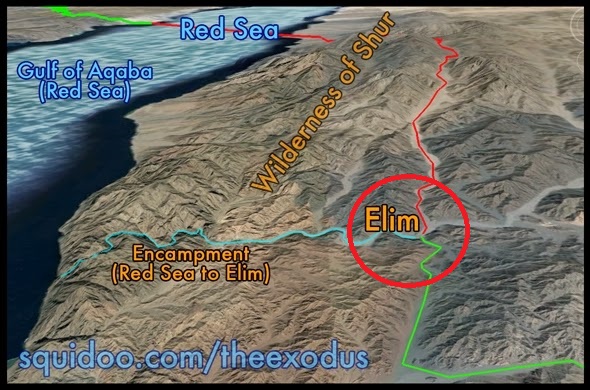
These are satelite images revealing the progression to the location of the Oasis of Elim
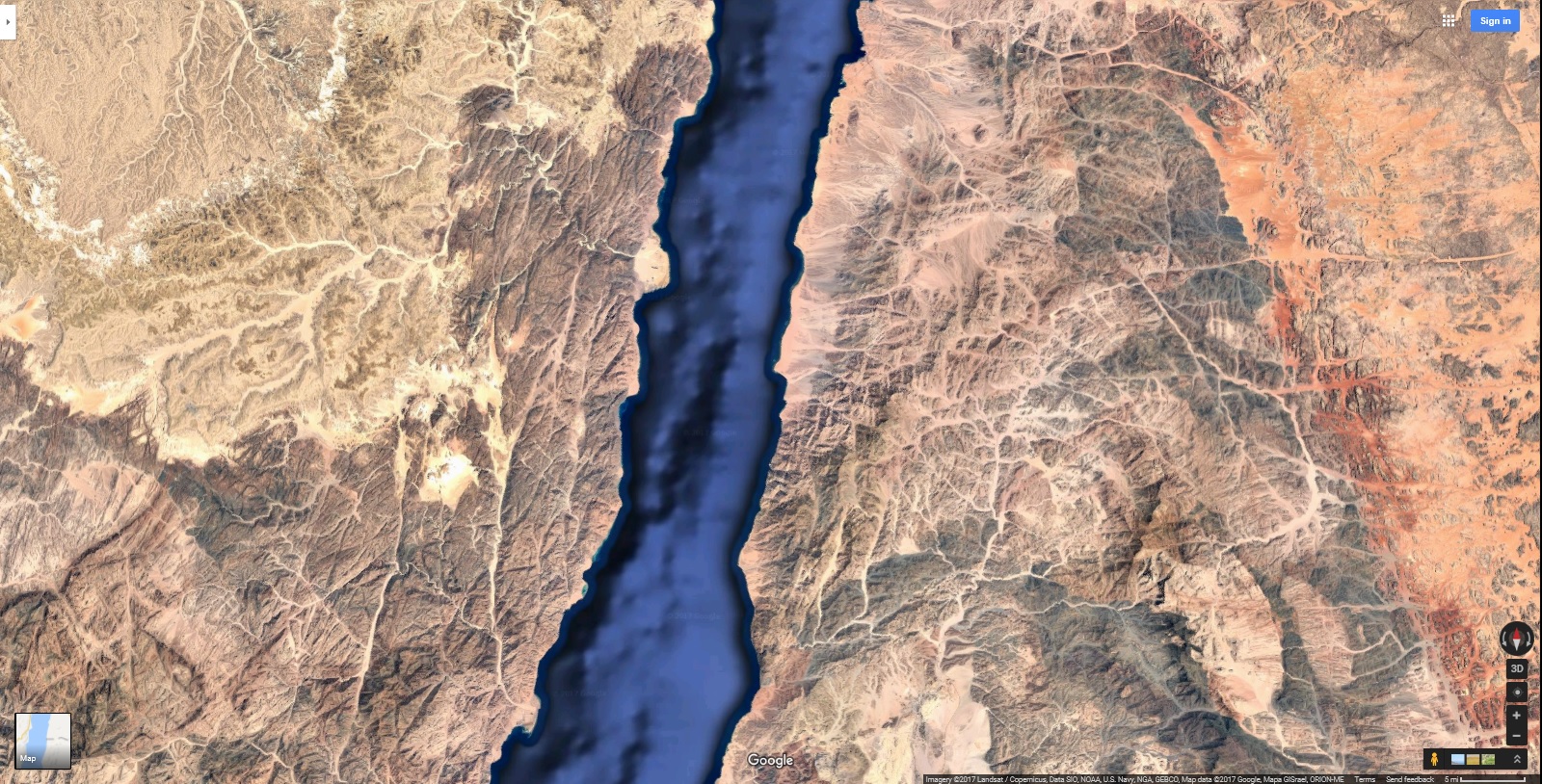
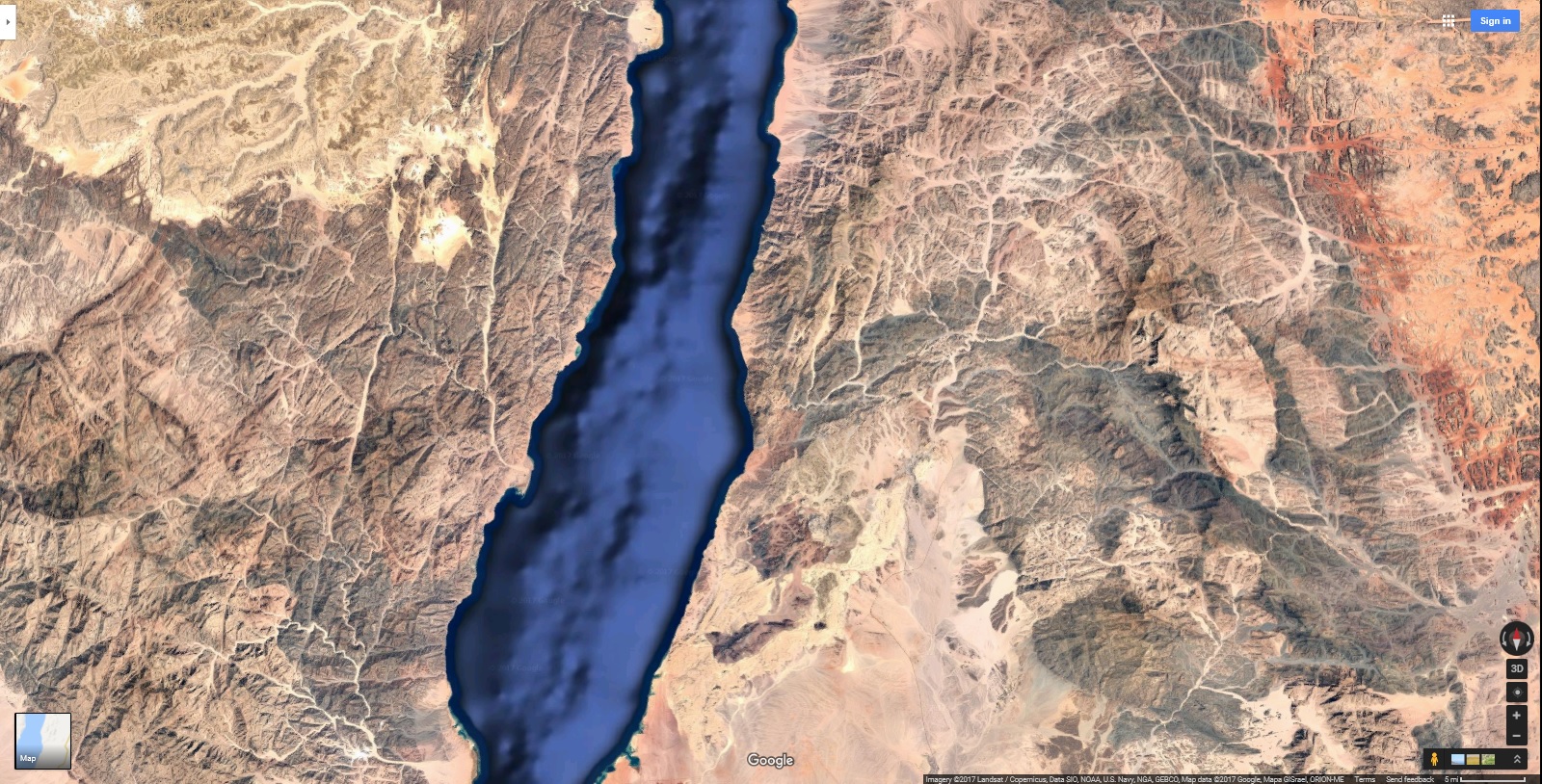
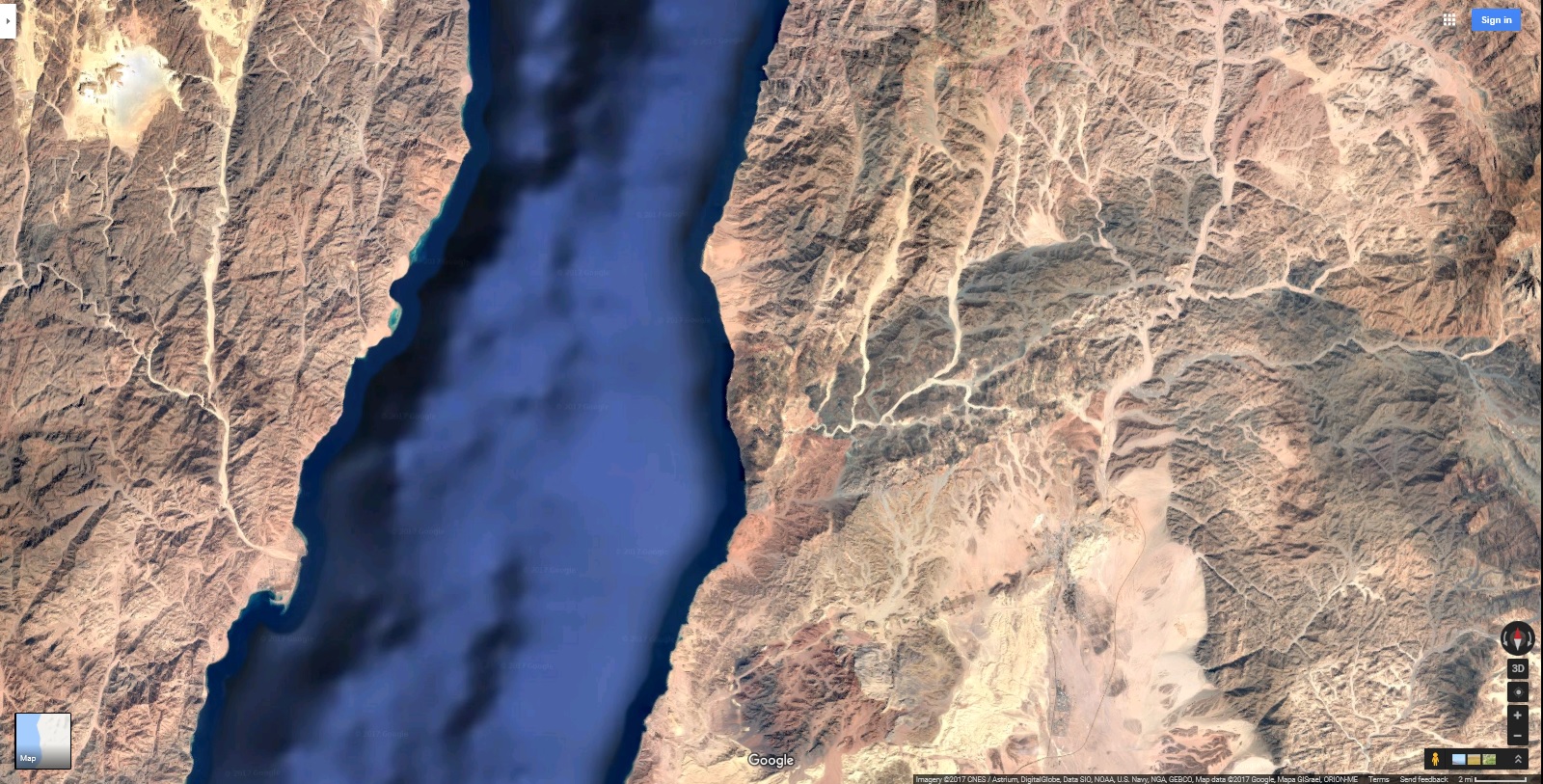
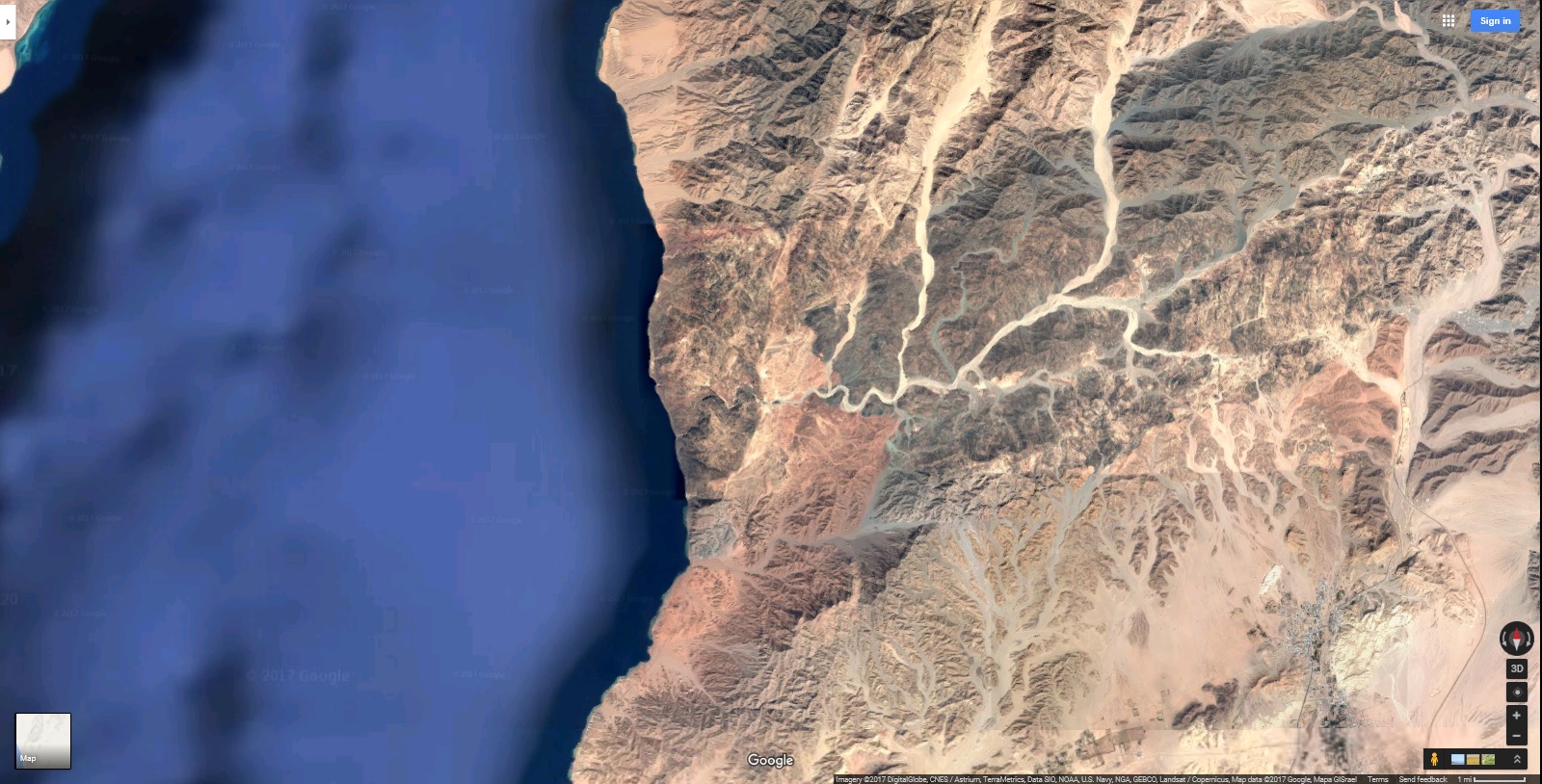
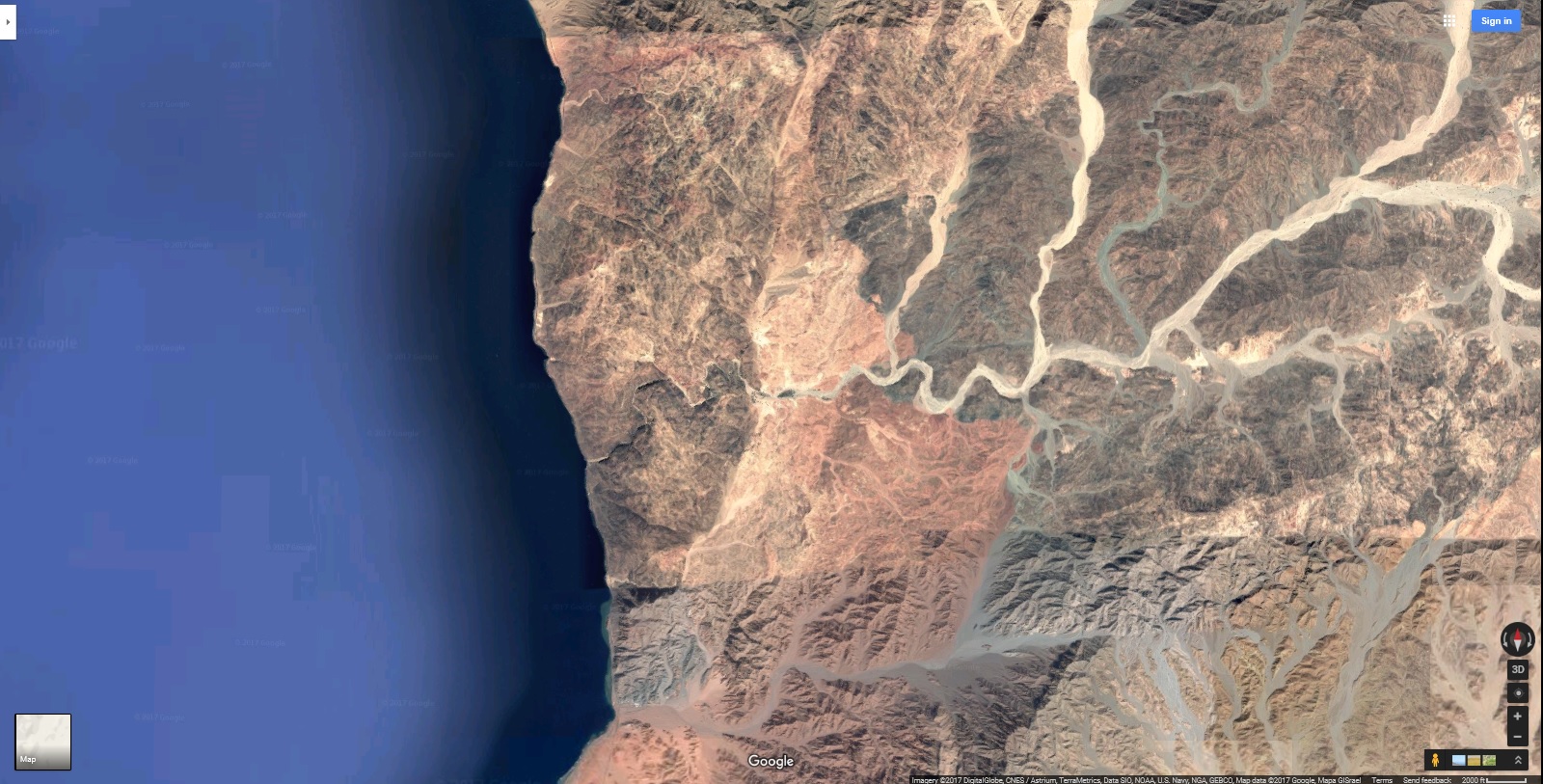
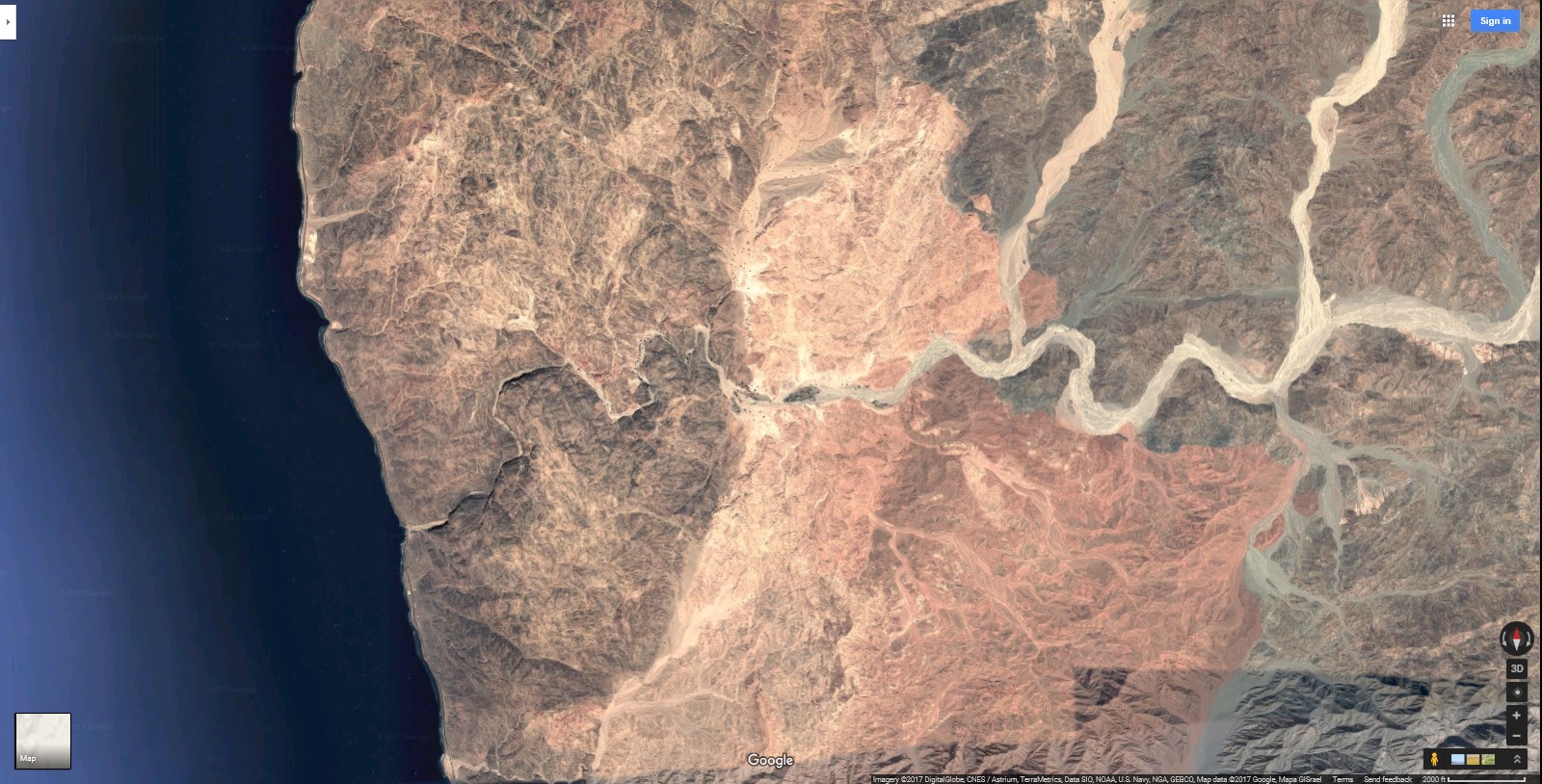
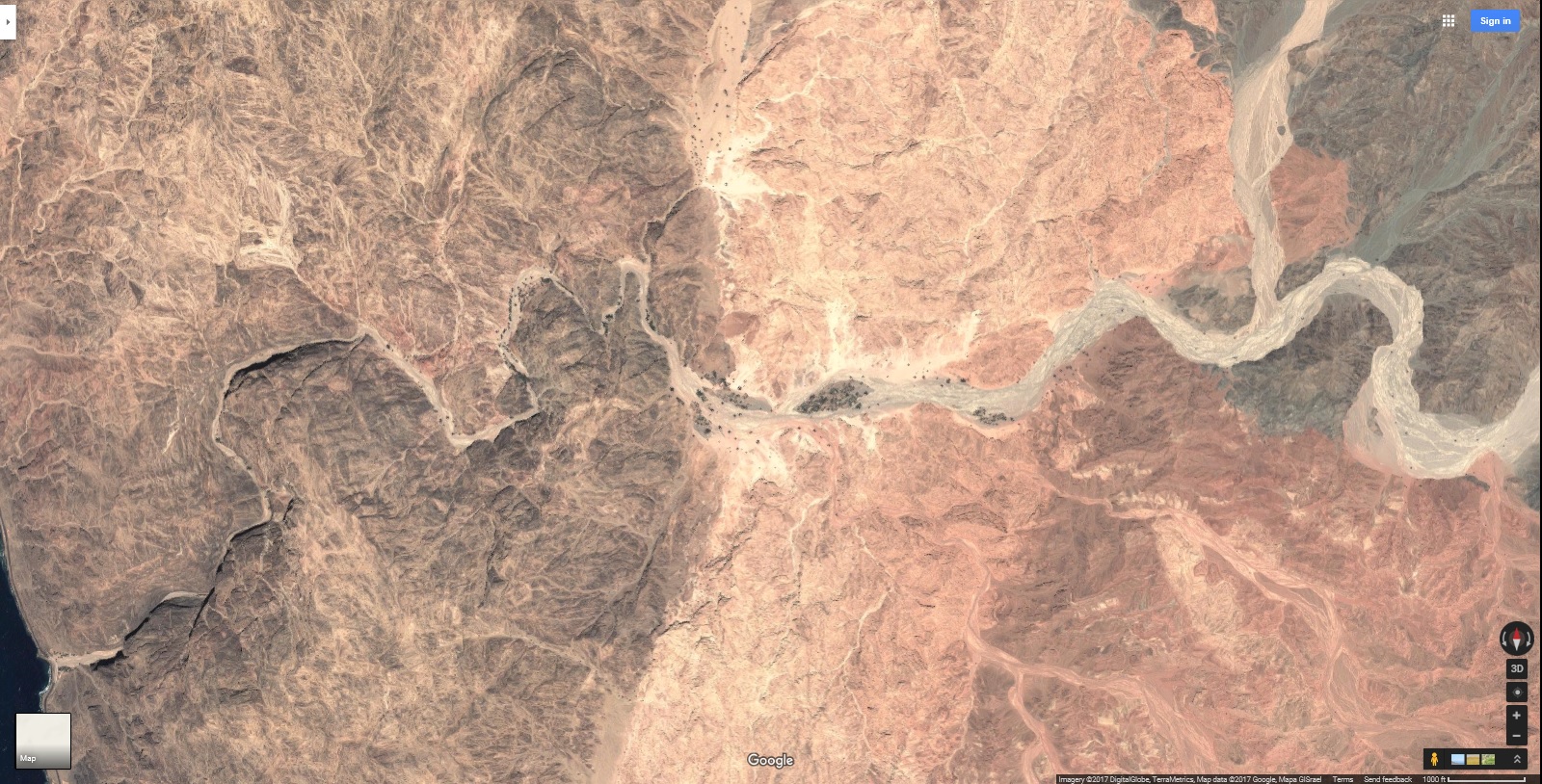
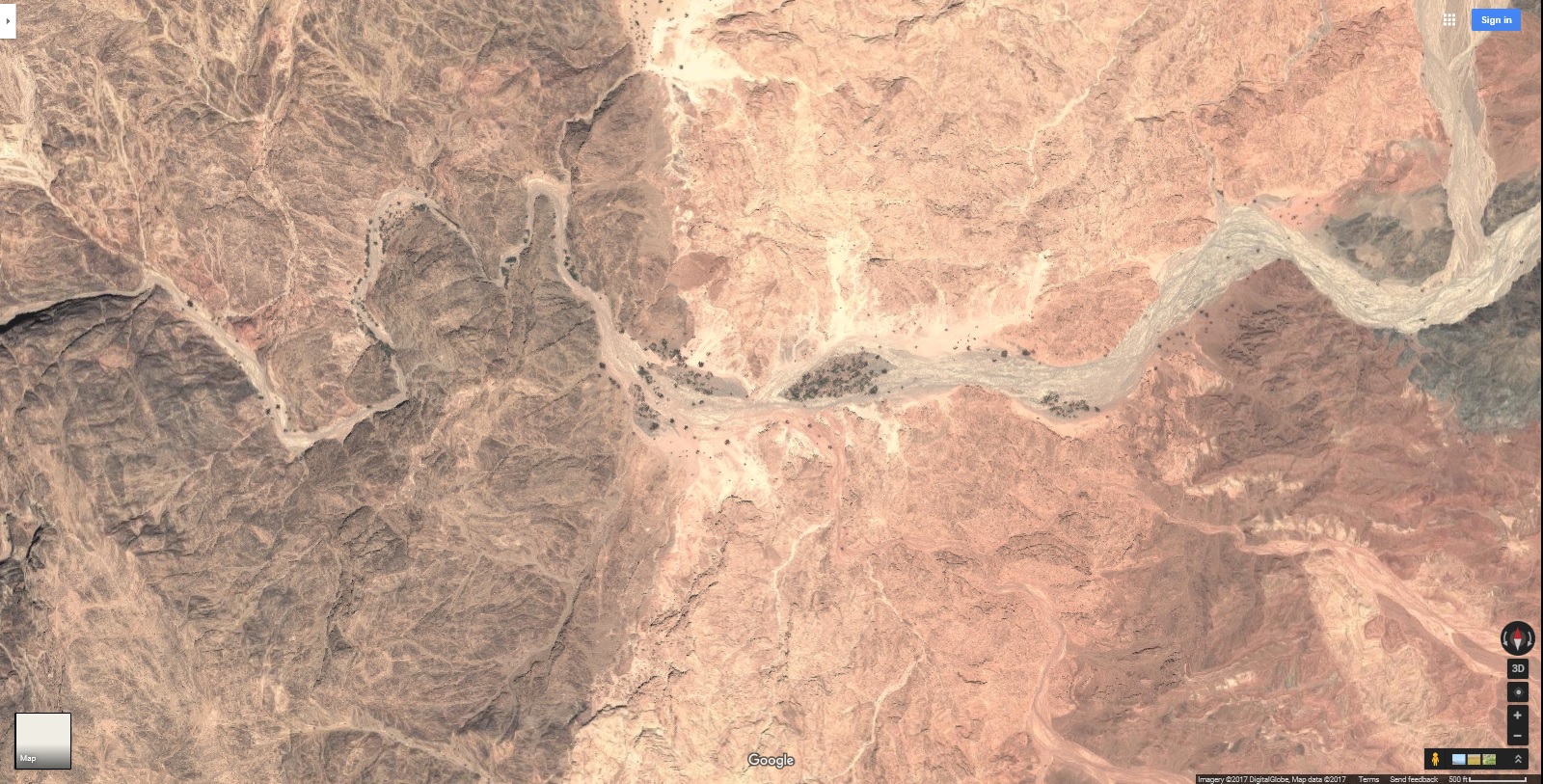
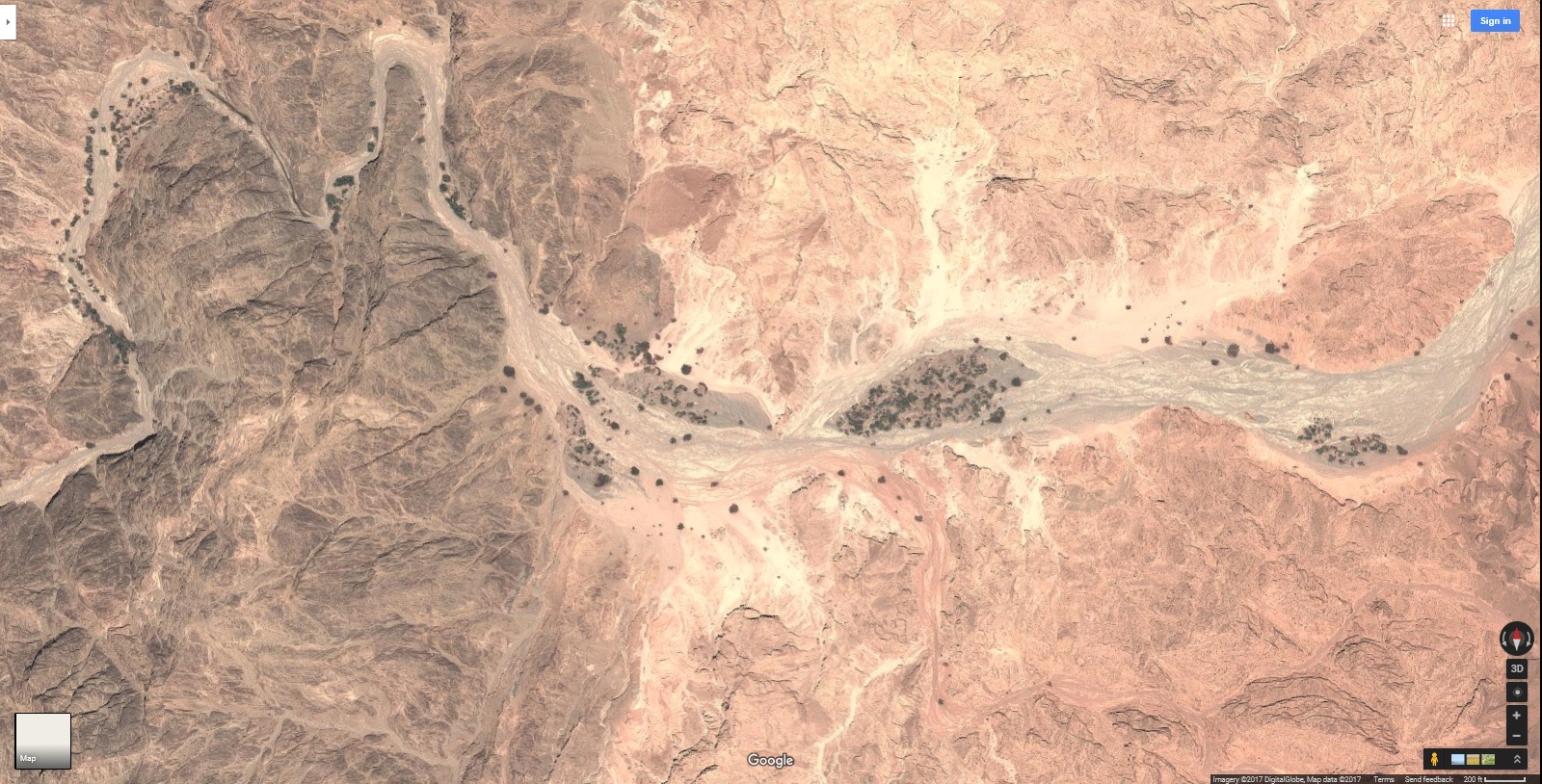
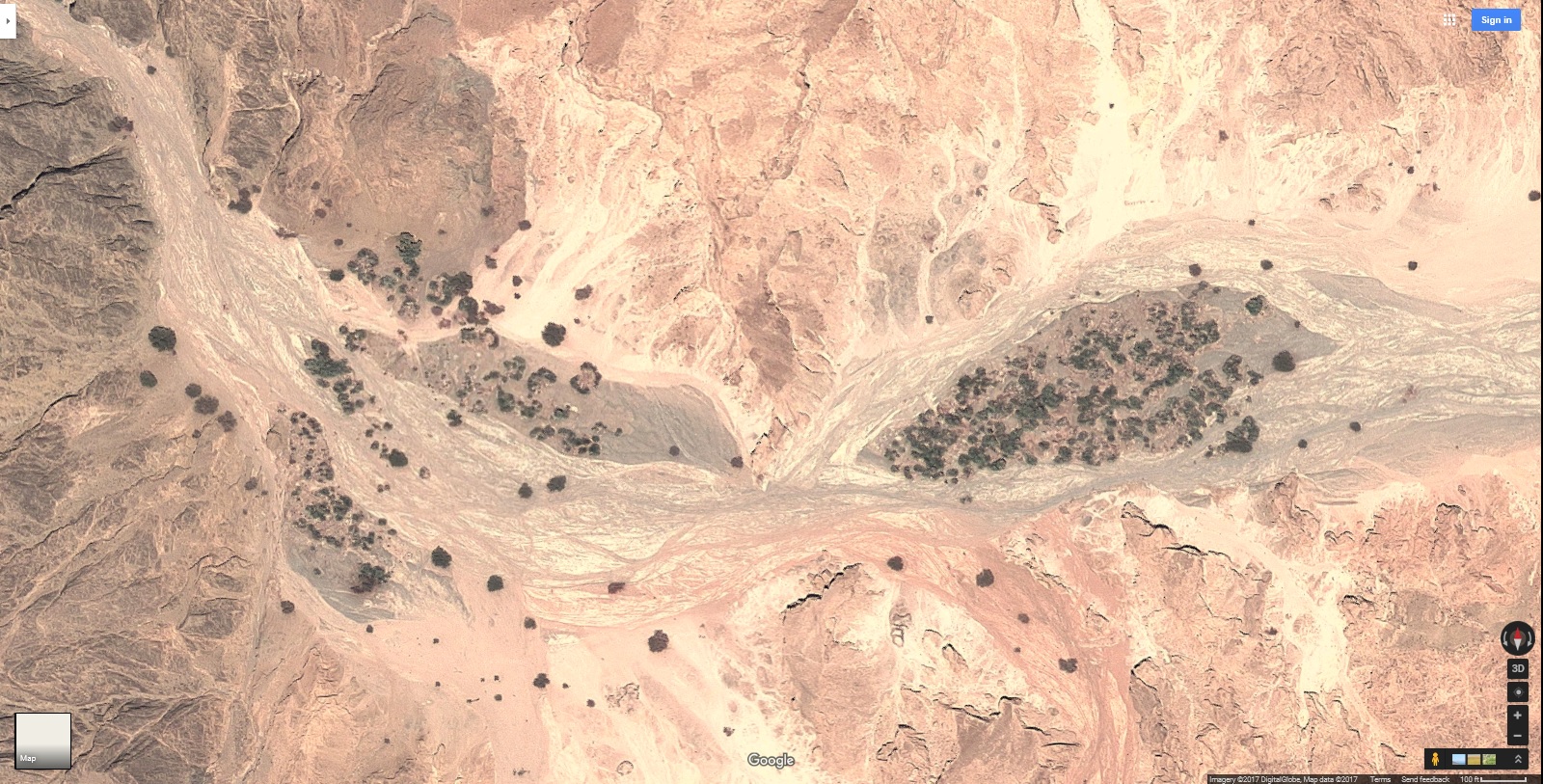
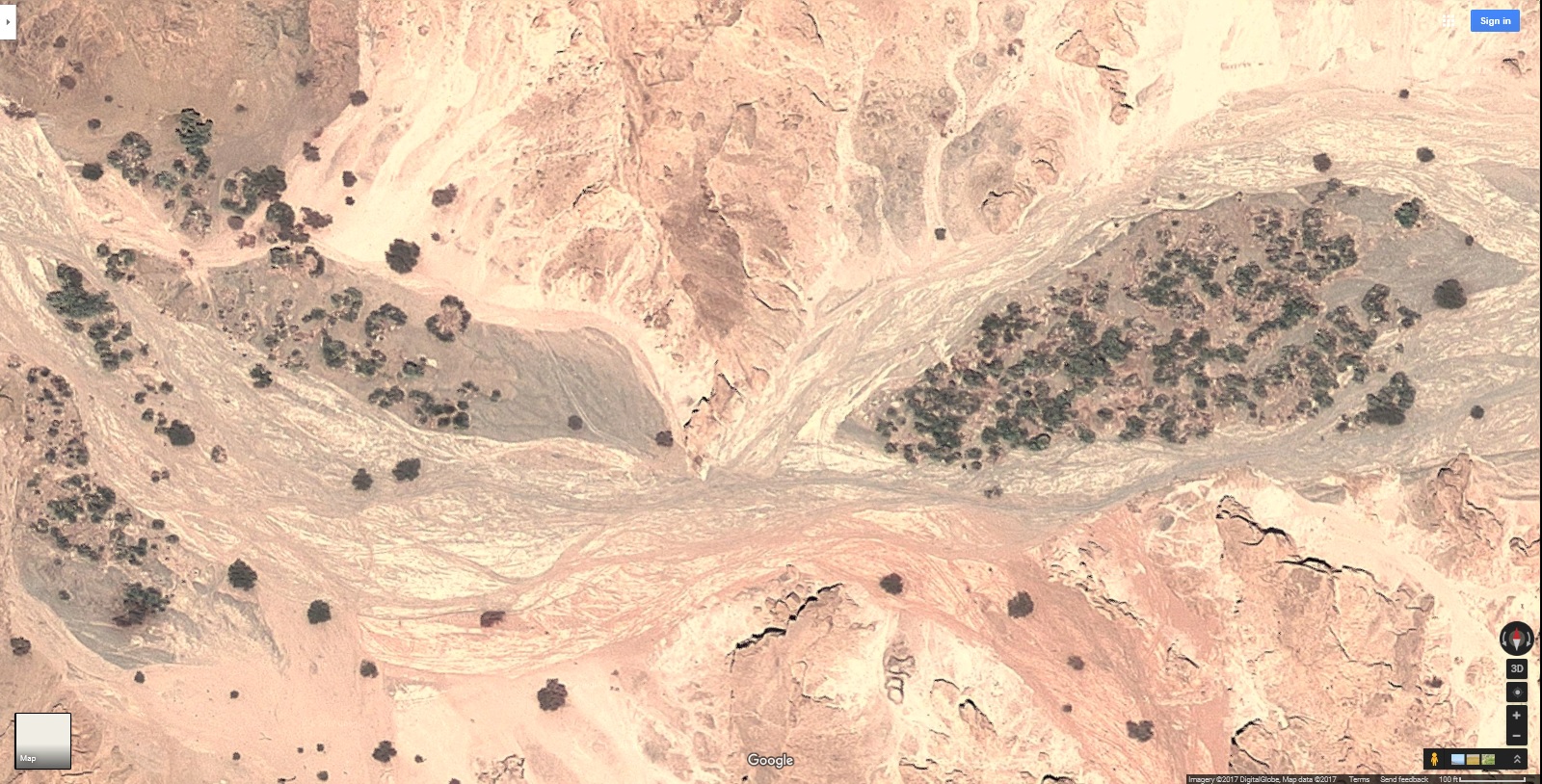
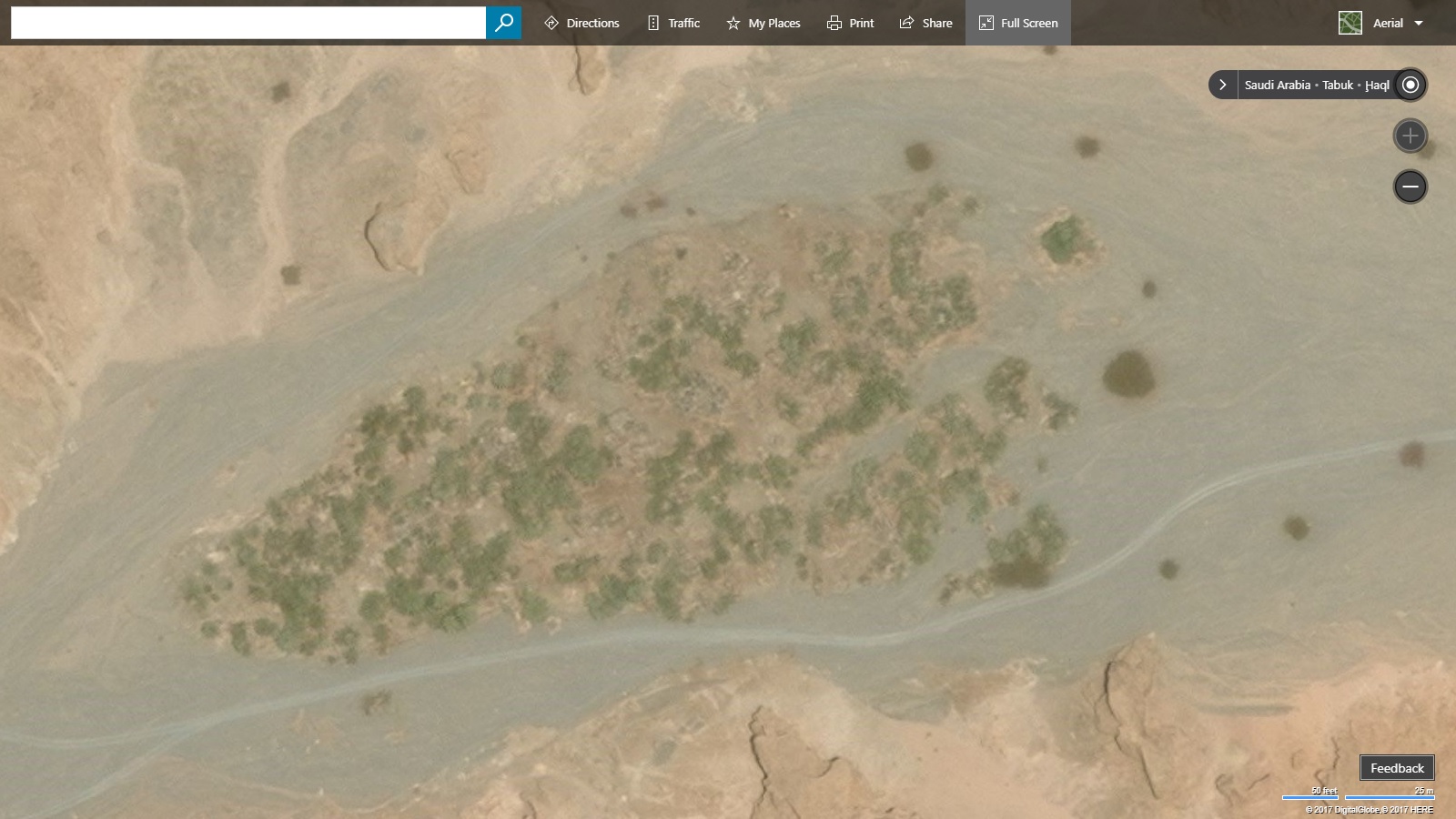
These are other close up views of Elim
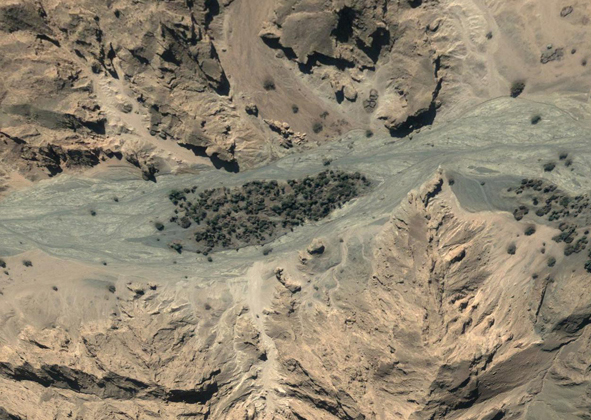
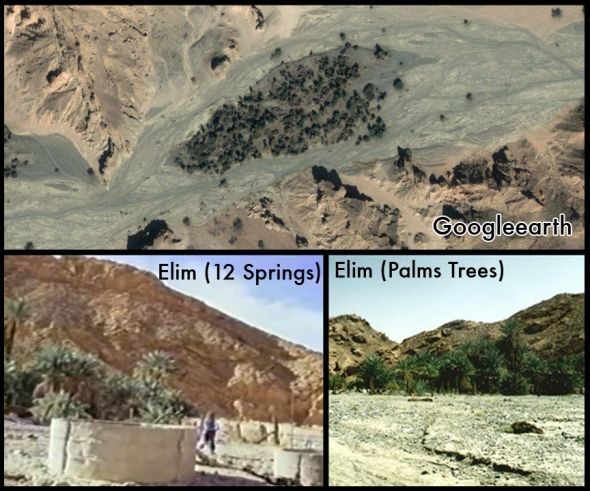
This is Elim at street view
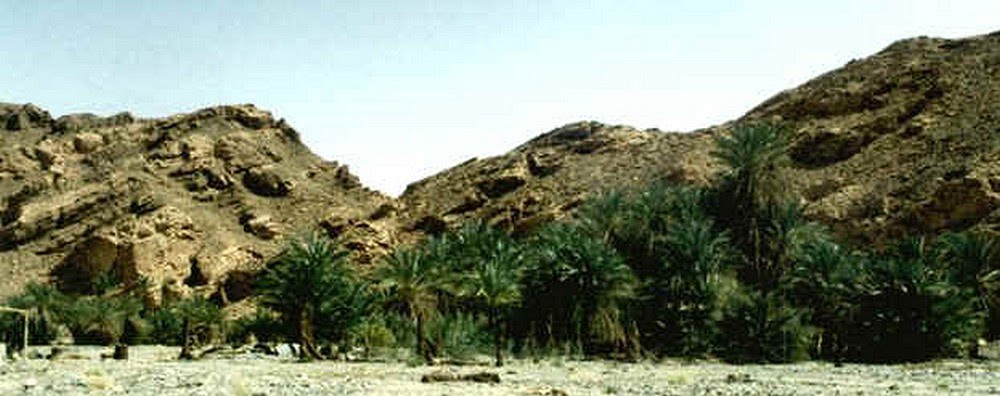
These are images taken from 360 degree views of Elim at street view
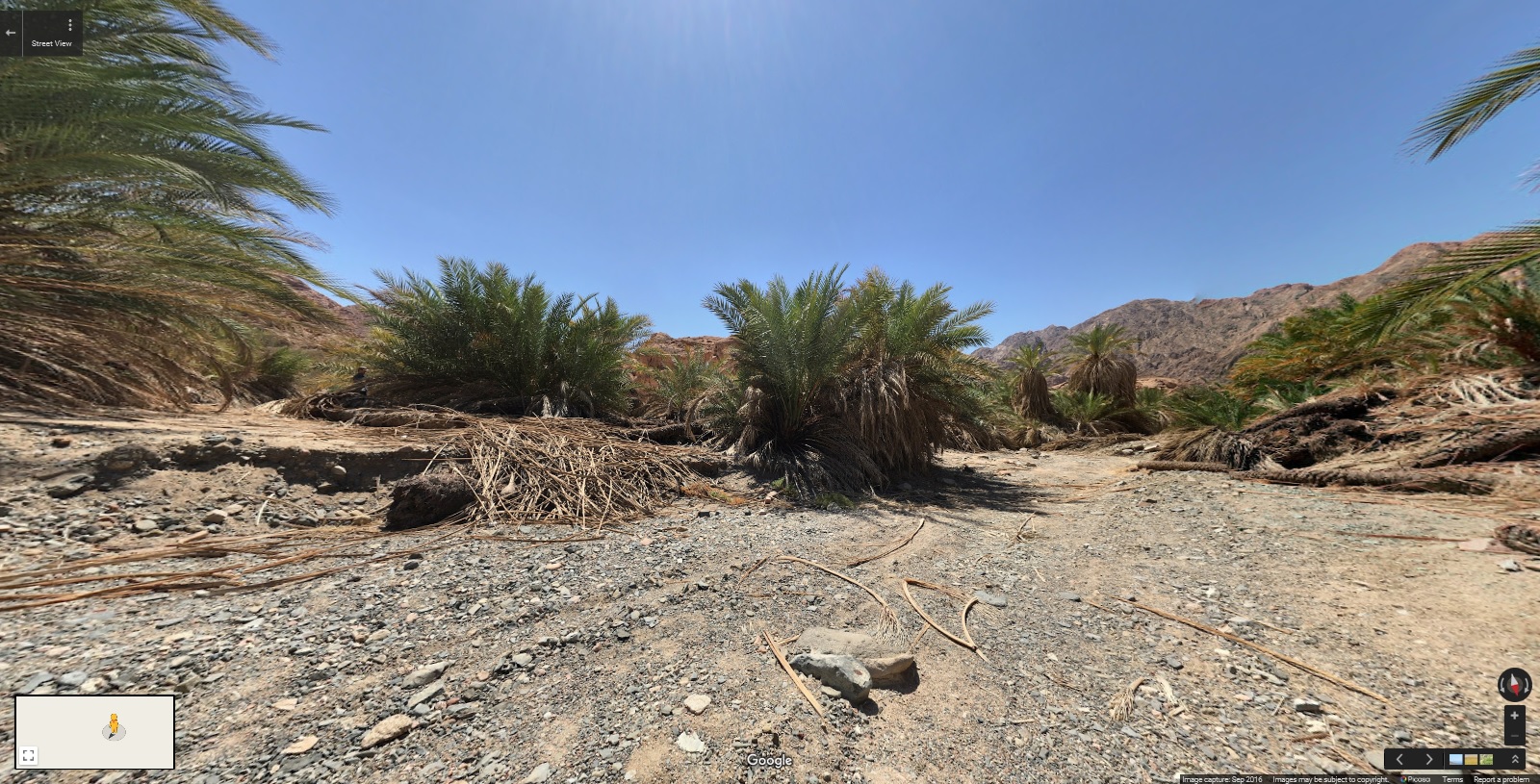
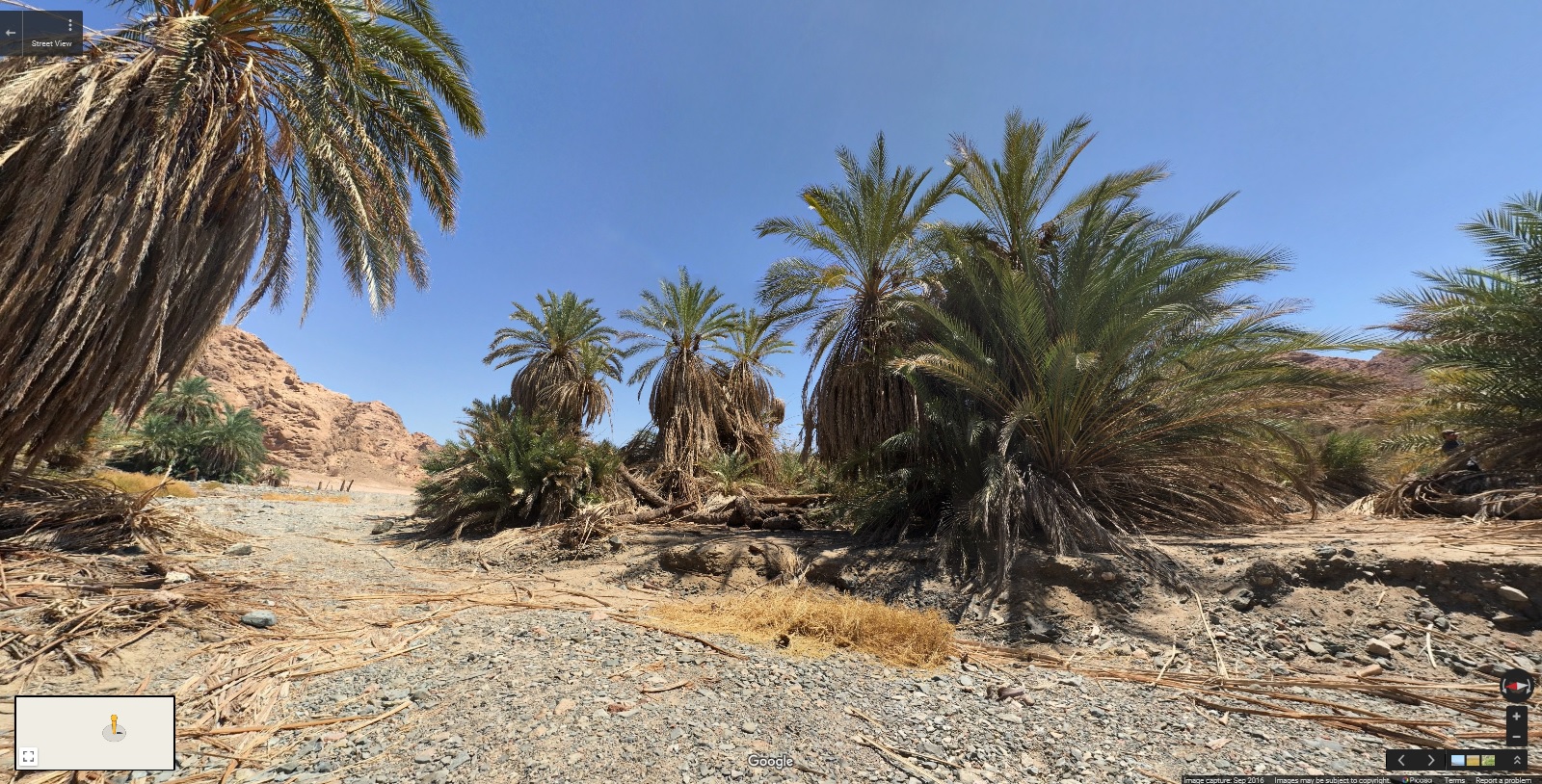
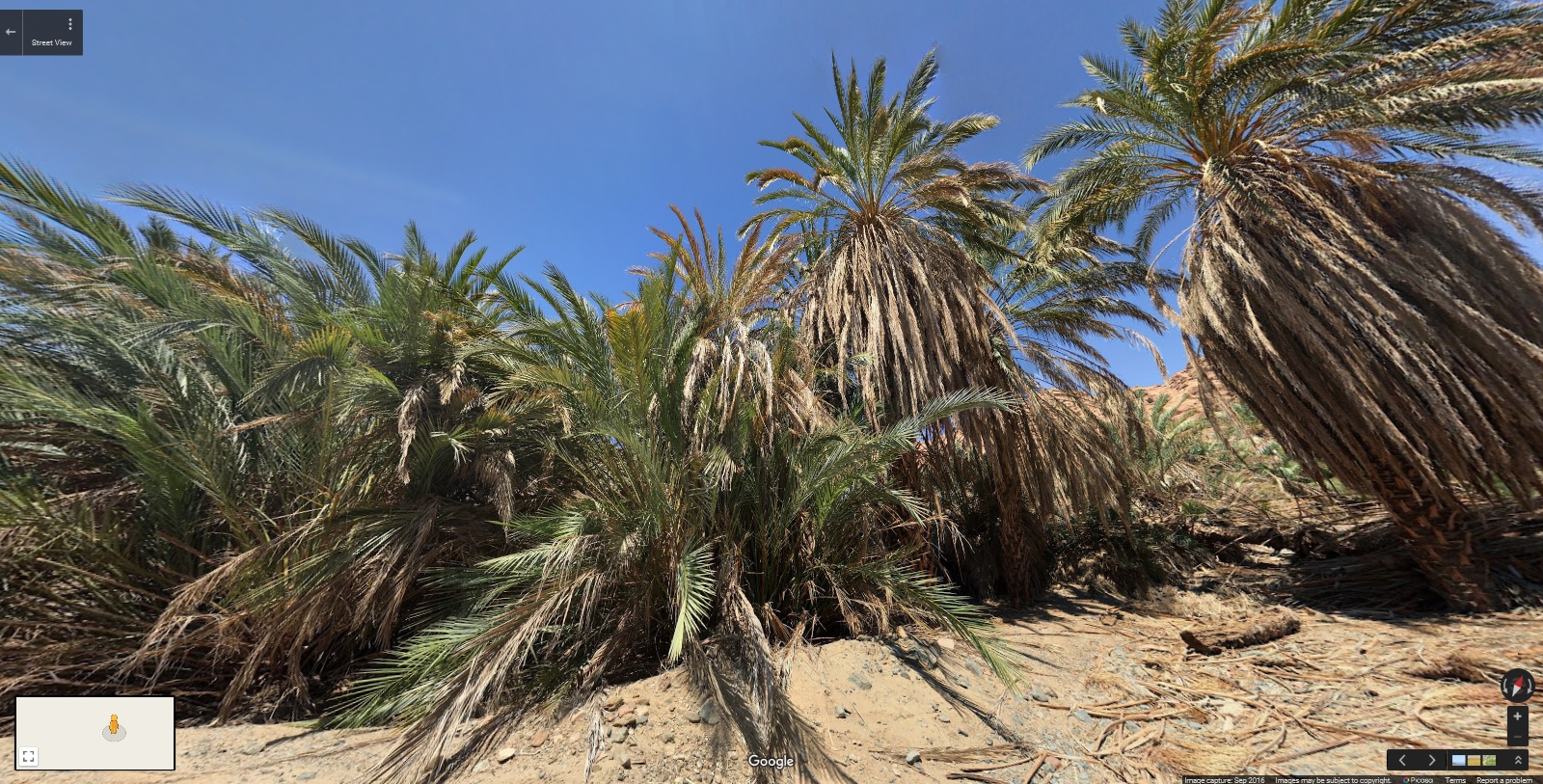
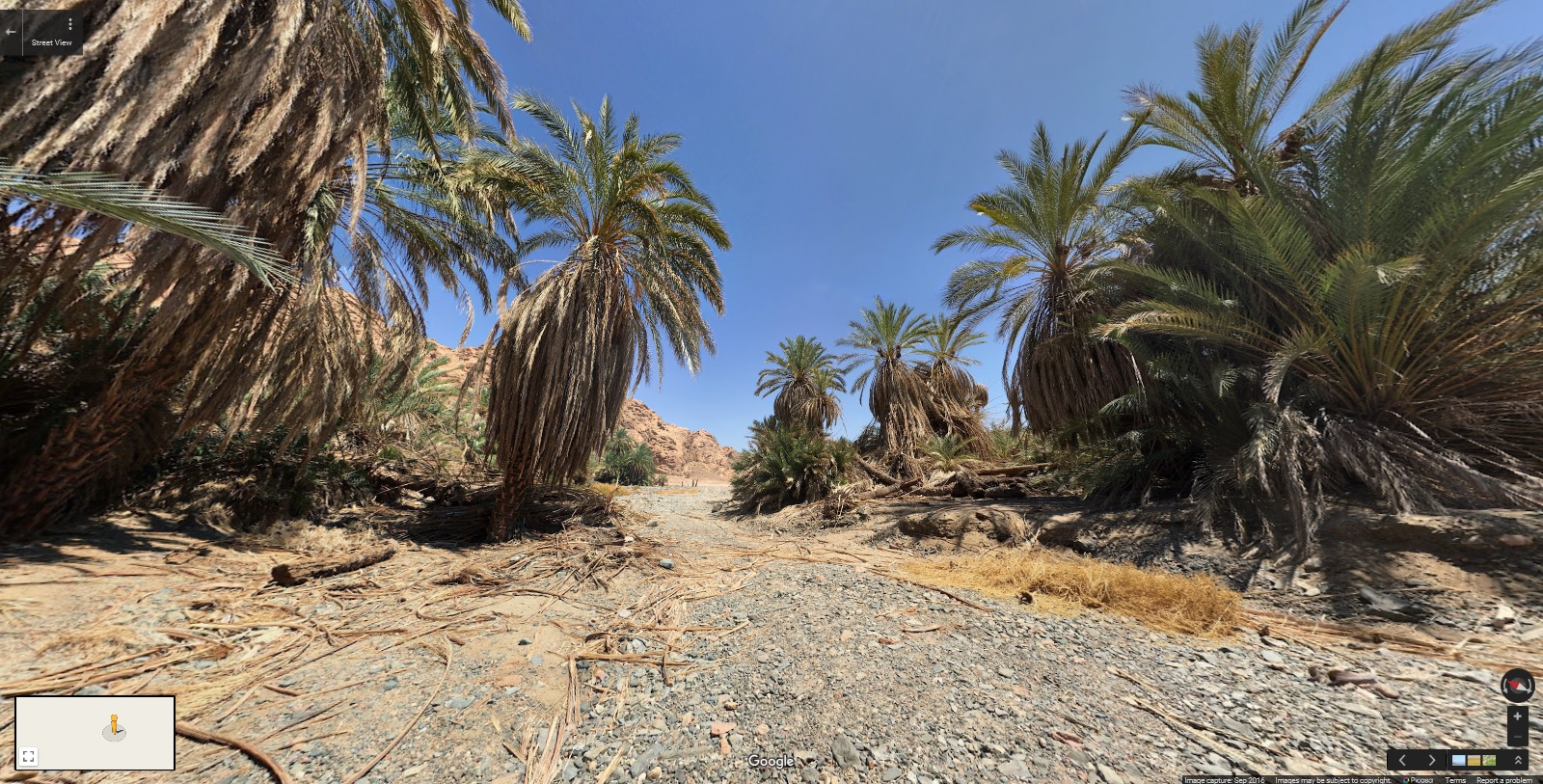
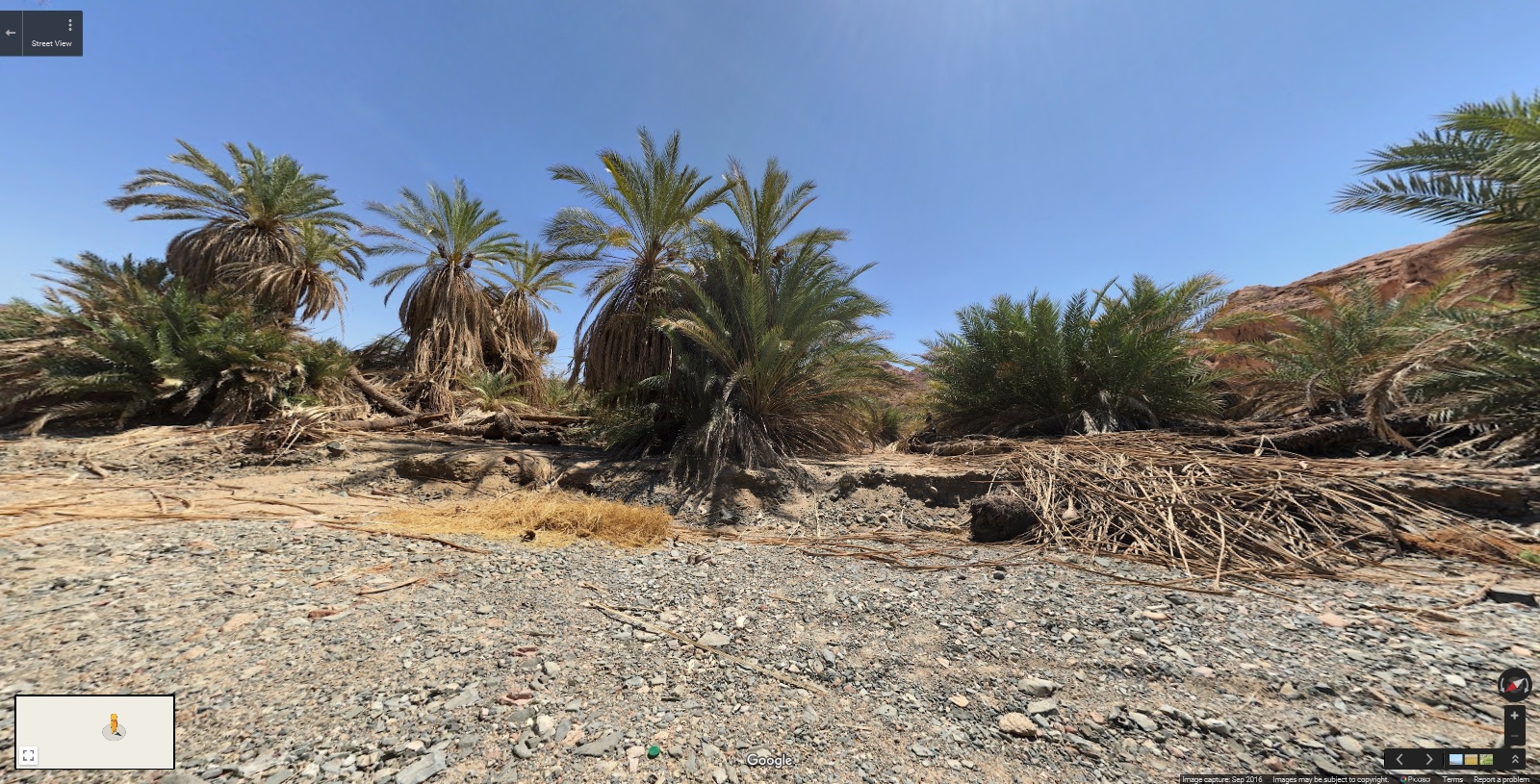
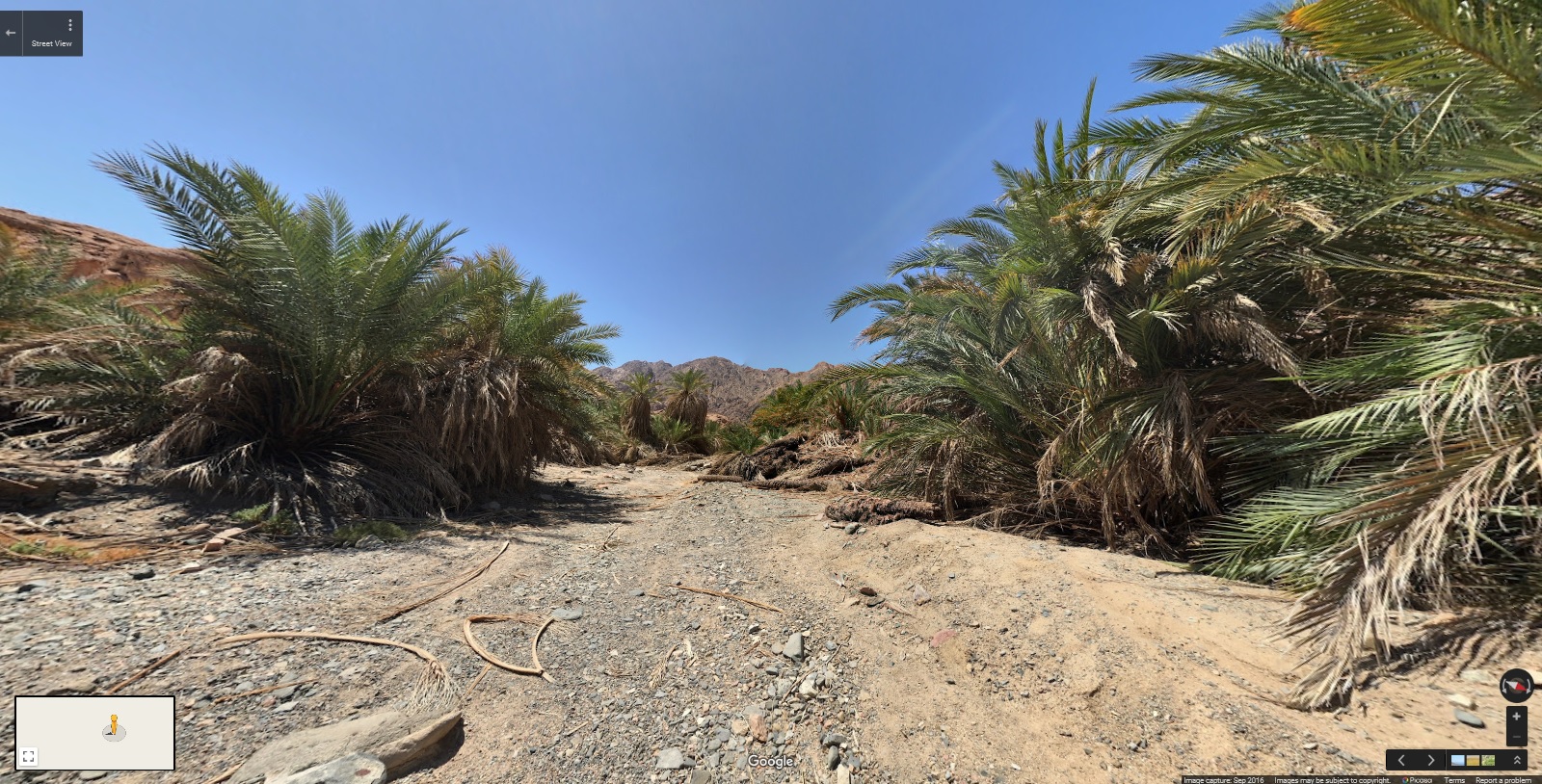
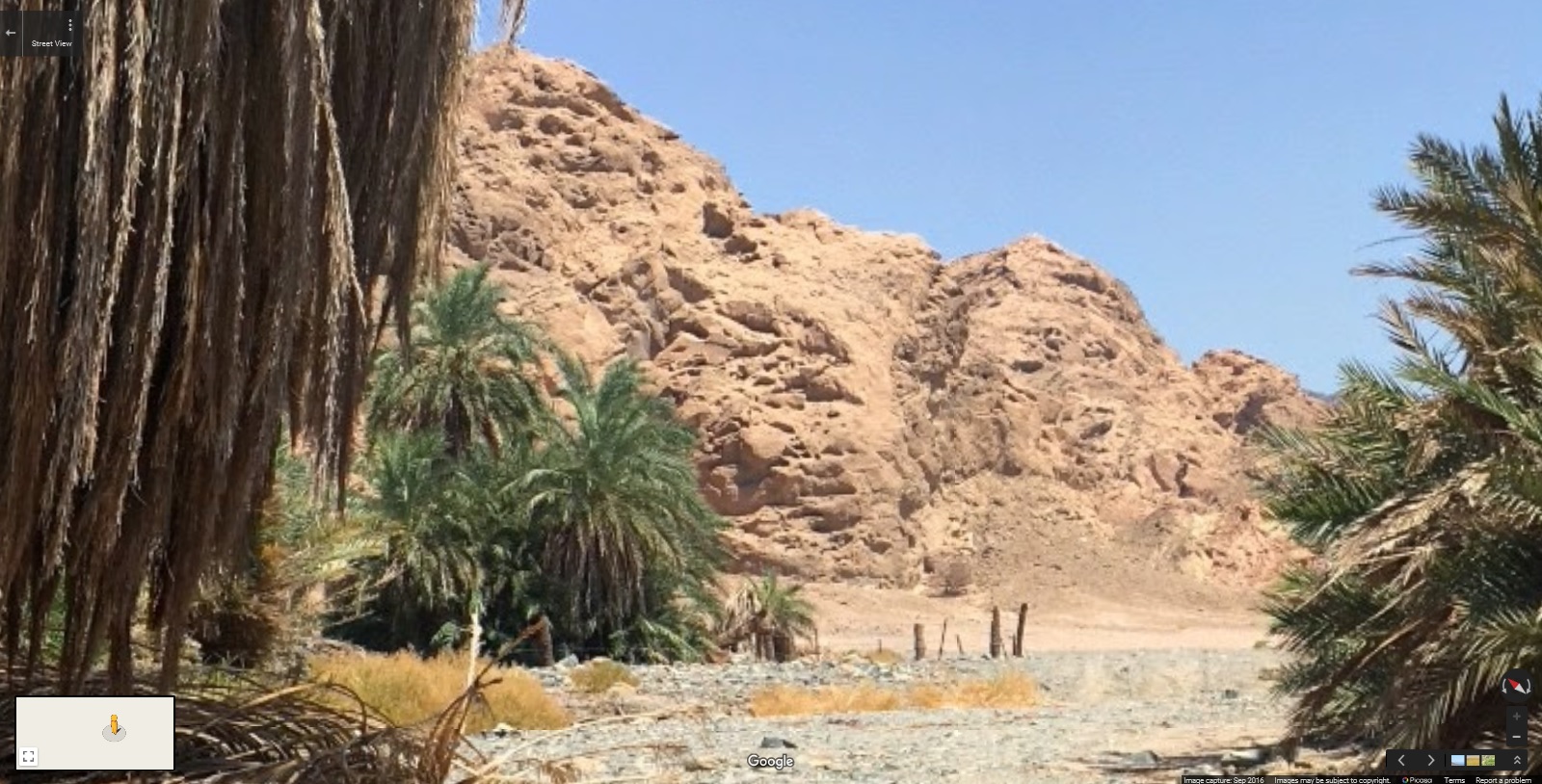
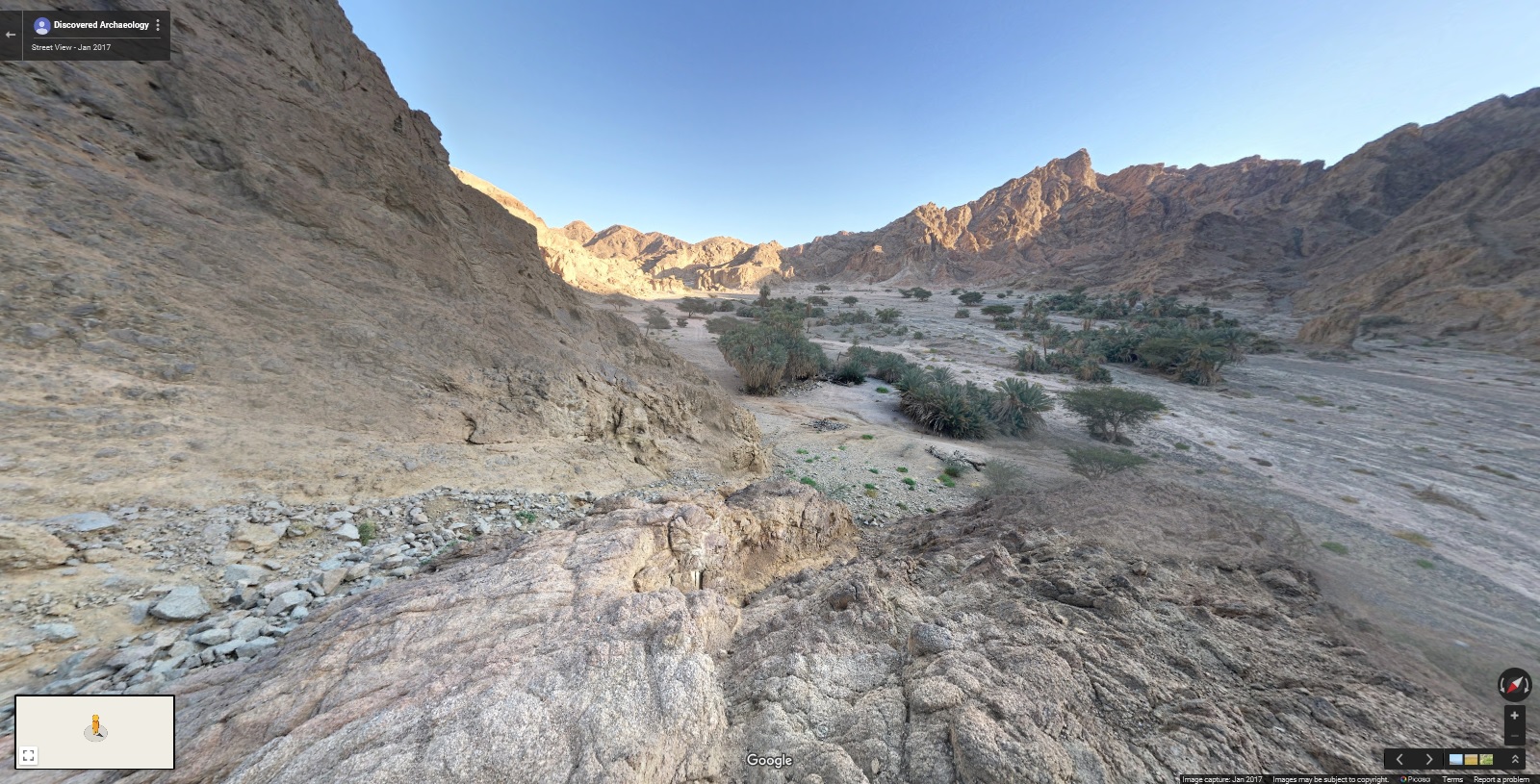
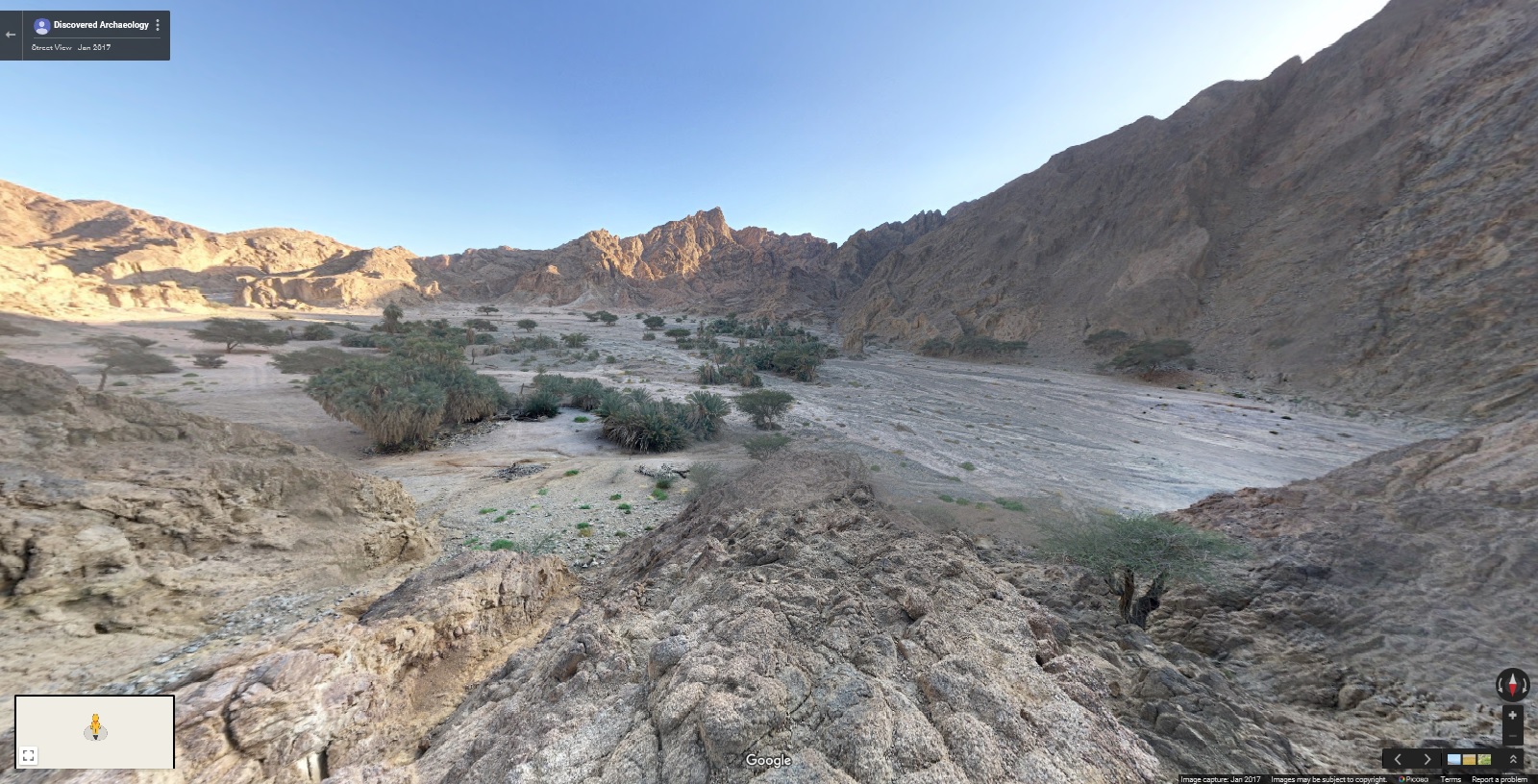
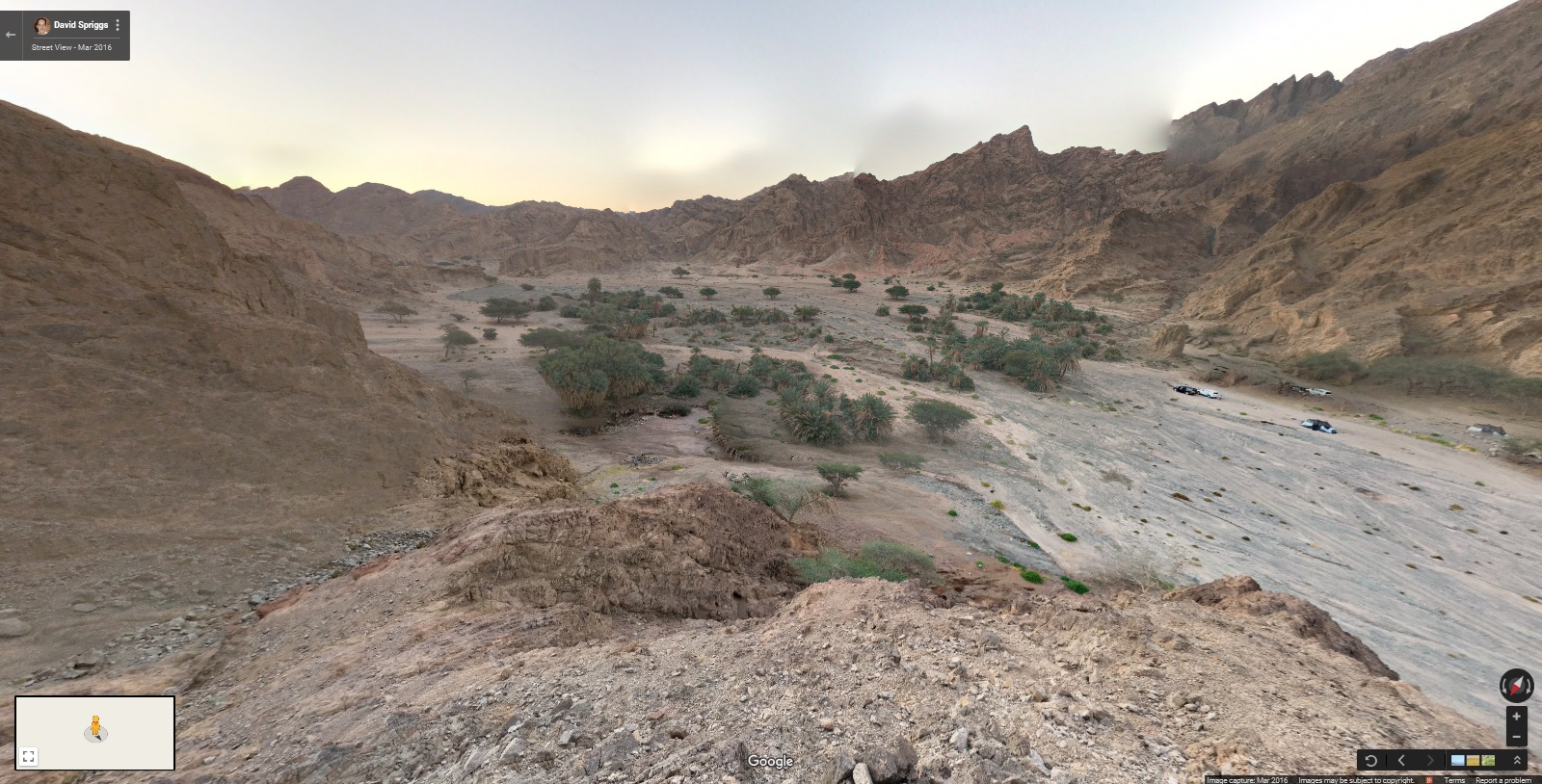
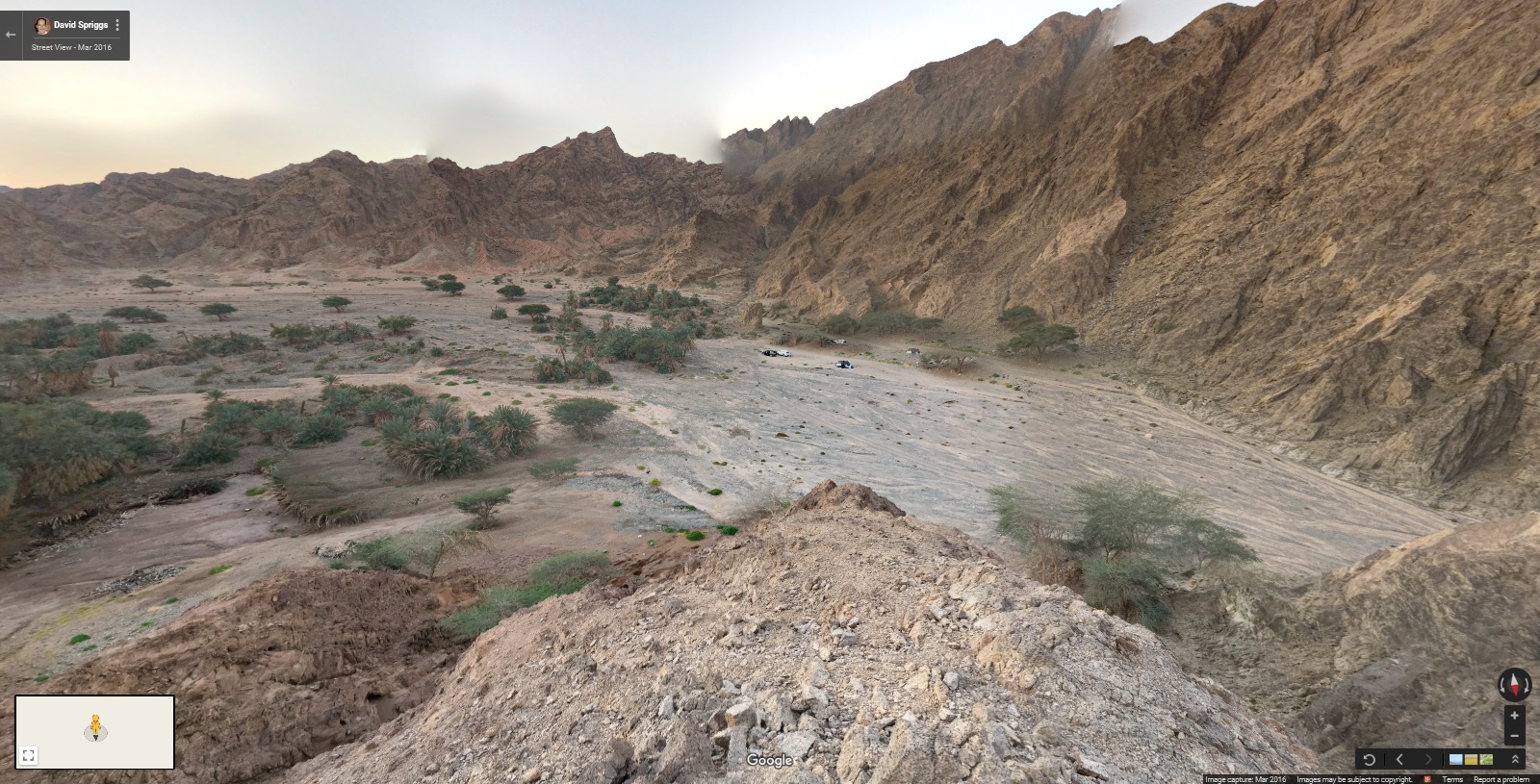
The seventy palm trees symbolizes the seventy souls including Jacob that went down to Egypt including Jacob, and the twelve wells of water symbolizes the twelve tribes of Israel.
We in Messiah also experienced this when our Heavenly Father renews our strength via the Ruakh HaKodesh (the Holy Spirit). The Prophet Isaiah noted this, which is noted in his book
Isaiah 40:28 Hast thou not known? hast thou not heard, that the Everlasting Elohim, hwhy, the Creator of the ends of the earth, fainteth not, neither is weary? There is no searching of His understanding. 29 He giveth power to the faint; and to them that have no might He increaseth strength. 30 Even the youths shall faint and be weary, and the young men shall utterly fall: 31 But they that wait upon hwhy shall renew their strength; they shall mount up with wings as eagles; they shall run, and not be weary; and they shall walk, and not faint.
CHAPTER 16
Exodus 16:1-36
Exo 16:1 And they journeyed (pulled up) from Elim, and all of the Congregation of the Sons of Israel, they came to the Wilderness of Sin, which is between Elim and between Sinai, on the five ten (fiveteen, fifteenth) day of the second renewed month to their going out from the land of Egypt. 2 And all of the Congregation of the Sons of Israel, they murmured upon (over) Moses and over (upon) Aaron in the wilderness: 3 And the Sons of Israel, they said to them, Who (What) would give us death on the Hand of hwhy in the land of Egypt, in our dwelling upon the boiling (flesh pots, ?thorns?), in our eating bread to the satisfaction; for you have brought us out to this wilderness, to have dead (to the death of) ta-all of this Assembly on the famine.
4 And hwhy said to Moses, Behold I will matar-rain bread from the Heavens for you; and the People shall go out, and they shall glean (pick up) a word of a day in his day, by that, I may test him that shall walk in My Teaching (Torah), if not. 5 And shall be, on the sixth day, and they shall prepare ta what they shall bring; and shall be double over (upon) what they shall glean (pick up) at a day, at a day.
6 And Moses and Aaron said to all of the Sons of Israel, At mixing period (evening), and you shall know that hwhy had brought you out from the land of Egypt: 7 And at breaking period (morning), and you shall see ta-the Glory of hwhy; in His hearing ta-your murmurings upon (over) hwhy: And what (who) are we that you are murmuring upon (over) us?
8 And Moses said, In hwhy giving to you in the mixing period (evening) flesh to eat, and bread in the breaking period (morning) to satisfaction; in hwhy hearing ta-your murmurings which you are with murmur upon him: and what are we? Your murmurings are not upon us, for are upon hwhy.
9 And Moses spoke to Aaron, Say to all of the Congregation of the Sons of Israel, Draw near to the Face of hwhy: for has heard ta your murmurings. 10 And was, as Aaron was speaking to all of the Congregation of the Sons of Israel, and they faced to the wilderness, and behold, the Glory of hwhy appeared (was seen) in a Cloud.
11 And hwhy spoke to Moses, to say, 12 I have heard ta-the murmurings of the Sons of Israel: speak to them, to say, Between the mixing periods (evenings) you shall eat flesh, and in the breaking period (morning) you shall be satisfied of bread; and you shall know that I am hwhy, your Elohim.
13 And was, in the mixing period (evening), and the quail, she ascended, and she covered ta-the Camp: and in the beaking period (morning), the dew, she was laying all around the Camp. 14 And the layer of dew, she had ascended, and behold, over (upon) the face of the wilderness was small (crushed) from shredding (peeling), small as hoar frost (covering) over (upon) the Earth. 15 And the Sons of Israel, they saw, and they said a man to his brother, What is that (he)?: For they did not know what he (that) was. And Moses said to them, He (That) is the bread which hwhy has given to you for food. 16 This is the Word which hwhy commanded, They will glean (pick up) from him a man by the mouth of his eating, an omer for the head from the enrollment (scroll, number) of your souls; You will take a man to whom is in his tent.
17 And the Sons of Israel, they did so, and they gleaned (picked up) that have more, that have little. 18 And they measured on the omer, and the one with much did not have an overplus, and the one with little had no lack; they gleaned (picked up) a man by the mouth of his eating.
19 And Moses said to them, A man shall not make remain (left) of him until breaking period (morning). 20 And they did not listen to Moses; and the men, they made remain (left) from him until breaking period (morning), and raised up worms (maggots), and stank: And Moses was angry (wroth) over (upon) them.
21 And they gleaned (picked up) him in the breaking period (morning); in the breaking period (morning), a man according to (as) the mouth of his eating: and of the heat of the sun, and was melted (liquified).
22 And was, in the sixth day, they gleaned (picked up) double bread, two of the omers for the one: and all of the Rulers (Leaders) of the Congregation, they came, and they told (declared) to Moses. 23 And said to them, He is which (what) hwhy hath said, Tomorrow is a Shabbathon (Intermittent Shabbath, Intermittent Rest, Intermittent Repose) of the Sacred (Holy) Shabbath to hwhy: Bake ta which you will bake, and boil ta which you will boil; and of ta all of the overplus, deposit (allow) for yourselves to be kept (guarded) until the breaking period (morning). 24 And they deposited (allowed) him until the breaking period (morning) as the which Moses commanded: And did not stink, and was no rapid breeding in him. 25 And Moses said, Eat him today; for today is a Shabbath to hwhy: You will not find it in the field today. 26 Six days you shall glean (pick up) him [(pick him up)]; and on the seventh day is the Shabbath, shall not be among him.
27 And was, they went out from the People on the seventh day to glean (pick up), and they did not find. 28 And hwhy said to Moses, Until when do you refuse to keep (guard, observe) My Commandments and My Teachings (Torahs)? 29 See, for hwhy has given to you the Shabbath. Upon thus, He is giving you on the sixth day two days of bread; Dwell a man at his place. Do not go out a man from his place on the seventh day. 30 And the People, they desisted (rested) on the seventh day.
31 And the House of Israel called ta-his name, Man (Manna): and he was like the seed of coriander (gashing, crowd); and his taste was like wafers in thickness (honey).
32 And Moses said, This is the Word which hwhy commanded, Fill the omer from him to be kept guard, observed) for your generations; by that, they may see ta-the bread which I have made you eat in the wilderness, in My bringing you out from the land of Egypt. 33 And Moses said to Aaron, Take one vase (thorn), and give the fullness of the omer of man (manna) there, and deposit him to the Face of hwhy to be kept (guarded, observed) for your generations. 34 As the which hwhy commanded to Moses, and Aaron deposited him to the face of the Witness (Testimony) to be kept (guarded, observed). 35 And the Sons of Israel, they ate ta-the man (manna) forty years until in their coming to the inhabited land; They ate ta-the man (manna) until their coming to the border of the land of Canaan. 36 And the omer, he was a tenth of the ephah.
(NOTE: Not all verses will have comments)
Verse one
1 And they journeyed (pulled up) from Elim, and all of the Congregation of the Sons of Israel, they came to the Wilderness of Sin, which is between Elim and between Sinai, on the five ten (fiveteen, fifteenth) day of the second renewed month to their going out from the land of Egypt.
This is the most concrete time line of the Israelites' journey after crossing the Sea of Reeds so far, which is the fifteenth day of the second month of Iyar. In other words, it has been "thirty days" since their departure from Ramesses in Egypt.
Looking at the word SIN
The Hebrew word for Sin is "Seen"- Samek, Yod, Nun Sophit (Nyo). It is from Strong's Concordance number 5512, and its definition
Of uncertain derivation; Sin, the name of an Egyptian town and (probably) desert adjoining: - Sin.
It shows no definition. Researching further, there is a definition from the 1857 edition of "Gesenius' Hebrew-Chaldee Lexicon of the Old Testament", edited by Samuel Prideaux Tregelles. This is what it shows regarding Sin in the image of one of its pages below:
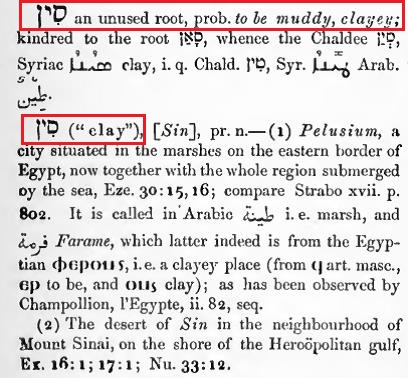
To me this makes sense that Sin means "clay", because it was the next stage Israel's journey with hwhy, where hwhy want's to "mold" and "shape" their "human clays" to be what He wants them to be. The prophet Isaiah reinforces this premise, which is written in his book
Isaiah 64:8 But now, hwhy, Thou art our Father; we are the clay, and Thou our Potter; and we all are the work of Thy Hand.
What hwhy did to the Israelites is the same way He does to us as His children in Messiah. It is based by the apostle Paul noted in his letter to the assembly in Rome
Romans 9:19 Thou wilt say then unto me, Why doth he yet find fault? For who hath resisted his will? 20 Nay but, O man, who art thou that repliest against hwhy? Shall the thing formed say to Him that formed it, Why hast Thou made me thus? 21 Hath not the potter power over the clay, of the same lump to make one vessel unto honour, and another unto dishonour?
This is the similar matter that hwhy did to the Israelites. He does to us in our lives today. Our Heavenly Father wants to "spiritually mold" and "spiritually shape" us through His Word and our relationship with Him, with His Son, Yeshua, the Messiah, via the Ruakh HaKodesh (the Holy Spirit) to be like Him.
There is another Gesenius translation. In this 1866 edition, edited by Edward Robinson (not the actor, Edward G. Robinson), this translation is slightly different
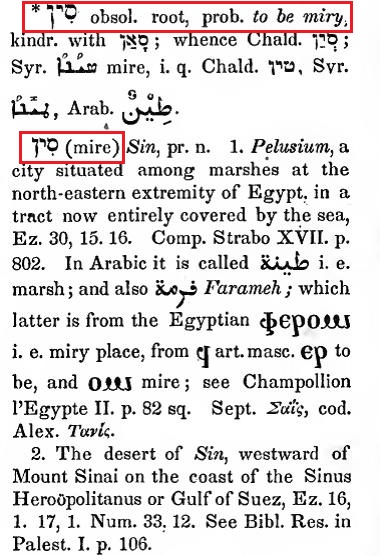
This would mean that the Israelites' murmuring brought them to a "mire", meaning, that their murmuring was their mire.
Indirectly related, the apostle Peter relates us in Messiah who return to their old fleshly ways, which is noted in his epistle
2 Peter 2:17 These are wells without water, clouds that are carried with a tempest; to whom the mist of darkness is reserved for ever. 18 For when they speak great swelling words of vanity, they allure through the lusts of the flesh, through much wantonness, those that were clean escaped from them who live in error. 19 While they promise them liberty, they themselves are the servants of corruption: for of whom a man is overcome, of the same is he brought in bondage. 20 For if after they have escaped the pollutions of the world through the knowledge of the Lord and Saviour Yeshua the Messiah, they are again entangled therein, and overcome, the latter end is worse with them than the beginning. 21 For it had been better for them not to have known the way of righteousness, than, after they have known it, to turn from the Holy Commandment delivered unto them. 22 But it is happened unto them according to the true proverb, The dog is turned to his own vomit again; and the sow that was washed to her wallowing in the mire.
We could apply indirecty, the apostle Peter reveals to us is that the Israelites were going through "the Mire of Murmuring". This is also applied to us in our spiritual walk in Messiah, that we could experience this by spiritually walking in the mire of the issues of the world, or personal issues, or whatever. Sometimes we murmur about them. We need to stay focused on the Heavenly Father and the Kingdom, which the apostle Paul noted in his letter to the assembly in Colossia
Colossians 3:2 Set your affection on things above, not on things on the earth.
Verses two and three
2 And all of the Congregation of the Sons of Israel, they murmured upon (over) Moses and over (upon) Aaron in the wilderness: 3 And the Sons of Israel, they said to them, Who (What) would give us death on the Hand of hwhy in the land of Egypt, in our dwelling upon the boiling (flesh pots, ?thorns?), in our eating bread to the satisfaction; for you have brought us out to this wilderness, to have dead (to the death of) ta-all of this Assembly on the famine.
"Ah, the good ol' days", and yet they have forgotten that they were suffering under the enslavement of Pharaoh for over four decades, if not a century or more. This has happened to many people in life, including some of us in Messiah, and unabashedly, I am one of them. When one leaves a location, because of bad relationships and/or the environment, so one moves to another location to start a new life. But that one reminisce good things in one's previous residences, and wished that one had never left. People tend to filter out the bad and remember "the good points" in their lives, and then they want to go back, while forgetting the real reason why they left. This is the same case for the People of Israel, as they reminisce the "good food" they had while in Egypt. What they did back then was nothing new.
Verses four through eight
4 And hwhy said to Moses, Behold I will matar-rain bread from the Heavens for you; and the People shall go out, and they shall glean (pick up) a word of a day in his day, by that, I may test him that shall walk in My Teaching (Torah), if not. 5 And shall be, on the sixth day, and they shall prepare ta what they shall bring; and shall be double over (upon) what they shall glean (pick up) at a day, at a day. 6 And Moses and Aaron said to all of the Sons of Israel, At mixing period (evening), and you shall know that hwhy had brought you out from the land of Egypt: 7 And at breaking period (morning), and you shall see ta-the Glory of hwhy; in His hearing ta-your murmurings upon) hwhy: And what (who) are we that you are murmuring upon (over) us? 8 And Moses said, In hwhy giving to you in the mixing period (evening) flesh to eat, and bread in the breaking period (morning) to satisfaction; in hwhy hearing ta-your murmurings which you are with murmur upon him: and what are we? Your murmurings are no upon us, for are upon hwhy.
This is the first time the Israelites were commanded indirectly to follow the seven day week cycle through the means of the manna, or literally "man", with the sixth day as an act of doubling the gathering, so that they don't gather on the Shabbath day.
In verse six of this week's Torah portion passage, Moses and Aaron were saying in many words, "We know you missed certain things that you can't get out here, but hwhy will provide for you, so that you may know that He is hwhy and He delivered you out of slavery, if you haven't forgotten". Moses reminded them of the precursor of the First Word (Commandment).
Notice Moses and Aaron asked the question in verse seven of this week's Torah portion passage
7 ...And what (who) are we that you are murmuring upon us?
Moses replied to them that they will get their flesh, and then comes back to the question, and answers in verse eight of this week's Torah portion passage
8 ...and what (who) are we? Your murmurings are not upon us, for are upon hwhy.
The following definition will reveal what their murmurings did against hwhy.
Looking at the word MURMUR
The Hebrew word for murmur is "t'loo-nah"- Tav, Lamed, Nun, Heh (hnlt). It is from Strong's Concordance number 8519, and its definition
From H3885 in the sense of obstinacy; a grumbling: - murmuring.
from 3885 "loon" or "leen" (Nwl or Nyl), and its definition
A primitive root; to stop (usually over night); by implication to stay permanently; hence (in a bad sense) to be obstinate (especially in words, to complain): - abide (all night), continue, dwell, endure, grudge, be left, lie all night, (cause to) lodge (all night, in, -ing, this night), (make to) murmur, remain, tarry (all night, that night).
T'loonah means "murmur". This is where we get our modern English word "lean" or "loon" as in "loony".
What this Hebrew word reveals to us is when the Israelites "murmured", their journey with hwhy came to a "stop", as the root word defines. It is like us believers in Yeshua, in our spiritual journey with our Heavenly Father, that when we start murmuring in our hearts, our spiritual walk with Him comes to a halt until we repent of our murmurings. The apostle Paul made a warning of murmuring, which is noted in his letter to the assembly in Corinth
1 Corinthians 10:10 Neither murmur ye, as some of them also murmured, and were destroyed of the Destroyer.
Yeshua told the Jews not to murmur on His account, because Yeshua called Himself the Bread of Life, which is noted in the Gospel of John
John 6:41 The Jews then murmured at Him, because He said, I am the Bread which came down from the heavens. 42 And they said, Is not this Yeshua, the son of Joseph, whose father and mother we know? How is it then that He saith, I came down from the heavens? 43 Yeshua therefore answered and said unto them, Murmur not among yourselves. 44 No man can come to Me, except the Father which hath sent Me draw him: and I will raise him up at the last day.
A vast of disciples were offended of His saying before the majority of followers left Him, which is noted in the Gospel of John
John 6:60 Many therefore of His disciples, when they had heard this, said, This is an hard saying; who can hear it? 61 When Yeshua knew in Himself that His disciples murmured at it, He said unto them, Doth this offend you?
Indirectly related, it could compare in verse eight of this week's Torah portion passage when Moses said that it was not them the People were against but hwhy to what Yeshua said to His biological brothers, which is noted in the Gospel of John
John 7:2 Now the Jews' Feast of Tabernacles was at hand. 3 His brethren therefore said unto him, Depart hence, and go into Judaea, that Thy disciples also may see the works that Thou doest. 4 For there is no man that doeth any thing in secret, and he himself seeketh to be known openly. If Thou do these things, shew thyself to the world. 5 For neither did His brethren believe in Him. 6 Then Yeshua said unto them, My Time is not yet come: but your time is alway ready. 7 The world cannot hate you; but Me it hateth, because I testify of it, that the works thereof are evil.
Looking at the word GLEAN (PICK UP)
The Hebrew word for glean (pick up) is "lah-kaht"- Lamed, Kuph, Tet (jql) is from Strong's Concordance number 3950, and its definition
A primitive root; properly to pick up, that is, (generally) to gather; specifically to glean: - gather (up), glean.
This Hebrew word mainly implied "to glean" as one gleans from the fields of grain or fruit to eat, which is noted in the Torah portion of K'doshim, in the book of Leviticus
Leviticus 19:9 And in your harvesting ta-the harvest of your land, you shall not finish the corners (mouths) of your field to harvest, and you shall not glean the gleaninings of your harvest. 10 And you shall not overdo (be thorough of) your vineyard, and you shall not glean the strayed (singled, single berries) of your vineyard; you shall leave them to the poor and the stranger: I am hwhy, your Elohim.
Yeshua's disciples gleaned the grain, which is noted in the Gospel of Matthew
Matthew 12:1 At that time Yeshua went on the Shabbath day through the corn; and his disciples were an hungred, and began to pluck the ears of corn, and to eat. 2 But when the Pharisees saw it, they said unto Him, Behold, Thy disciples do that which is not lawful to do upon the Shabbath day. 3 But He said unto them, Have ye not read what David did, when he was an hungred, and they that were with him; 4 How he entered into the house of hwhy, and did eat the shewbread, which was not lawful for him to eat, neither for them which were with him, but only for the priests? 5 Or have ye not read in the law, how that on the Shabbath days the priests in the temple profane the sabbath, and are blameless? 6 But I say unto you, That in this place is one greater than the Temple. 7 But if ye had known what this meaneth, I will have mercy, and not sacrifice, ye would not have condemned the guiltless. 8 For the Son of Man is Lord even of the sabbath day.
!!!hwhy Kl dbk
Verses nine and ten
9 And Moses spoke to Aaron, Say to all of the Congregation of the Sons of Israel, Draw near to the Face of hwhy: for has heard ta your murmurings. 10 And was, as Aaron was speaking to all of the Congregation of the Sons of Israel, and they faced to the wilderness, and behold, the Glory of hwhy appeared (was seen) in a Cloud.
Why did hwhy have Moses speak to Aaron to be brought to the scene to be told to say and speak to the Congregation that hwhy came over in the Pillar of the Cloud to them? My guess is that hwhy needed the testamony of two witnesses to state His Commandment to them regarding the quails.
Note that the Israelites were facing the wilderness when hwhy's Glory appeared in the Cloud, showing that He is there in the wilderness.
Verses eleven and twelve
11 And hwhy spoke to Moses, to say, 12 I have heard ta-the murmurings of the Sons of Israel: speak to them, to say, Between the mixing periods (evenings) you shall eat flesh, and in the breaking period (morning) you shall be satisfied of bread; and you shall know that I am hwhy, your Elohim.
In verse twelve it says in the Hebrew "beyn hah-ahr-bah-eem" (Mybreh Nyb), commonly translated in the King James Version as "in the evening". The word "arbaim" is plural, and it also interpreted as "mixings" or "mixing period", and in this context the phrase is interpreted "between the mixing period"- between the mixing of light to dark after sunset. Afterwards, it commonly translates "and in the breaking period (morning)". This means the quail is to be eaten only at night time. This word phrase is the same phrase that was explained for the lamb, or kid, that the Israelites ate in the Exodus Passover night in Egypt, which is noted in the Torah portion of Bo, in the book of Exodus
Exodus 12:6 And shall be for you to keep (guard, watch) until the four ten (fourteen) day of this renewed month: and all of the Assembly of the Congregation of Israel, they shall slaughter him between the mixing periods (evenings).
Verses thirteen through sixteen
13 And was, in the mixing period (evening), and the quail, she ascended, and she covered ta-the Camp: and in the beaking period (morning), the dew, she was laying all around the Camp. 14 And the layer of dew, she had ascended, and behold, over (upon) the face of the wilderness was small (crushed) from shredding (peeling), small as hoar frost (covering) over (upon) the Earth. 15 And the Sons of Israel, they saw, and they said a man to his brother, What is that (he)?: For they did not know what he (that) was. And Moses said to them, He (That) is the bread which hwhy has given to you for food. 16 This is the Word which hwhy commanded, They will glean (pick up) from him a man by the mouth of his eating, an omer for the head from the enrollment (scroll, number) of your souls; You will take a man to whom is in his tent.
In verse fifteen of this week's Torah portion passage, it says these following phrases:
15 What is that (he)?
For they did not know what he was.
He is the bread
This connects with this passage and it compares to what Yeshua said to for them to pray, what should be called the "Avinu" (Our Father) in the Gospel of Matthew
Matthew 6:8 Be not ye therefore like unto them: for your Father knoweth what things ye have need of, before ye ask Him. 9 After this manner therefore pray ye: Our Father which art in the heavens, Hallowed be Thy Name. 10 Thy Kingdom come. Thy will be done as it is in the heavens, so is on the earth. 11 Give us this day our daily bread. 12 And forgive us our debts, as we forgive our debtors. 13 And lead us not into temptation, but deliver us from evil: For Thine is the Kingdom, and the Power, and the Glory, for ever. Amen.
And Yeshua revealed Himself to the Jews that He is "the Living Bread", which is noted in the Gospel of John
John 6:31 Our fathers did eat manna in the desert; as it is written, He gave them bread from the heavens to eat. 32 Then Yeshua said unto them, Verily, verily, I say unto you, Moses gave you not that bread from the heavens; but My Father giveth you the True Bread from the heavens. 33 For the Bread of hwhy is He which cometh down from the heavens, and giveth Life unto the world. 34 Then said they unto him, Lord, evermore give us this Bread. 35 And Yeshua said unto them, I am the Bread of Life: he that cometh to Me shall never hunger; and he that believeth on Me shall never thirst. 36 But I said unto you, That ye also have seen Me, and believe not. 37 All that the Father giveth Me shall come to Me; and him that cometh to Me I will in no wise cast out. 38 For I came down from the heavens, not to do Mine own Will, but the Will of Him that sent Me. 39 And this is the Father's Will which hath sent Me, that of all which He hath given Me I should lose nothing, but should raise it up again at the last day. 40 And this is the Will of Him that sent Me, that every one which seeth the Son, and believeth on Him, may have Everlasting Life: and I will raise Him up at the last day. 41 The Jews then murmured at Him, because He said, I am the Bread which came down from the heavens. 42 And they said, Is not this Yeshua, the son of Joseph, whose father and mother we know? How is it then that He saith, I came down from heaven? 43 Yeshua therefore answered and said unto them, Murmur not among yourselves. 44 No man can come to Me, except the Father which hath sent Me draw him: and I will raise him up at the last day. 45 It is written in the prophets, And they shall be all taught of hwhy. Every man therefore that hath heard, and hath learned of the Father, cometh unto Me. 46 Not that any man hath seen the Father, save he which is of hwhy, he hath seen the Father. 47 Verily, verily, I say unto you, he that believeth on Me hath Everlasting Life. 48 I am that Bread of Life. 49 Your fathers did eat manna in the wilderness, and are dead. 50 This is the Bread which cometh down from the heavens, that a man may eat thereof, and not die. 51 I am the Living Bread which came down from the heavens: if any man eat of this Bread, he shall live for ever: and the Bread that I will give is My Flesh, which I will give for the life of the world. 52 The Jews therefore strove among themselves, saying, How can this man give us His Flesh to eat? 53 Then Yeshua said unto them, Verily, verily, I say unto you, Except ye eat the Flesh of the Son of Man, and drink His Blood, ye have no life in you. 54 Whoso eateth My Flesh, and drinketh My Blood, hath Eternal Life; and I will raise him up at the last day. 55 For My Flesh is Meat indeed, and My Blood is Drink indeed. 56 He that eateth My Flesh, and drinketh My Blood, dwelleth in Me, and I in him. 57 As the living Father hath sent Me, and I live by the Father: so He that eateth Me, even he shall live by Me. 58 This is that Bread which came down from the heavens: not as your fathers did eat manna, and are dead: he that eateth of this Bread shall live for ever. 59 These things said He in the synagogue, as He taught in Capernaum. 60 Many therefore of His disciples, when they had heard this, said, This is an hard saying; who can hear it? 61 When Yeshua knew in Himself that His disciples murmured at it, He said unto them, Doth this offend you? 62 What and if ye shall see the Son of Man ascend up where He was before? 63 It is the Spirit that quickeneth; the flesh profiteth nothing: the words that I speak unto you, they are Spirit, and they are Life. 64 But there are some of you that believe not. For Yeshua knew from the beginning who they were that believed not, and who should betray Him. 65 And He said, Therefore said I unto you, that no man can come unto Me, except it were given unto Him of My Father. 66 From that time many of His disciples went back, and walked no more with Him. 67 Then said Yeshua unto the twelve, Will ye also go away? 68 Then Simon Peter answered Him, Lord, to whom shall we go? Thou hast the Words of Eternal Life. 69 And we believe and are sure that Thou art that Messiah, the Son of the Living Elohim. 70 Yeshua answered them, Have not I chosen you twelve, and one of you is a devil? 71 He spake of Judas Iscariot, the son of Simon: for he it was that should betray Him, being one of the twelve.
Verses seventeen and eighteen
17 And the Sons of Israel, they did so, and they gleaned (picked up) that have more, that have little. 18 And they measured on the omer, and the one with much did not have an overplus, and the one with little had no lack; they gleaned (picked up) a man by the mouth of his eating.
Looking at the word OMER
The Hebrew word for omer is "oh-mehr"- Ayin, Mem, Resh (rme). It is from Strong's Concordance number 6016, and its definition
From H6014; properly a heap, that is, a sheaf; also an omer, as a dry measure: - omer, sheaf.
from 6014 "ah-mahr" (rme), and its definition
A primitive root; properly apparently to heap; figuratively to chastise (as if piling blows); specifically (as denominative from H6016) to gather grain: - bind sheaves, make merchandise of.
In this case, omer means "a dry measure".
Verses nineteen and twenty
19 And Moses said to them, A man shall not make remain (left) of him until breaking period (morning). 20 And they did not listen to Moses; and the men, they made remain (left) from him until breaking period (morning), and raised up worms (maggots), and stank: And Moses was angry (wroth) over (upon) them.
Pardon my French, but do they understand English.... uh, Hebrew? I also think they forgot to check the "Best If By" date.
Verse twenty-one
21 And they gleaned (picked up) him [(picked him up)] in the breaking period (morning); in the breaking period (morning), a man according to (as) the mouth of his eating: and of the heat of the sun, and was melted (liquified).
The reason Moses said this is that the manna came down in the breaking period (morning) that it was to last until the end of the night. He told them to do this, because it wouldn't conflict with the quails coming down to them at night.
Verses twenty two through twenty six
22 And was, in the sixth day, they gleaned (picked up) double bread, two of the omers for the one: and all of the Rulers (Leaders) of the Congregation, they came, and they told (declared) to Moses. 23 And said to them, He is which (what) hwhy hath said, Tomorrow is a Shabbathon (Intermittent Shabbath, Intermittent Rest, Intermittent Repose) of the Sacred (Holy) Shabbath to hwhy: Bake ta which you will bake, and boil ta which you will boil; and of ta all of the overplus, deposit (allow) for yourselves to be kept (guarded) until the breaking period (morning). 24 And they deposited (allowed) him until the breaking period (morning) as the which Moses commanded: And did not stink, and was no rapid breeding in him. 25 And Moses said, Eat him today; for today is a Shabbath to hwhy: You will not find it in the field today. 26 Six days you shall glean (pick up) him [(pick him up)]; and on the seventh day is the Shabbath, shall not be among him.
Looking at verse twenty three again
23 And said to them, He is which (what) hwhy hath said, Tomorrow is a Desist (Rest) of the Sacred (Holy) Shabbath to hwhy: Bake ta which (what) you will bake, and boil ta which (what) you will boil; and of ta all of the overplus, deposit (allow) for yourselves to be kept (guarded) until the breaking period (morning).
It clearly shows that the Israelites were commanded to cook the man (manna) on the sixth day prior to the Shabbath, and not on the Shabbath. If anyone has a question about cooking on Shabbath, this would be an example of an answer.
Looking at the word DESIST (REST)
The Hebrew word for desist (rest) is "shahb-bah-thohn"- Shin, Bet, Tav, Vav, Nun Sophit (Nwtbs). It is from Strong's Concordance number 7677, and its definition
From H7676; a sabbatism or special holiday: - rest, sabbath.
from 7676 "shahb-bath" (tbs), and its definition
Intensive from H7673; intermission, that is, (specifically) the Sabbath: - (+ every) sabbath.
from 7673 "shahb-bath" (tbs), and its definition
A primitive root; to repose, that is, desist from exertion; used in many implied relations (causatively, figuratively or specifically): - (cause to, let, make to) cease, celebrate, cause (make) to fail, keep (sabbath), suffer to be lacking, leave, put away (down), (make to) rest, rid, still, take away.
Shabbathon means "rest" or "special rest".
This is the same Hebrew word used in some of hwhy's High Holy Days. It is used eleven times. Nine of the eleven are used in the regular Shabbath and the High Holy Days, and the other two are applied to the Seventh Year of Rest for the land of Israel.
Verses twenty seven through thirty
27 And was, they went out from the People on the seventh day to glean, and they did not find. 28 And hwhy said to Moses, Until when do you refuse to keep (guard, observe) My Commandments and My Teachings (Torahs)? 29 See, for hwhy has given to you the Shabbath. Upon thus, He is giving you on the sixth day two days of bread; Dwell a man at his place. Do not go out a man from his place on the seventh day. 30 And the People, they desisted (rested) on the seventh day.
I think that some of them had short term memories. It was only spoken about twenty four hours ago. Maybe some of them were not present at the hearing of Moses to get double... yeah right. The point is that they should have known better to not to go out on the Shabbath day for "anything".
Notice what Moses said in verse twenty nine of this week's Torah portion passage
29 See, for hwhy has given to you the Shabbath....
In other words, the Shabbath is a "gift" that hwhy gave to the Israelites. This is what it says regarding the Shabbath, which is noted in the Torah portion of B'reyshith, in the book of Genesis
Genesis 2:2 And in the seventh day, Elohim finished His work that was made, and desisted (rested, relaxed) on the seventh day from all of His work that was made. 3 And Elohim blessed ta-the seventh day and sanctified him, for in him had desisted (rested, relax) from all of His work, which Elohim created for the making.
hwhy started the Shabbath and set the example by resting on it Himself. Then He gave it to the Israelites roughly 2500 years after the first Shabbath rest. Yeshua defended the gift of the Shabbath, which is noted in the Gospel of Mark
Mark 2:27 And he [Yeshua] said unto them, The Shabbath was made for man, and not man for the Shabbath: 28 Therefore the Son of Man is Lord also of the Shabbath.
In other words, The Shabbath was a "Gift" for man and not man as a gift for the Shabbath, because man is born of sin. Man cannot make Kingdom Gifts. Only hwhy Yeshua can, because He is "the Living Shabbath".
Indirectly related to the gift, this is compared to the gift of grace for those to receive Yeshua in their hearts, which is noted in the apostle Paul noted in his letter to the assembly in Ephesus
Ephesians 2:8 For by grace are ye saved through faith; and that not of yourselves: it is the Gift of hwhy: 9 Not of works, lest any man should boast.
Again, Paul is stating that the Gift comes from hwhy, and not from man.
Verse thirty-one
31 And the House of Israel called ta-his name, Man (Manna): and he was like the seed of coriander (gashing, crowd); and his taste was like wafers in thickness (honey).
King David compared the honey to the Word of hwhy, which is noted in the book of the Psalms
Psalm 119:103 How sweet are Thy Words unto my taste! yea, sweeter than honey to my mouth!
Based on David's words, the Word is the living manna and it is sweeter than honey.
As I commented earlier in this week's Torah portion chapter, Yeshua is the manna made flesh. Yeshua is the Living Word, sweeter than honey, and He could be compared to the coriander, which is based in the Gospel of Matthew
Matthew 17:1 And after six days Yeshua taketh Peter, James, and John, his brother, and bringeth them up into an high mountain apart, 2 And was transfigured before them: and His Face did shine as the sun, and His Raiment was white as the light [like white coriander].
This was the Israelites main staple throughout their forty year journey in the wilderness until the forty-first year after they crossed over the Jordan River when hwhy stopped providng the manna, which is noted in the book of Joshua
Joshua 5:10 And the sons of Israel encamped in Gilgal, and kept the Passover on the fourteenth day of the month in the mixing period (evening) in the plains of Jericho. 11 And they did eat of the old grain of the land on the morrow after the Passover, unleavened cakes, and parched grain in the selfsame day. 12 And the manna ceased on the morrow after they had eaten of the old grain of the land; neither had the sons of Israel manna any more; but they did eat of the fruit of the land of Canaan that year.
The manna ceased during or after the Feast of Unleavened Bread.
Looking at the word MAN (MANNA)
This Hebrew word for man (manna) is "mahn"- Mem, Nun Sophit (Nm). It is from Strong's Concordance number 4478, and its definition
From H4100; literally a whatness (so to speak), that is, manna (so called from the question about it): - manna.
from 4100 "mah" (hm), and its definition
A primitive particle; properly interrogitive what? (including how?, why? and when?); but also exclamations like what! (including how!), or indefinitely what (including whatever, and even relatively that which); often used with prefixes in various adverbial or conjugational sneses: - how (long, oft, [-soever]), [no-] thing, what (end, good, purpose, thing), whereby (-fore, -in, -to, -with), (for) why.
Manna means "what", but it can also be "who".
The manna is from the Hebrew phoenetic word "mahn", for our modern English word "man". This is "the Man", who is Yeshua, and He revealed Himself as "the Manna" whom the People ate, which is noted in the Gospel of John in chapter six, which I noted earlier on this week's Torah portion chapter.
Question: "Why the Hebrew letter Nun in the word "man (mannah)"?". The Nun in the ancient picture language is the representation of a "fish". Another question: "Who is that "fish" in the "what"", or, "Who was the "man" (Nm)?" The Hebrew word means "what", but it can also be "who", and that "Who" is "Yeshua, the Living Man", as I noted earlier.
Bill Cloud of Shoreshim Ministries noted that the Israelites should have trusted hwhy to be "the Provider" for their needs while they were in the wilderness. Bill Cloud compared this to Yeshua speaking this account, which is noted in the Gospel of Matthew
Matthew 6:25 Therefore I say unto you, Take no thought for your life, what ye shall eat, or what ye shall drink; nor yet for your body, what ye shall put on. Is not the life more than meat, and the body than raiment? 26 Behold the fowls of the air: for they sow not, neither do they reap, nor gather into barns; yet your heavenly Father feedeth them. Are ye not much better than they? 27 Which of you by taking thought can add one cubit unto his stature? 28 And why take ye thought for raiment? Consider the lilies of the field, how they grow; they toil not, neither do they spin: 29 And yet I say unto you, That even Solomon in all of his glory was not arrayed like one of these. 30 Wherefore, if hwhy so clothe the grass of the field, which to day is, and to morrow is cast into the oven, shall He not much more clothe you, O ye of little faith? 31 Therefore take no thought, saying, What shall we eat? Or, What shall we drink? Or, Wherewithal shall we be clothed? 32 (For after all these things do the Gentiles seek:) for your Heavenly Father knoweth that ye have need of all of these things. 33 But seek ye first the Kingdom of hwhy, and His Righteousness; and all of these things shall be added unto you. 34 Take therefore no thought for the morrow: for the morrow shall take thought for the things of itself. Sufficient unto the day is the evil thereof.
This was a good advice the Israelites should have taken.
Looking at the word CORIANDER (GASH, CROWD)
This Hebrew word for coriander (gash, crowd) is "gahd"- Gimel, Dalet (dg). It is from Strong's Concordance number 1407, and its definition
FFrom H1413 (in the sense of cutting); coriander seed (from its furrows): - coriander.
from 413 "gah-dahd" (ddg), and its definition
A primitive root (compare H1461); to crowd; also to gash (as if by pressing into): - assemble (selves by troops), gather (selves together, self in troops), cut selves.
Notice that this Hebrew word is the similar word and the same root word for one of the twelve brothers of Jacob, Gad. This Hebrew word also translates to "gash". This could imply what Yeshua did for us when His Body was "gashed" for our sins.
!!!hwhy Kl dbk
Verses thirty two through thirty five
32 And Moses said, This is the Word which hwhy commanded, Fill the omer from him to be kept guard, observed) for your generations; by that, they may see ta-the bread which I have made you eat in the wilderness, in My bringing you out from the land of Egypt. 33 And Moses said to Aaron, Take one vase (thorn), and give the fullness of the omer of man (manna) there, and deposit him to the Face of hwhy to be kept (guarded, observed) for your generations. 34 As the which hwhy commanded to Moses, and Aaron deposited him to the face of the Witness (Testimony) to be kept (guarded, observed). 35 And the Sons of Israel, they ate ta-the man (manna) forty years until in their coming to the inhabited land; They ate ta-the man (manna) until their coming to the border of the land of Canaan.
As far as I know, the pot of the omer of manna is still around today. I would like to know where it is today and would like to see it.
In verse thirty four of this week's Torah portion passage, the Ark of the Testimony was the first item mentioned by hwhy of the Tent of Appointment and later for the Temple. I thought the Tabernacle wasn't built until the time of the latter part of their stay in Mount Sinai. Why was the Testimony noted here? I don't have an answer to that at this time.
Looking at the word VASE (THORN)
This Hebrew word for vase (thorn) is "tseen-tseh-reth"- Tsade, Nun, Tsade, Nun, Tav (tnunu). It is from Strong's Concordance number 6803, and its definition
From the same as H6791; a vase (probably a vial tapering at the top): - pot.
from 791 "tseyn" (Nu), and its definition
From an unused root meaning to be prickly; a thorn; hence a cactus hedge: - thorn.
This could be like saying that we as following believers in Yeshua have to experience the thorns via our bodies like Yeshua did when He wore the crown of thorns to get to Yeshua, the living manna.
Verse thirty six
36 And the omer, he was a tenth of the ephah.
An omer is one tenth of an ephah. Based on Wikipedia, the whole ephah is 36.4 litres. One tenth of that is 3.64 litres. From the Metric Conversions website, that is equal to 6.6108 dry pints, which is under 7/8 gallon. Multiply that between 1.8 million and 3 million people, the potential amount that came out of Egypt. 7/8 in decimal value is .875. Their totals come between 1,575,000 and 2,625,000 gallons per day of man (manna)... Oh man! That's a lot of bread.
He is the tenth, or "tithe" of the ephah. Yeshua is our tithe to hwhy, because Yeshua "tithed" Himself to hwhy to be the living sacrifice for our behalf.
The omer is applied during the Counting of the Omer during the Spring Feast of Shavuoth/First Fruits, whicn is noted in the Torah portion of Emor, in the book of Leviticus
Leviticus 23:9 And hwhy spoke to Moses, to say, 10 Speak to the Sons of Israel, and you shall say to them, When you come to the land which I am giving to you, and you shall reap ta-her harvest, and you shall bring ta-an omer-sheaf of the beginning (head) of your harvest to the Priest: 11 and shall wave ta-the omer-sheaf to the Face of hwhy for your acceptance: from the morrow of the Shabbath, the Priest shall wave him.
Yeshua became "the Omer", and He presented Himself to His Heavenly Father in the Kingdom of Heaven
Indirectly related, we present our bodies daily to our Heavenly Father to be tithes through Yeshua, as a living sacrifice to hwhy, Holy and acceptable, as the apostle Paul noted in his letter to the assembly in Rome
Romans 12:1 I beseech you therefore, brethren, by the mercies of hwhy, that ye present your bodies a living sacrifice, Holy, acceptable unto hwhy, which is your reasonable service.
CHAPTER 17
Exodus 17:1-16
Exo 17:1 And all of the Congregation of the Sons of Israel, they pulled up (journeyed) from the Wilderness of Sin, by their journeys upon the Mouth of hwhy, and they camped in Rephidim: and was no water for the People to drink. 2 And the People contended (strived) with Moses, and they said, Give water to us, and we may drink! And Moses said to them, Why (How) are you contending with me? Why (How) are you testing (tempting) ta-hwhy?! 3 And the People thirsted there for the water; and the People murmured upon (over) Moses, and said, To what is this that you have ascended us from Egypt to have me dead, and ta-my sons, and ta-my livestock on the thirst? 4 And Moses cried to hwhy, to say, What shall I do to this People? Yet a little and they will skullcast (skullstone, weightcast, stonecast) me. 5 And hwhy said to Moses, Go over to the face of the People, and take from the Elders of Israel with you; And your staff (rod, branch) which you struck ta-the river on him, take in your hand, and you go. 6 Behold, I will stand to your face there upon the cliff rock in Horeb; and you shall strike on the cliff rock, and water shall come out from him, and the People may drink. And Moses did so to the eyes of the Elders of Israel. 7 And called the name of the place, Massah, and Meribah upon the contention (strife) of the Sons of Israel, and upon their testing (tempting) ta-hwhy, saying, That hwhy exists in our nearness, if not?
8 And Amalek came, and warred (fought) with Israel in Rephidim. 9 And Moses said to Joshua, Choose for us men, and go out warring (fighting) against the Amalek: Tomorrow I will stand upon the head of the little hill, and the staff (rod, branch) of The Elohim will be in my hand. 10 And Joshua did as the which Moses said to him to war (fight) against the Amalek: and Moses, Aaron, and Hur, they ascended at the head of the little hill. 11 And was, as the which Moses raised his hand, and Israel prevailed: and as the which shall rest his hand, and Amalek prevailed. 12 And the hands of Moses became heavy; and they took a stone, and they put under him, and sat upon her; And Aaron and Hur, they sustained his hands from this one, and from this one; And his hands, they were steady (faithful) until the going of the sun. 13 And Joshua overthrew (discomfited) ta-Amalek and ta-his people by the mouth of the sword.
14 And hwhy said to Moses, Write this of a Memorial in a scroll, and have set in the ears of Joshua: for blotting (wiping out), I will blot out (wipe out) ta-the remembrance of Amalek from under the Heavens. 15 And Moses built an altar, and called his name, hwhy Nissi: 16 And said, For the hand is upon the throne of Yah (hy); The battle (war) belongs to hwhy (To hwhy shall be battle (war)) against Amalek from generation at generation.
(NOTE: Not all verses will have comments)
Verse one
1 And all of the Congregation of the Sons of Israel, they pulled up (journeyed) from the Wilderness of Sin, by their journeys upon the Mouth of hwhy, and they camped in Rephidim:...
Looking at the word REPHIDIM
The Hebrew word for Rephidim is "R'phee-deem"- Resh, Pey, Yod, Dalet, Yod, Mem Sophit (Mydypr). It is from Strong's Concordance number 7508, and its defintion
Plural of the masculine of the same as H7507; ballusters; Rephidim, a place in the Desert: - Rephidim.
from 7507 "r'phee-dah" (hdypr), and its definition
From H7502; a railing (as spread along): - bottom.
from 7502 "rah-phahd" (dpr), and its definition
A primitive root; to spread (a bed); by implication to refresh: - comfort, make [a bed], spread.
Rephidim means "refreshed"
In other words, hwhy brought Israel to a place to be "refreshed". It is like us believers in Yeshua where our Heavenly Father will bring us to a place to be "spiritually refreshed" via the Ruakh HaKodesh (the Holy Spirit).
Verses one through three
1 ...and was no water for the People to drink. 2 And the People contended (strived) with Moses, and they said, Give water to us, and we may drink! And Moses said to them, Why (How) are you contending with me? Why (How) are you testing (tempting) ta-hwhy?! 3 And the People thirsted there for the water; and the People murmured upon (over) Moses, and said, To what is this that you have ascended us from Egypt to have me dead, and ta-my sons, and ta-my livestock on the thirst?
hwhy tested them to go without thirst. They haven't learned their lesson yet to trust hwhy from the first test.
Indirectly related, there was contention between the men of King Abimelech and Isaac and his men, which is noted in the Torah portion of Toldoth, in the book of Genesis
Genesis 26:19 And the servants of Isaac, they dug (delved, pried) in the torrent, and they found there a bored-well of living water. 20 And the shepherds of Gerar, they contended (strove) with the shepherds of Isaac, to say, The water is for us: and he called the name of the bored-well, Esek; for they pressed (quarreled, strove) with him.
This is the second time that the Israelites murmured against Moses and hwhy. As I revealed earlier, this Hebrew word for murmur is "leen"- Lamed, Yod, Nun Sophit (Nyl) as I noted in last week's Torah portion chapter in the passage regarding their first murmuring at Marah. As I commented earlier on this, the definition implied is that the Israelites caused their journey in their walk with hwhy to "stop", and related this to our own spiritual walk in Yeshua that it could happen to us at times in our spiritual walk if we spiritualy murmur against hwhy. We as believers in Yeshua can state our matters to Him and roll our burdens onto Him, for the apostle Peter noted in his epistle
1 Peter 5:7 Casting all your cares upon Him; for He careth for you.
The apostle Paul also said this, which is noted in his letter to the assembly in Philippia
Phillipians 4:6 Be careful for nothing; but in every thing by prayer and supplication with thanksgiving let your requests be made known unto hwhy. 7 And the Peace of hwhy, which passeth all understanding, shall keep your hearts and minds through Messiah Yeshua. 8 Finally, brethren, whatsoever things are true, whatsoever things are honest, whatsoever things are just, whatsoever things are pure, whatsoever things are lovely, whatsoever things are of good report; if there be any virtue, and if there be any praise, think on these things.
Tell Him that you trust Him. By the way, this Hebrew word is where we get our modern English word, "lean", as in leaning on something to rest.
Verse four
4 And Moses cried to hwhy, to say, What shall I do to this People? Yet a little and they will skullcast (skullstone, weightcast, stonecast) me.
Moses revealed in this week's Torah portion passage that he was afraid for his life. This is the second time he feared this. The first time was when he had to flee for his life when Pharaoh heard that Moses killed an Egyptian, which is noted in the Torah portion of Sh'moth, in the book of Exodus
Exodus 2:13 And went out on the second day, and behold, two Hebrew men were quarreling (going out) together: and said to the wicked (guilty) one, To why do you strike your neighbor? 14 And said, Who set you for a man of a prince and a judge upon (over) us? Are you saying "Kill me" as which you killed ta-the Egyptian? And Moses feared, and said, Surely the word is known. 15 And Pharaoh heard ta-this word, and sought to kill ta-Moses. And Moses bolted away (ran away, drove away) from the face of Pharaoh, and dwelled in the land of Midian:...
I wonder if Moses had a flashback of this account when Moses talked to hwhy?
Verses five and six
5 And hwhy said to Moses, Go over to the face of the People, and take from the Elders of Israel with you; And your staff (rod, branch) which you struck ta-the river on him, take in your hand, and you go. 6 Behold, I will stand to your face there upon the cliff rock in Horeb; and you shall strike on the cliff rock, and water shall come out from him, and the People may drink. And Moses did so to the eyes of the Elders of Israel.
hwhy gave Moses the idea to delegate the Elders to be Moses' "body guards". Though the Elders did not know that, but they were Moses' protection while hwhy used Moses to act on His Commandment, because Moses feared that he would be stoned. Thus, hwhy's provided the solution to this issue for the time being.
Think of what we have today in Messiah, by hwhy providing for us two guardian angels each, a.k.a. our own "spiritual body guards" for our spiritual protection.
In verse six of this week's Torah portion passage, hwhy says that He will stand before him at the rock. That means hwhy was next to Moses and present with him when he was to strike the rock. Why didn't hwhy just let Moses do it? He commanded him to do it. Why did hwhy have to be with him as if he was physically present? Anyhow, hwhy was being present with Moses as his extra protection, as well as his spiritual protection, in case the Elders could not uphold the protection of Moses against the Israelites if they purused to attack him.
In a play on Hebrew words, looking at verse two of this week's Torah portion chapter, it says:
2 And the People contended (strived) with Moses, and they said, Give water to us, and we may drink! And Moses said to them, Why (How) are you contending with me? Why (How) are you testing (tempting) ta-hwhy?!
LOOKING AT THE FOLLOWING WORDS:
WITH
The Hebrew word for with is "ee-mahd"- Ayin, Mem, Dalet (dme). It is from Strong's Concordance number 5978, and its definition
Prolonged for H5973; along with: - against, by, from, in, + me, + mine, of, + that I take, unto, upon, with (-n).
from 5973 "eem" (Me), and its definition
From H6004; adverb or preposition, with (that is, in conjunction with), in varied applications; specifically equally with; often with prepositional prefix (and then usually unrepresented in English): - accompanying, against, and, as (X long as), before, beside, by (reason of), for all, from (among, between), in, like, more than, of, (un-) to, with (-al).
from 5973 "ah-mahm" (Mme), and its definition
A primitive root; to associate; by implication to overshadow (by huddling together): - become dim, hide.
STAND
The Hebrew word for stand is "ah-mahd"- Ayin, Mem, Dalet (dme). It is from Strong's Concordance number 5975, and its definition
A primitive root; to stand, in various relations (literally and figuratively, intransitively and transitively): - abide (behind), appoint, arise, cease, confirm, continue, dwell, be employed, endure, establish, leave, make, ordain, be [over], place, (be) present (self), raise up, remain, repair, + serve, set (forth, over, -tle, up), (make to, make to be at a, with-) stand (by, fast, firm, still, up), (be at a) stay (up), tarry.
Notice that these two Hebrew words uses the same Hebrew letters, and they have similar definitions. It was hwhy reaping against the People that contending with Moses by hwhy saying to Moses "I will stand (dme) with (dme) you, even if the People won't side with (dme) you".
!!!hwhy Kl dbk
Verse seven
7 And called the name of the place, Massah, and Meribah upon the contention (strife) of the Sons of Israel, and upon their testing (tempting) ta-hwhy, saying, That hwhy exists in our nearness, if not?
The Hebrew word for exists is "yeysh"- Yod, Shin (sy), This Hebrew word can be an abbreviation or a shortened word for "Yeshua". Putting Yeshua in place of exists, one can say it this way:
7 And called the name of the place, Massah, and Meribah upon the contention (strife) of the Sons of Israel, and upon their testing (tempting) ta-hwhy, saying, That hwhy Yeshua is in our nearness, if not?
!!!hwhy Kl dbk
Looking at the words:
MASSAH
The Hebrew word for Massah is "Mahs-sah"- Mem, Samek, Heh (hom) is from Strong's Concordance number 4532, and its definition
The same as H4531; Massah, a place in the Desert: - Massah.
from 4531 "mahs-sah" (hom), and its definition
From H5254; a testing, of men (judicial) or of God (querulous): - temptation, trial.
from 5254 "nah-sah" (hon), and its definition
A primitive root; to test; by implication to attempt: - adventure, assay, prove, tempt, try.
Massah means "testing". hwhy was testing them at the split rock area.
MERIBAH
The Hebrew word for Meribah is "M'ree-vah"- Mem, Resh, Yod, Bet, Heh (hbyrm). It is from Strong's Concordance number 4809, and its definition
The same as H4808; Meribah, the name of two places in the Desert: - Meribah.
from 4808 "m'ree-vah" (hbyrm), and its definition
From H7378; quarrel: - provocation, strife.
from 7378 "reev" (byr), and its definition
A primitive root; properly to toss, that is, grapple; mostly figuratively to wrangle, that is, hold a controversy; (by implication) to defend: - adversary, chide, complain, contend, debate, X ever, X lay wait, plead, rebuke, strive, X thoroughly.
Meribah means "contention" or "quarrel" or "strife".
This is another step in the Israelites' walk in hwhy, and this also applies to us as believers in Yeshua. But the difference is, we have the Messiah, and through Him we can overcome it, as the apostle John noted in his epistle
1 John 4:4 Ye are of hwhy, little children, and have overcome them: because greater is he that is in you, than he that is in the world.
This is a satelite image of the location of Rephidim in northestern Saudi Arabia
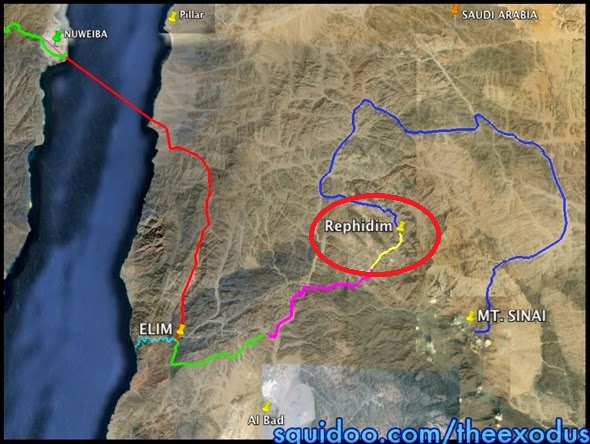
I took pictures of the satellite view map site and zoomed in the area. Sorry for the quality, for I took it from a cheapish camera. These slides will lead you to the location of the rock at Rephidim.
Starting with the wide area
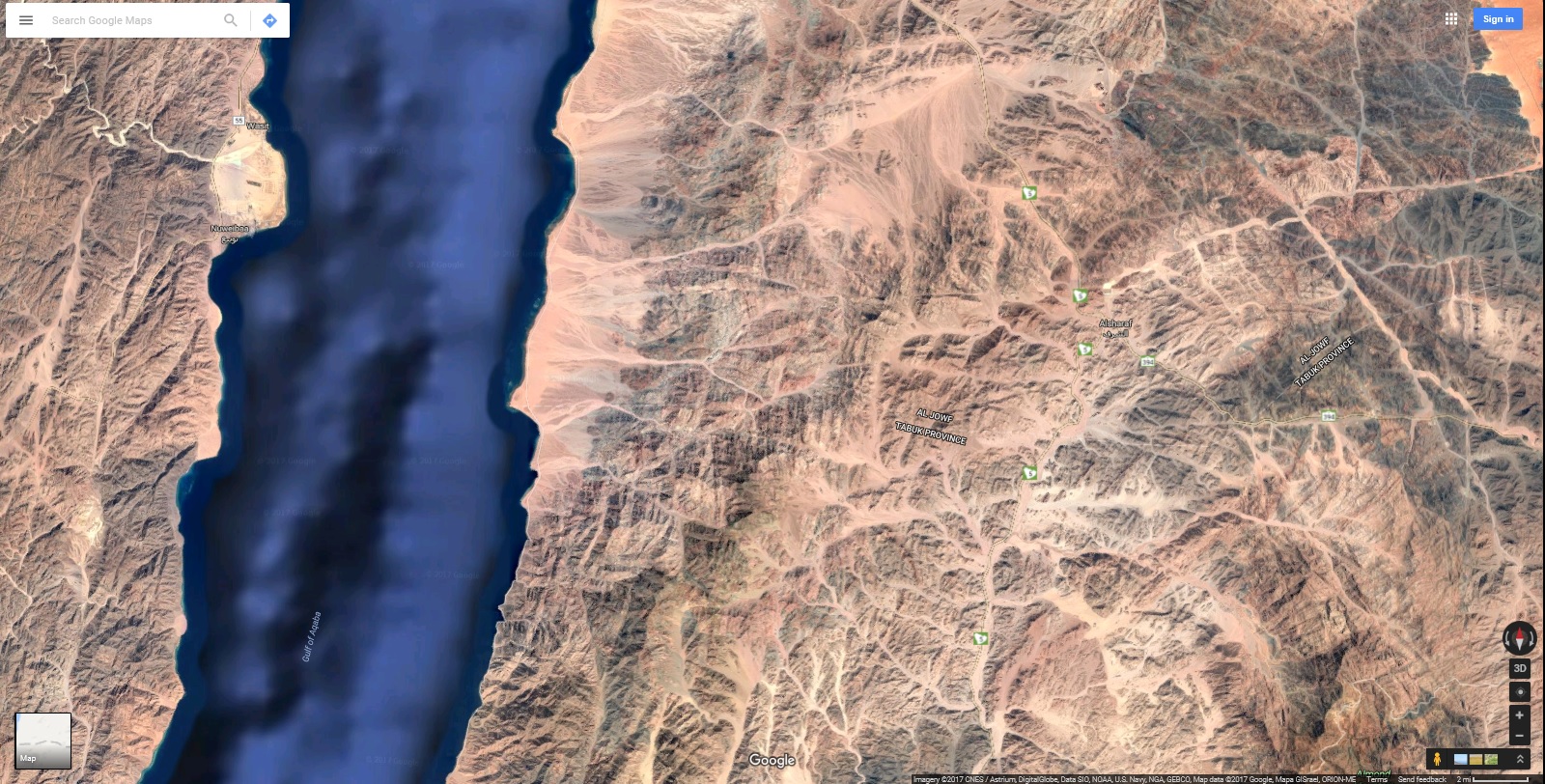
This is the area we are focusing which is an area of Rephidim
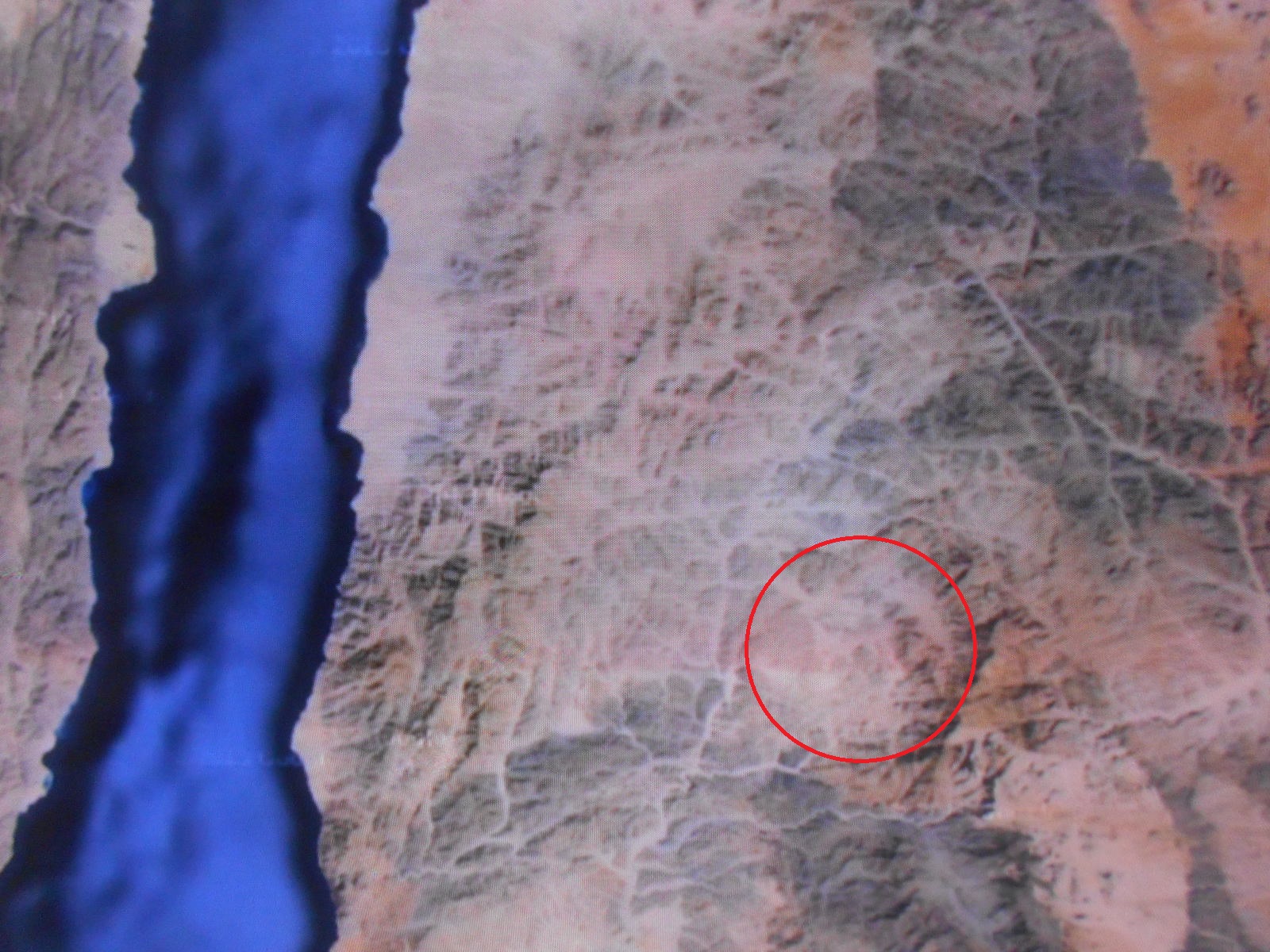
These are a series of satelite images zooming in to the location which is the area in Rephidim, which will take it to a location known as the split rock
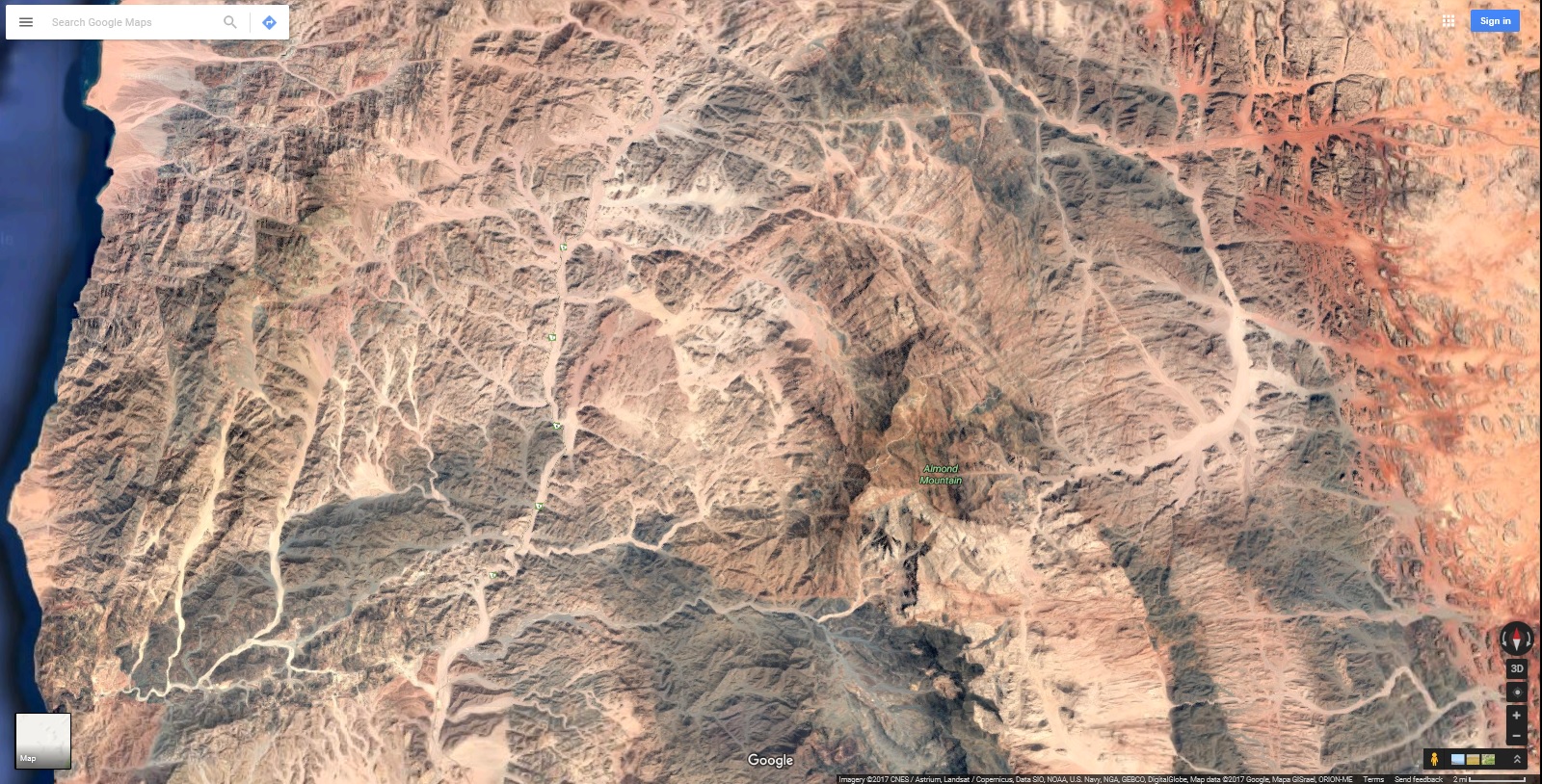
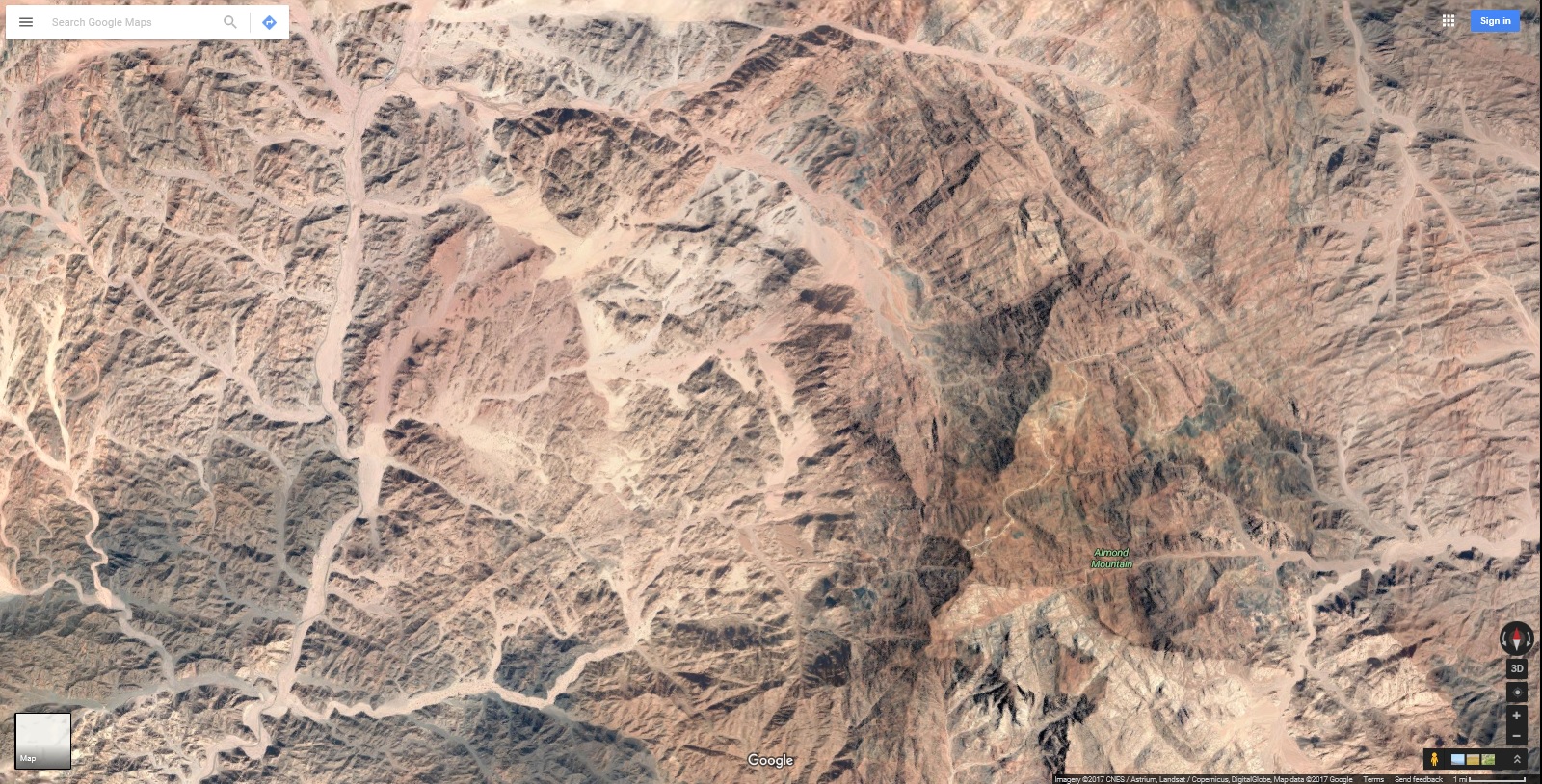

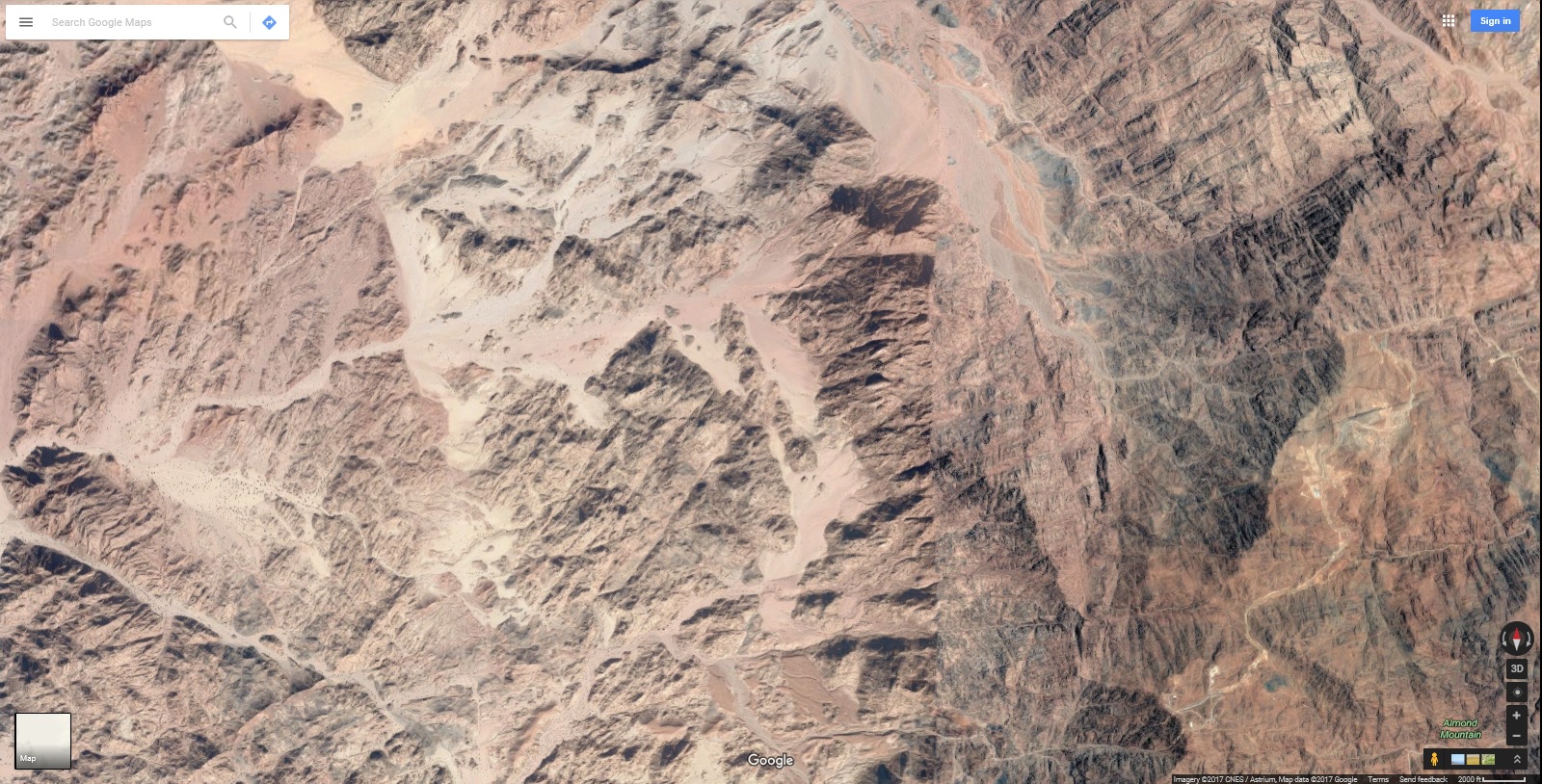
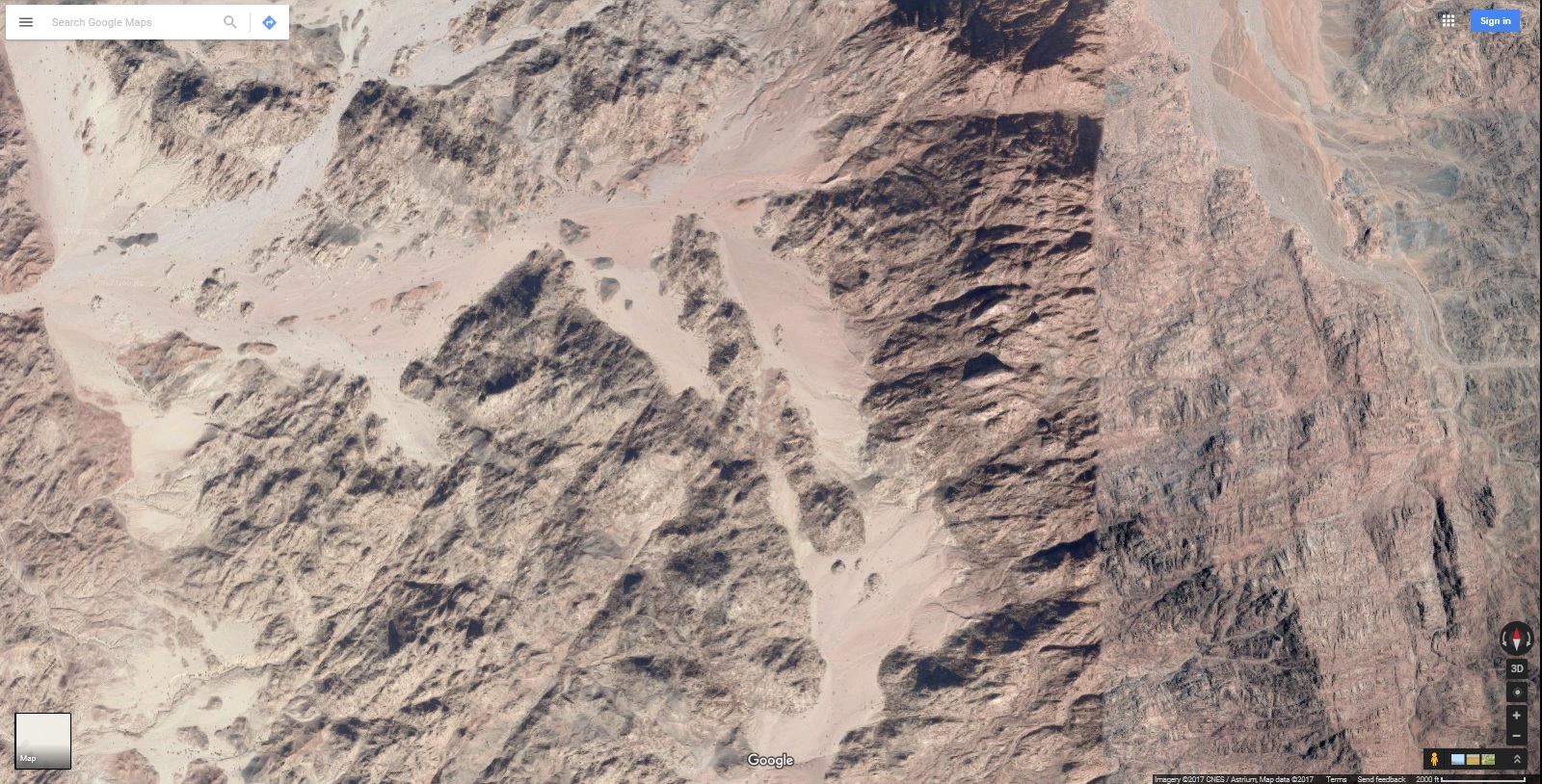
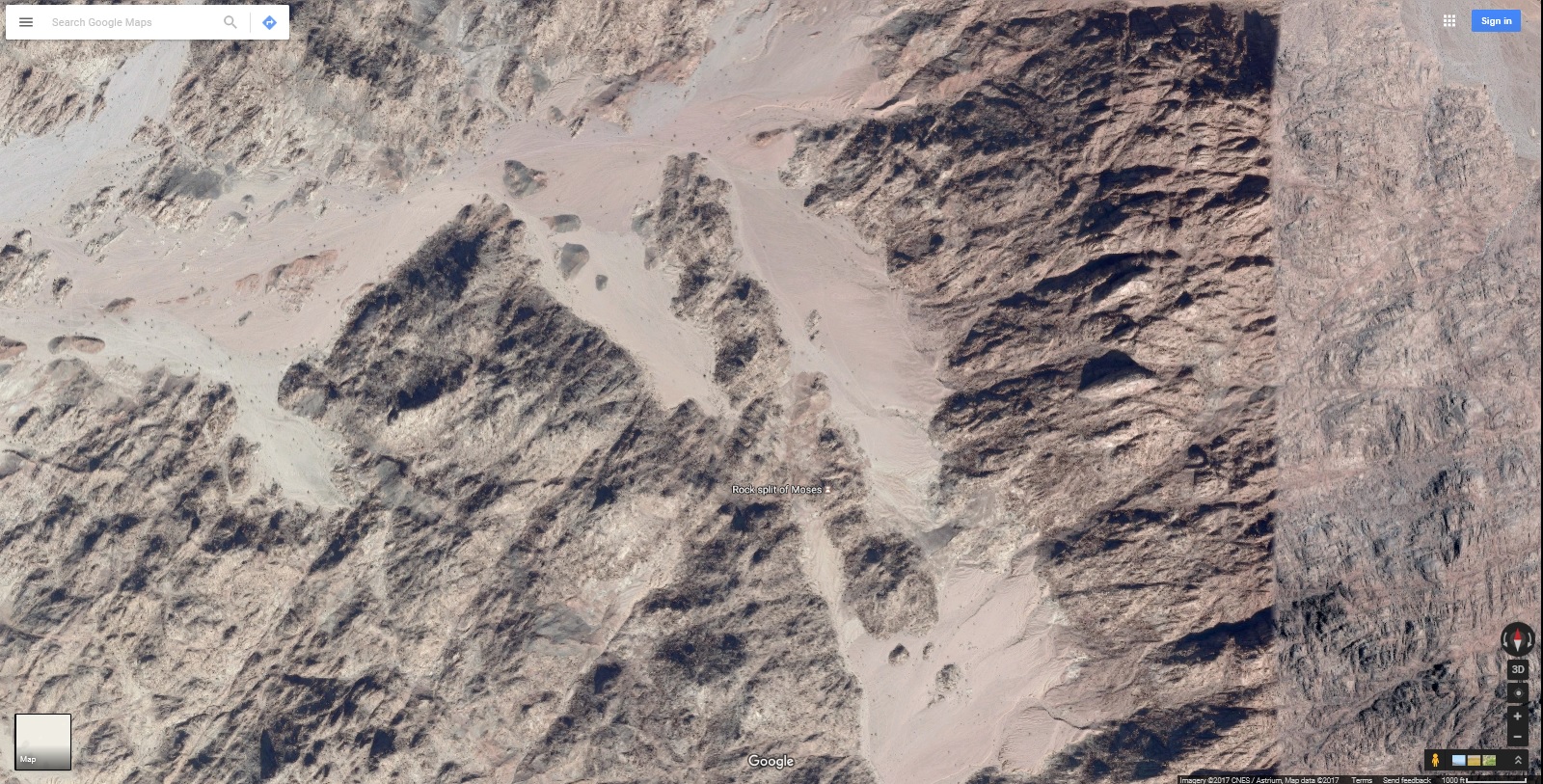
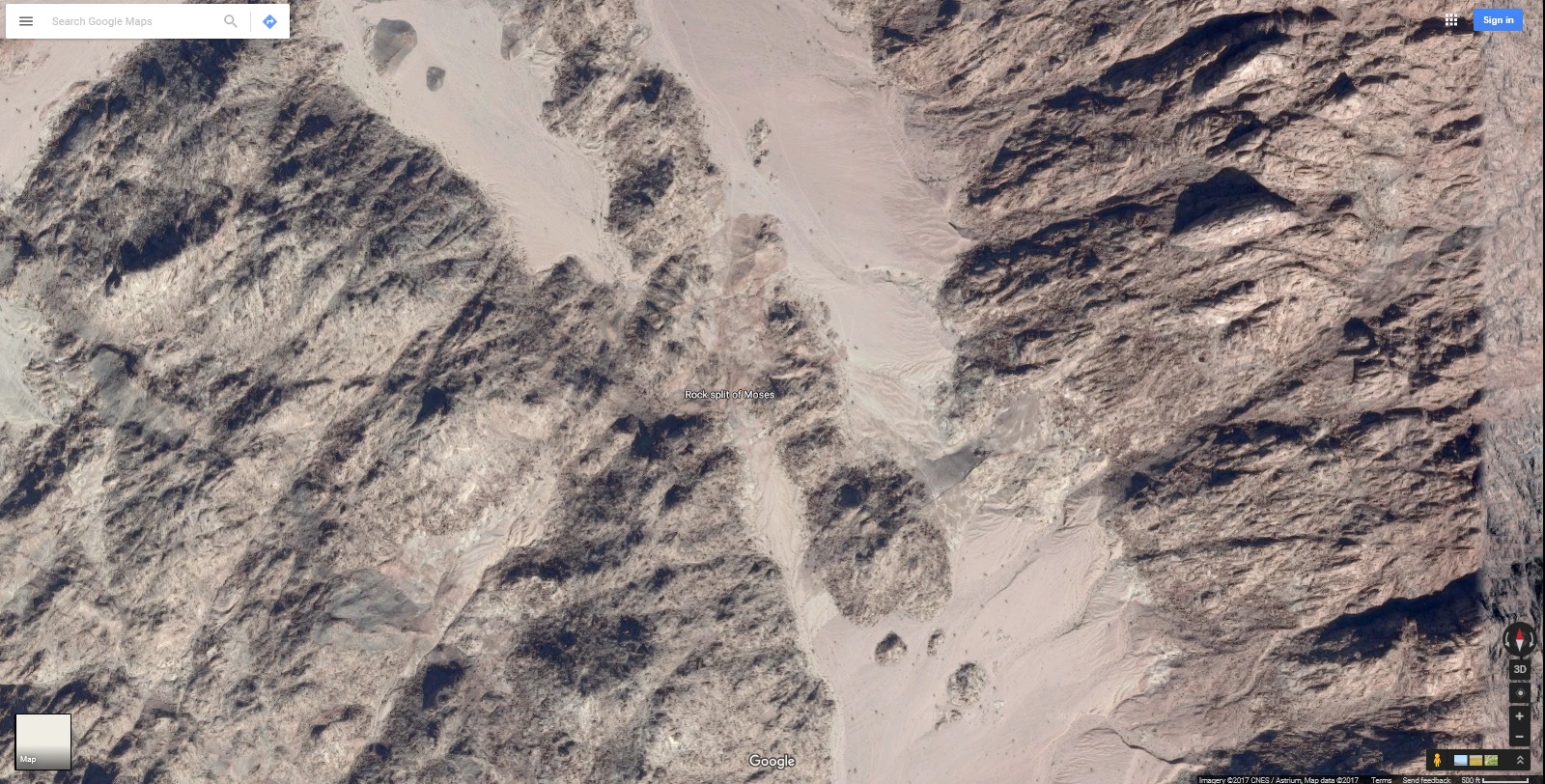
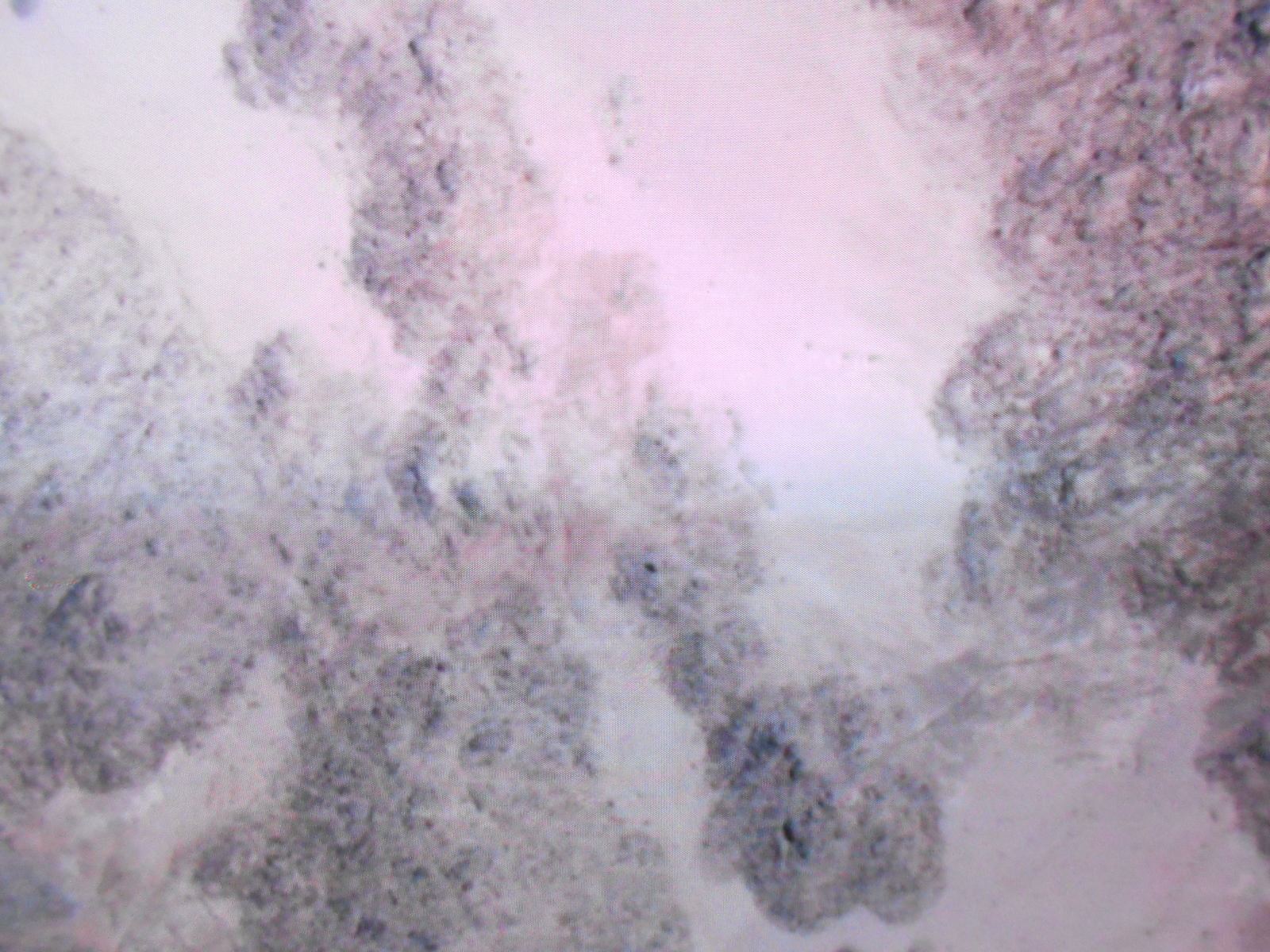
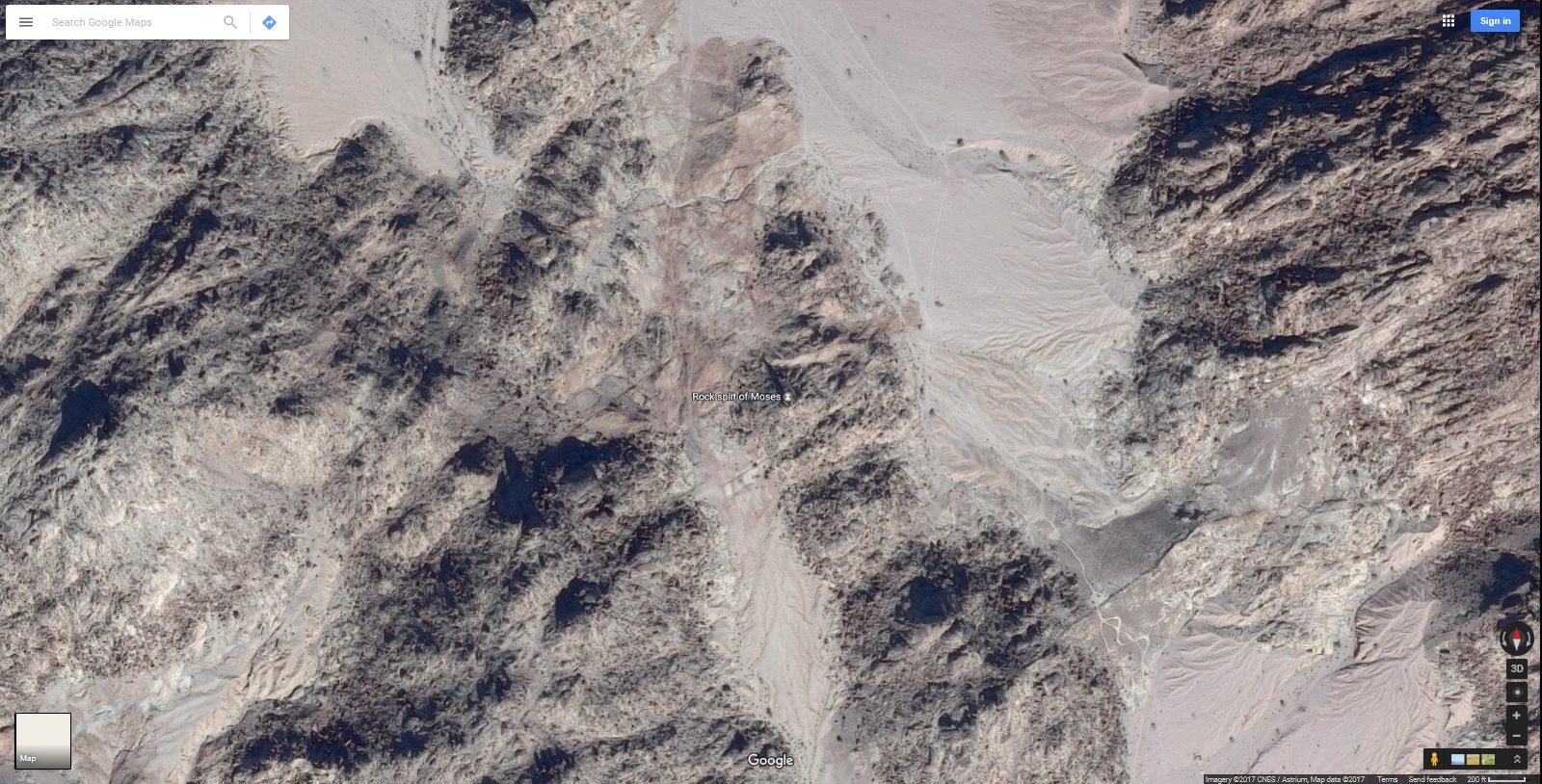
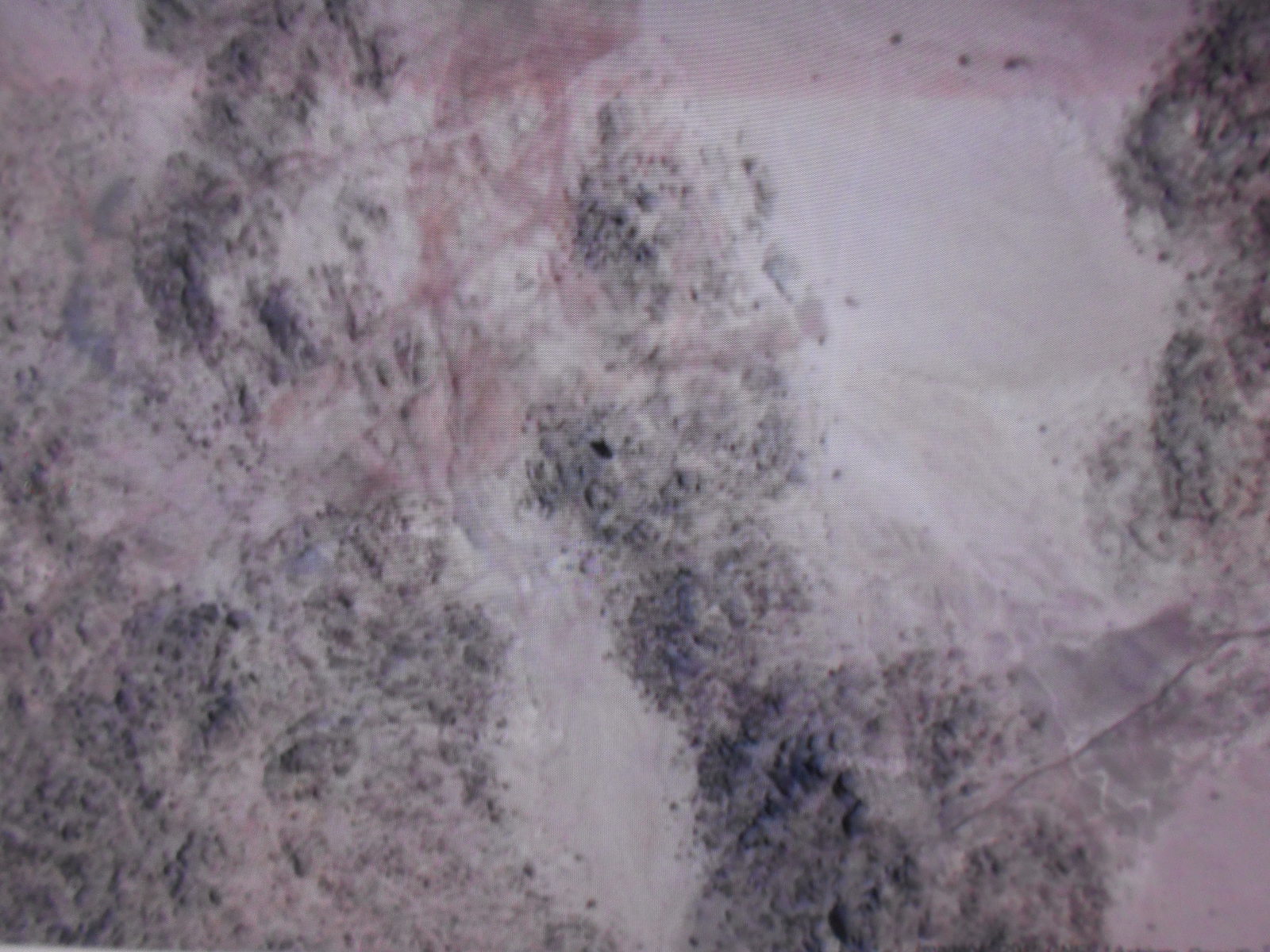
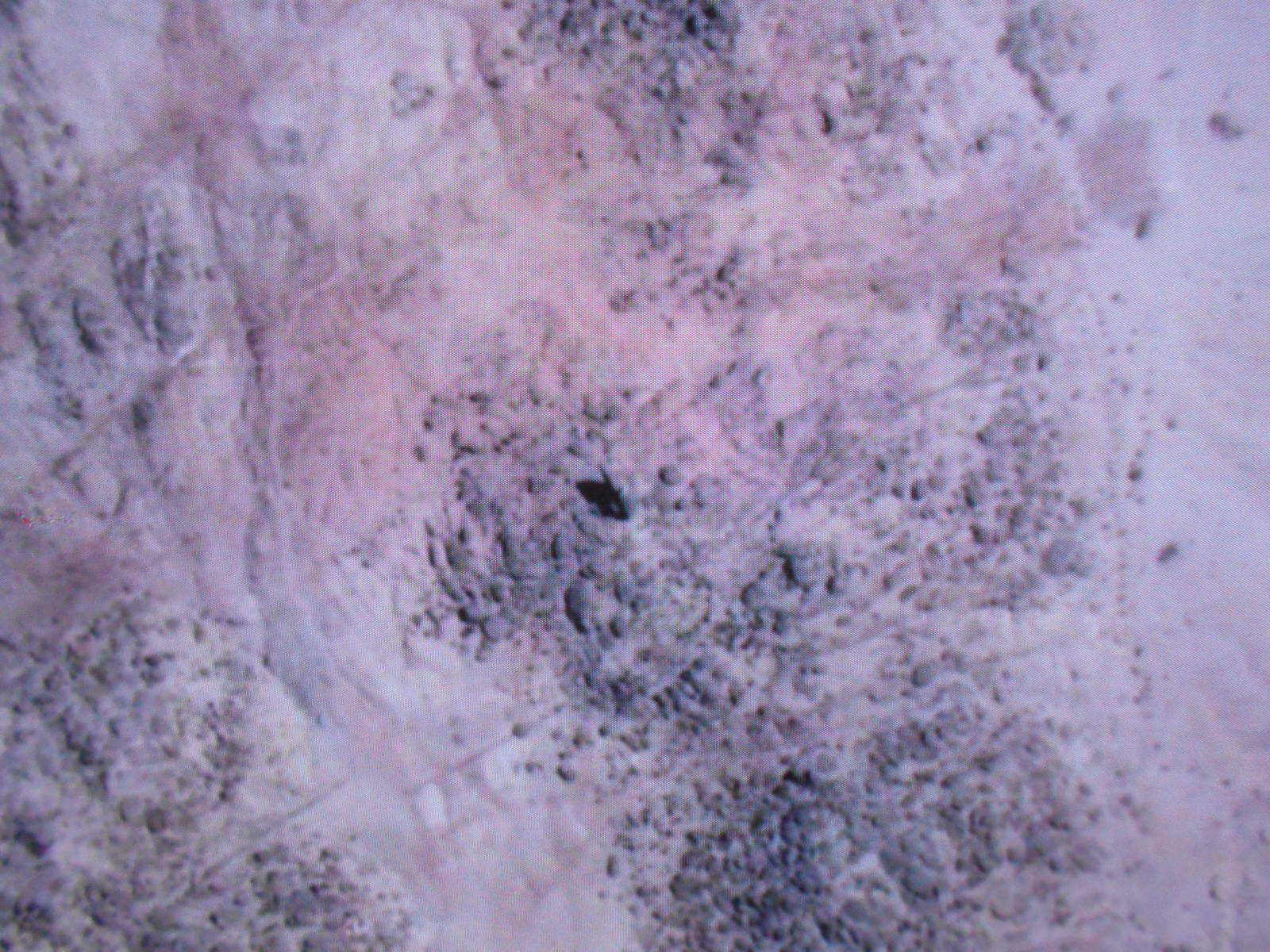
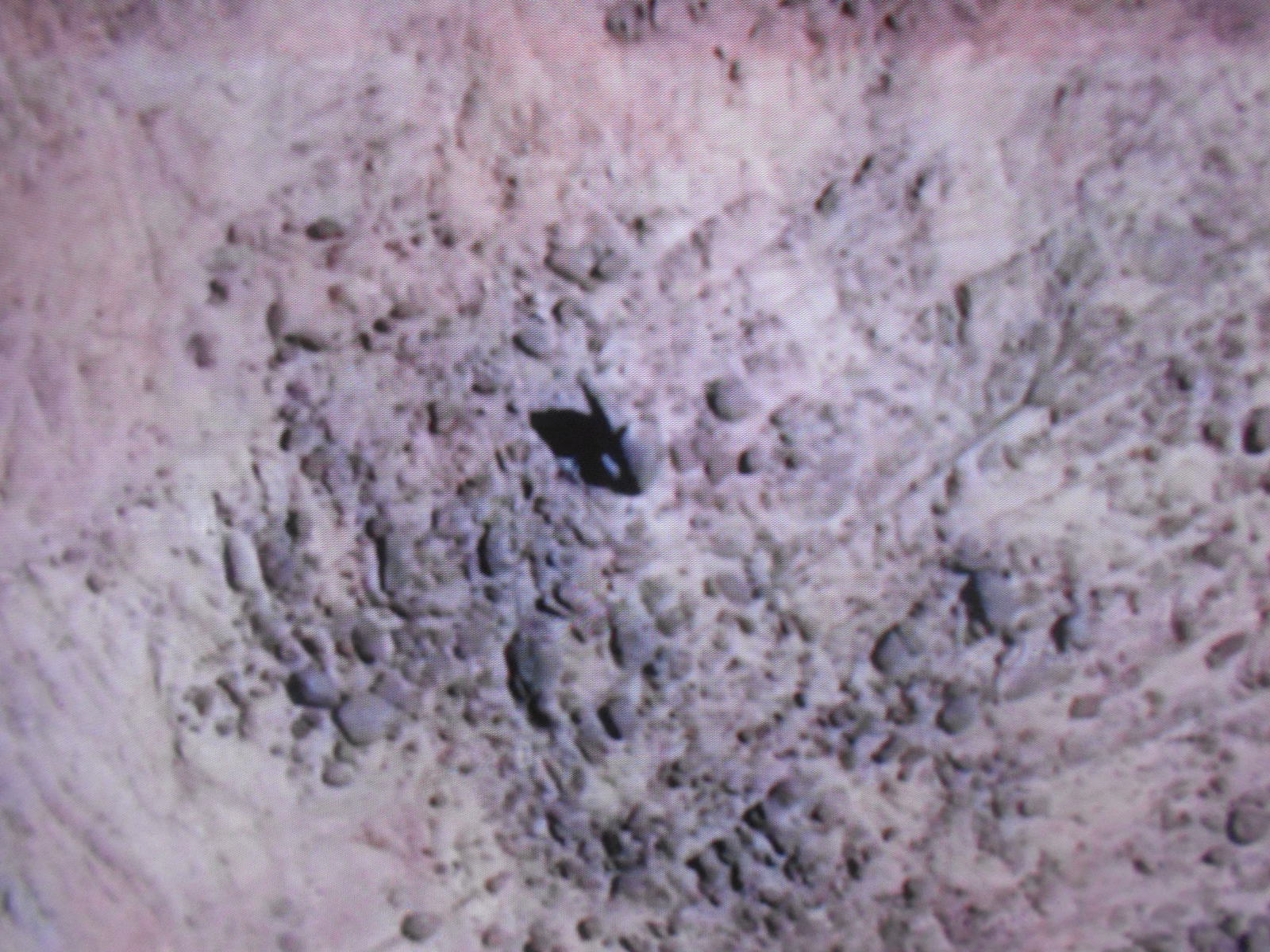
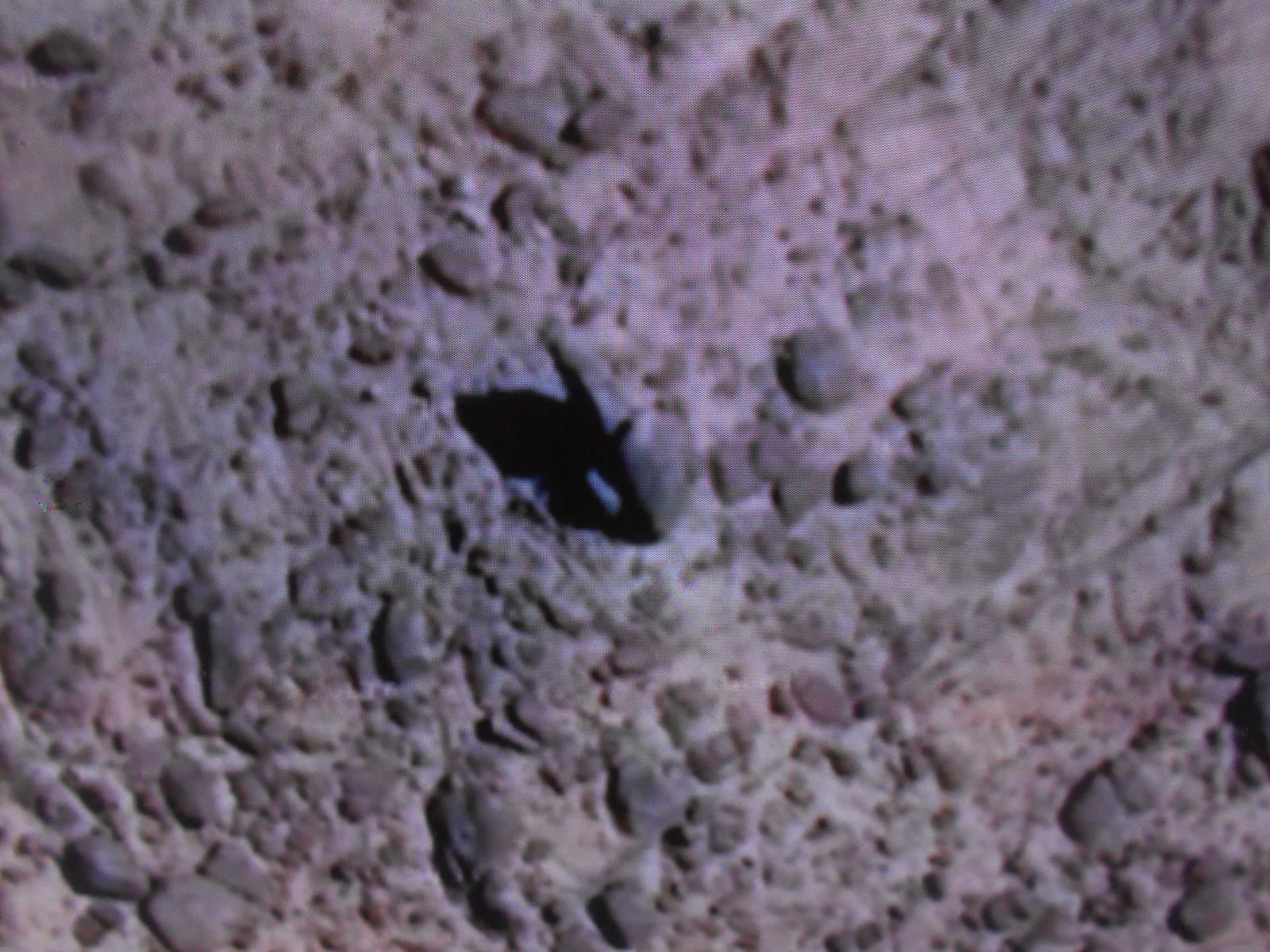
These are the images of the street view of the split rock located in Horeb in Rephidim. Compare the size of the rock to the man om the picture below. This was no 'one step up and you're there'.
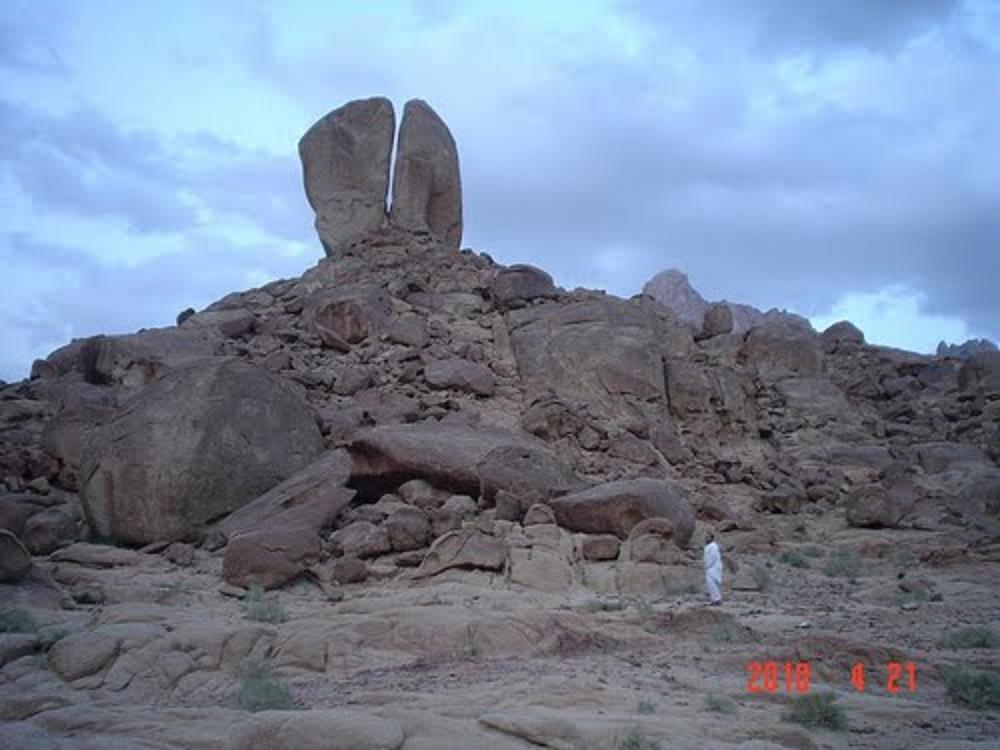
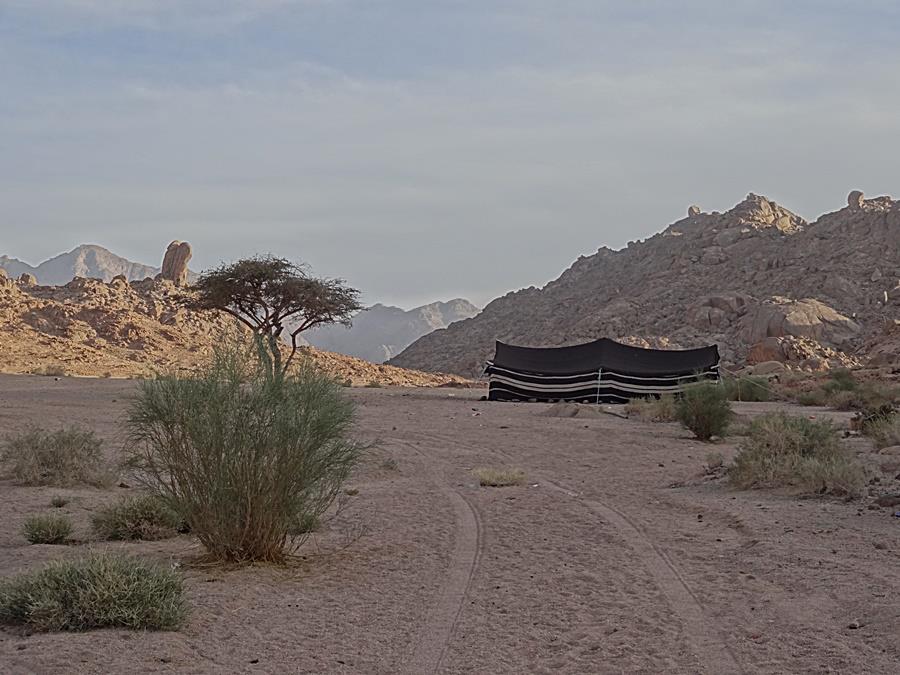
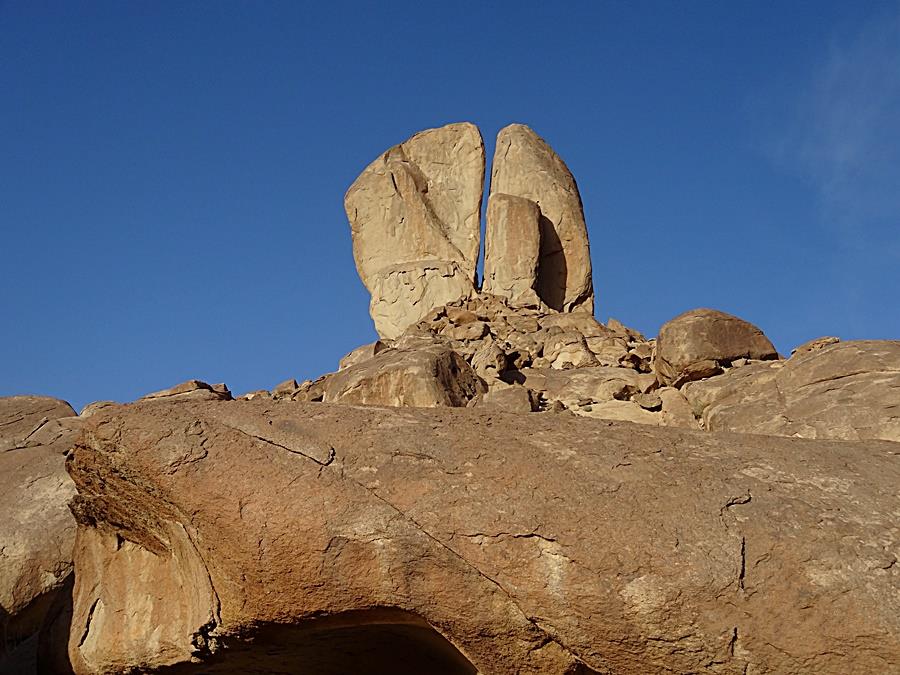
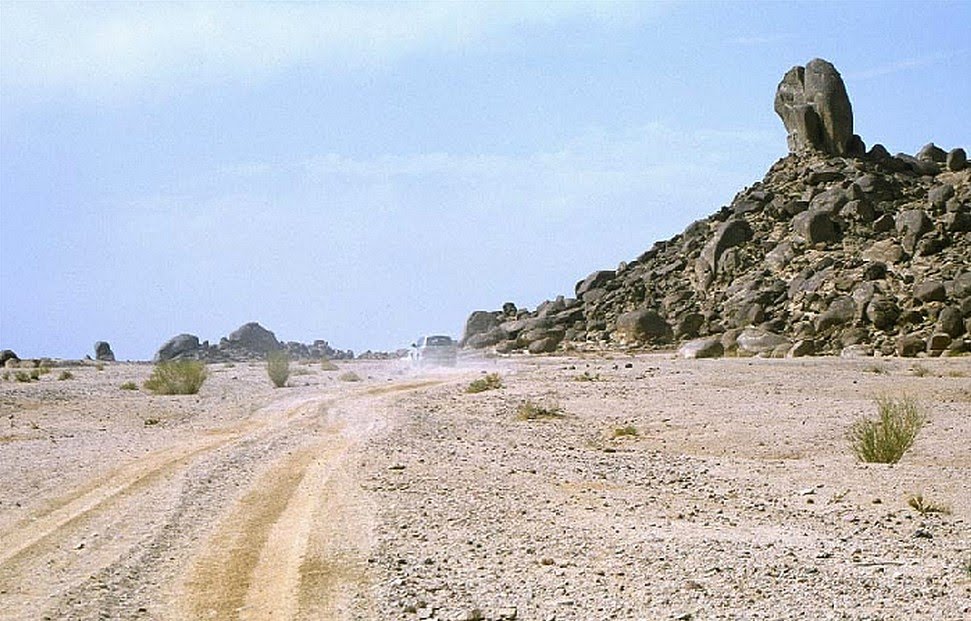
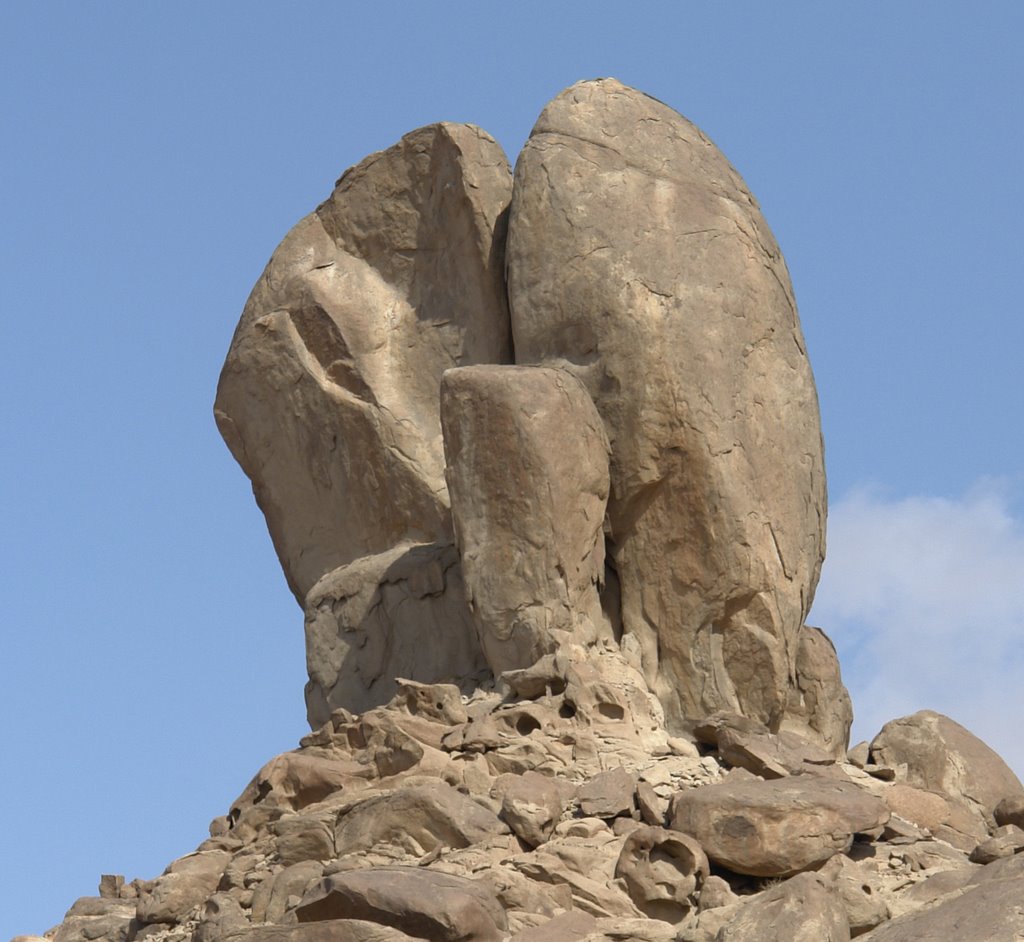
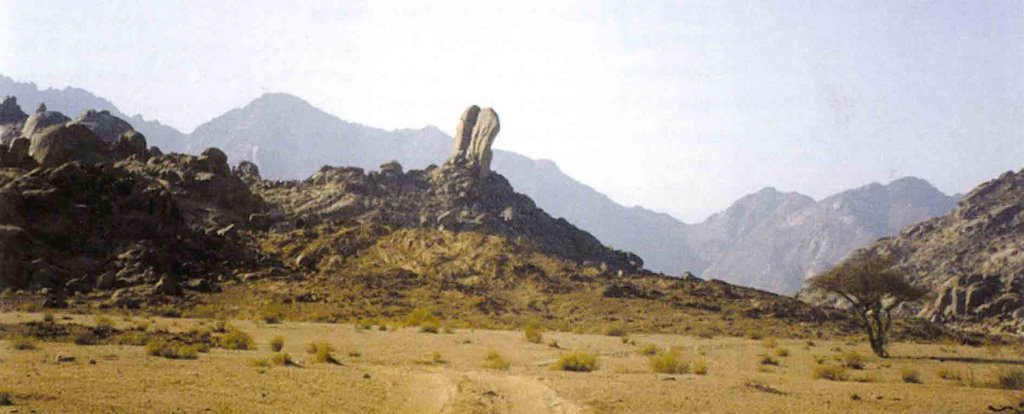
This is an artist's conception of what the water gushing might have looked like
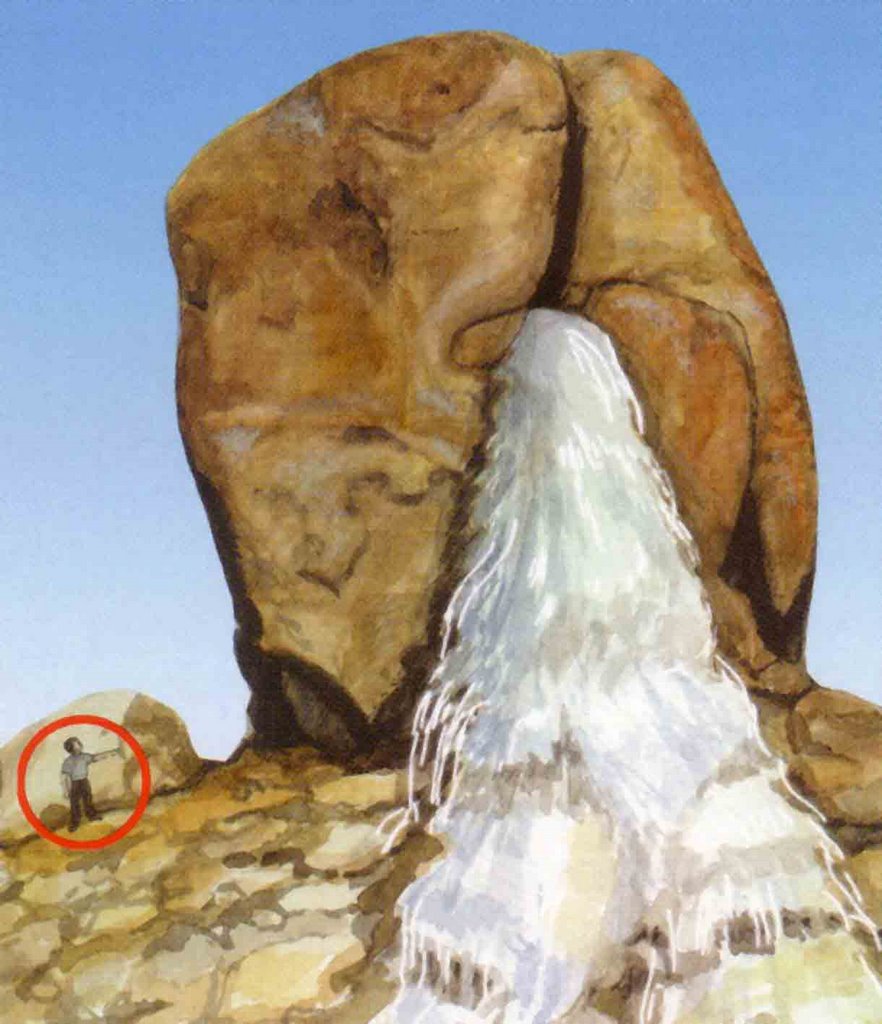
This is one of Ron Wyatt's members standing in front of rock close up. It gives one an awe of the massive act hwhy did for the Israelites
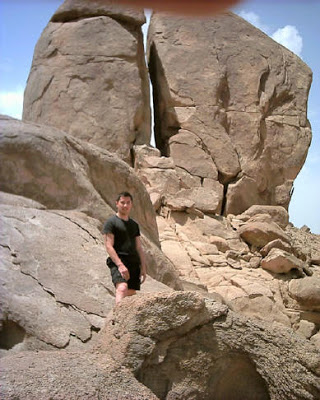
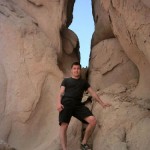
This is another comparison image of a human to the Split Rock
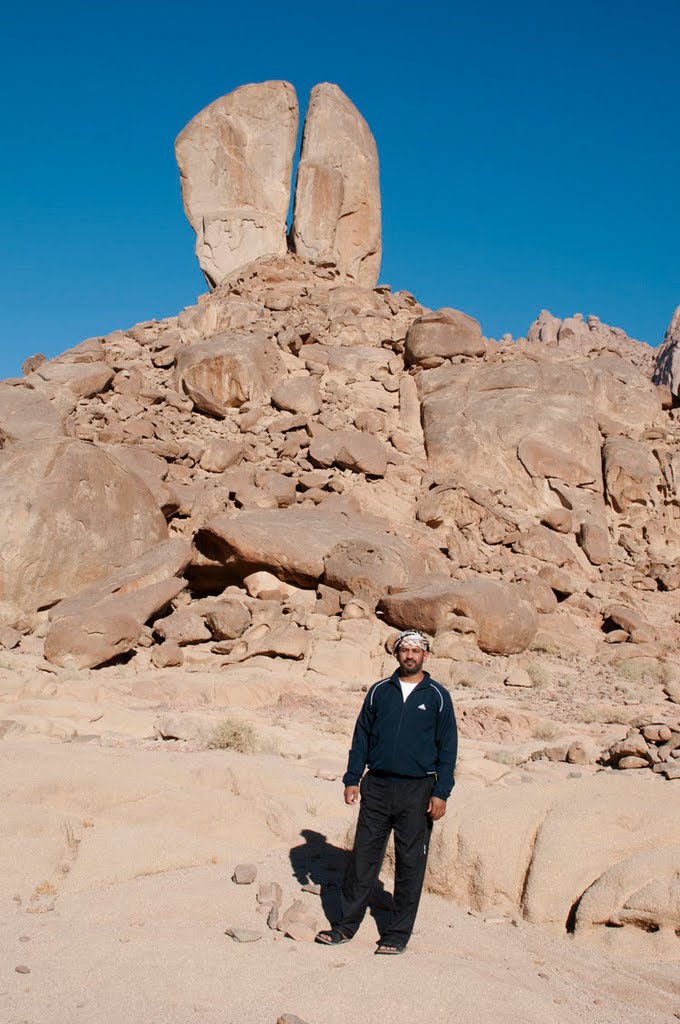
How awesome are you hwhy!
Ending this week's Torah portion passage, it is my humble but very strong opinion that the split rock event took place on Shavuoth. The water is the symbol of the Ruakh HaKodesh (the Holy Spirit), but it also repesents fire. Also, if one looks at the shape of the Split Rock it looks like a "cloven foot".
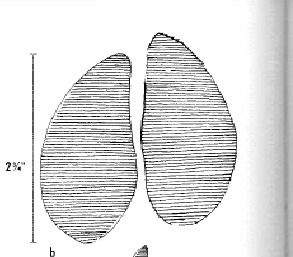
Compare the Split Rock and the deer footprint together

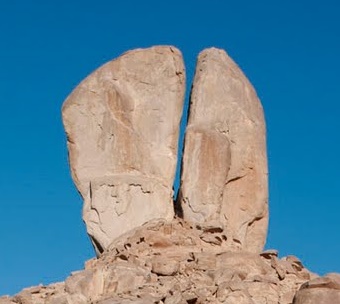
This can also be compared to the Ruakh HaKodesh (the Holy Spirit) that came down on the disciples as fiery "cloven" tongues, which is noted in the book of the Acts
Acts 2:1 And when the day of Pentecost [a.k.a. Shavuoth] was fully come, they were all with one accord in one place. 2 And suddenly there came a sound from the heavens as of a rushing mighty wind, and it filled all of the house where they were sitting. 3 And there appeared unto them cloven tongues like as of fire, and it sat upon each of them. 4 And they were all filled with the Holy Spirit, and began to speak with other tongues, as the Spirit gave them utterance.
Based on the Israelites' time line on their journey, and the comparison of the shape of the Split Rock to a deer's footprint, it was most likely on Shavuoth that this occurred.
!!!!!hwhy Kl dbk
Verses eight and nine
8 And Amalek came, and warred (fought) with Israel in Rephidim. 9 And Moses said to Joshua, Choose for us men, and go out warring (fighting) against the Amalek: Tomorrow I will stand upon the head of the little hill, and the staff (rod, branch) of The Elohim will be in my hand. 10 And Joshua did as the which Moses said to him to war (fight) against the Amalek: and Moses, Aaron, and Hur, they ascended at the head of the little hill. 11 And was, as the which Moses raised his hand, and Israel prevailed: and as the which shall rest his hand, and Amalek prevailed. 12 And the hands of Moses became heavy; and they took a stone, and they put under him, and sat upon her; And Aaron and Hur, they sustained his hands from this one, and from this one; And his hands, they were steady (faithful) until the going of the sun. 13 And Joshua overthrew (discomfited) ta-Amalek and ta-his people by the mouth of the sword.
14 And hwhy said to Moses, Write this of a Memorial in a scroll, and have set in the ears of Joshua: for blotting (wiping out), I will blot out (wipe out) ta-the remembrance of Amalek from under the Heavens. 15 And Moses built an altar, and called his name, hwhy Nissi: 16 And said, For the hand is upon the throne of Yah (hy); The battle (war) belongs to hwhy (To hwhy shall be battle (war)) against Amalek from generation at generation.
I do not have a location to which mountain in Rephidim Moses stood.
It was made known later in the Torah what the Amelekites did to cause a battle, which is noted in the Torah portion of Ki Theytsey, in the book of Deuteronomy
Deuteronomy 25:17 Remember ta what Amalek did to you on the way in your coming out from Egypt; 18 who met (encountered) you in the way, and tail attack (smite at hindermost) against you all the weak ones behind you, and you were weary (faint) and tired; and did not fear Elohim. 19 And shall be hwhy, your Elohim, in giving rest to you from all of your enemies from all around in the land which hwhy, your Elohim, is giving to you of an inheritance to possess her, you shall erase (blot out, abolish) ta-the remembrance of Amalek from under the Heavens; you shall not forget.
The Amelekites sneaked behind them in a cowardly and unmanly way and killed some Israelite people. The Amelekites and their spirit has been against Israel for about 3,500 years, via the Radical Muslim extremists, Hitler, the Pale, expulsion from England, etc. It is still happening today against Israel.
Verses ten through thirteen
10 And Joshua did as the which Moses said to him to war (fight) against the Amalek: and Moses, Aaron, and Hur, they ascended at the head of the little hill. 11 And was, as the which Moses raised his hand, and Israel prevailed: and as the which shall rest his hand, and Amalek prevailed. 12 And the hands of Moses became heavy; and they took a stone, and they put under him, and sat upon her; And Aaron and Hur, they sustained his hands from this one, and from this one; And his hands, they were steady (faithful) until the going of the sun. 13 And Joshua overthrew (discomfited) ta-Amalek and ta-his people by the mouth of the sword.
Moses showed that he was human. After a while, his arms became so tired that Aaron and Hur had to set him upon a stone, and they held up his arms to keep the battle in favor of the Israelites. Did hwhy say to Moses "You're cheating. You are not to have any help with your arms"? No. hwhy allowed the help.
Looking at the words:
HUR
The Hebrew word for Hur is "Khoor"- Khet, Vav, Resh (rwx). It is from Strong's Concordance number 2354, and its definition
The same as H2353 or H2352; Chur, the name of four Israelites and one Midianite: - Hur.
from 2353 "khoor" (rwx), and its definition
From H2357; white linen: - white.
from 2357 "kharar" (rrx), and its definition
A primitive root; to blanch (as with shame): - wax pale.
Hur means "pale". Hur was most likely pale in appearance.
AARON
The Hebrew word for Aaron is "Ah-hah-rohn"- Aleph, Heh, Resh, Vav, Nun Sophit (Nwrha). It is from Strong's Concordance number 175, and its definition
Of uncertain derivation; Aharon, the brother of Moses: - Aaron.
It doesn't show a definition of his name, but researching, we find this Hebrew word "ah-rohn" (Nwra). It is from Strong's concordance number 727, and its definition
From H717 (in the sense of gathering); a box: - ark, chest, coffin.
from 717 "ah-rah" (hra), and its definition
A primitive root; to pluck: - gather, pluck.
Aaron means "ark".
I want to make note that Aaron's name in the Hebrew text, in this segment, the "Vav" is missing in his name (Nrha). Vav is the Paleo-Hebrew picture of a nail. So Aaron's name is missing the "nail", when he raises Moses' hand. Maybe it is, becaue he is not holding both of Moses' hands, because Hur is holding the other one. Just a speculation.
The stone that Moses sat on could be symbolic of Yeshua, the Stone, which is based in king David's notion, which is noted in the book of the Psalms
Psalm 118:22 The stone which the builders refused is become the head stone of the corner.
The apostle Peter noted this Psalm, which is noted in the book of the Acts
Acts 4:5 And it came to pass on the morrow, that their rulers, and Elders, and Scribes, 6 And Annas, the High Priest, and Caiaphas, and John, and Alexander, and as many as were of the kindred of the High Priest, were gathered together at Jerusalem. 7 And when they had set them in the midst, they asked, By what Power, or by what Name, have ye done this? 8 Then Peter, filled with the Holy Spirit, said unto them, Ye rulers of the People, and Elders of Israel, 9 If we this day be examined of the good deed done to the impotent man, by what means he is made whole; 10 Be it known unto you all, and to all the People of Israel, that by the name of Yeshua Messiah of Nazareth, whom ye crucified, whom hwhy raised from the dead, even by him doth this man stand here before you whole. 11 This is the Stone which was set at nought of you builders, which is become the Head of the Corner. 12 Neither is there salvation in any other: for there is none other name under the heavens given among men, whereby we must be saved.
Verses fourteen through sixteen
14 And hwhy said to Moses, Write this of a Memorial in a scroll, and have set in the ears of Joshua: for blotting (wiping out), I will blot out (wipe out) ta-the remembrance of Amalek from under the Heavens. 15 And Moses built an altar, and called his name, hwhy Nissi: 16 And said, For the hand is upon the throne of Yah (hy); The battle (war) belongs to hwhy (To hwhy shall be battle (war)) against Amalek from generation at generation.
It was HaSatan that was the hand who dared to touch the Throne of hwhy, and His People, and HaSatan is still doing this today. This is what the the prophet Isaiah noted, which is noted in his book
Isaiah 14:12 How art thou fallen from the heavens, Heyleyl, son of the morning! How art thou cut down to the ground, which didst weaken the nations! 13 For thou hast said in thine heart, I will ascend into the heavens, I will exalt my throne above the stars of El: I will sit also upon the Mount of the Congregation, in the sides of the north: 14 I will ascend above the heights of the clouds; I will be like the Most High.
Heyleyl, commonly named as Lucifer, wants to get the throne and has been using Amalek to destroy the Israelites in the wilderness. That is why hwhy said in many words that He is at war with Amalek for generations, and hwhy has been right. The Amelekites and their spirit has been against Israel for 3,500 years. Multiple times in the book of Judges; During King Saul's time, he was to deal with Amalek, via Agag, which the prophet Samuel fulfilled; Hadassah, also known as Esther, had to deal with Haman, a descendant of Amalek, who wanted to destroy all the Jews of the Medio-Persian empire; The Maccabees had to deal with Antiochus, probably an Amelekite himself; Adolph Hitler was probably an Amalekite himself, since he was a descendant who destroyed six million Jews; Today, we are dealing with the Muslims, who are most likely descendants of Amalek. In the end times Yeshua will fight against the spirit of Amelek and will triumph over him.
!!!hy wllh
!!!hwhy Kl bdk
By the way, Heyleyl (llyh) is where we get our modern English word "Hell", which is HaSatan's residence named after him.
FURTHER TEACHING
You can read my information titled "Passover/Feast of Unleavened Bread" and my teaching titled "The Exodus Story", by clicking on the links below to get to the webpage.
PASSOVER/FEAST OF UNLEAVENED BREAD
THE EXODUS STORY
Ending this Torah portion with this cartoon
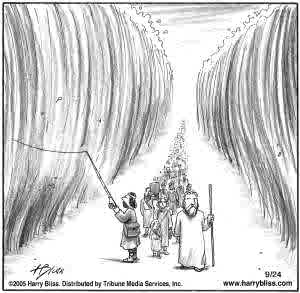
Next week, onto Mount Sinai
That ends this week's Torah portion commentary.
Any questions or comments can be written to
the.aleph-tav.project@msn.com
SHABBATH SHALOM

_______________________________________________________________________________________________________________________________________________
_______________________________________________________________________________________________________________________________________________
Copyright 2014 The Aleph-Tav Project - NVU's Website Design Software by The Premier Group